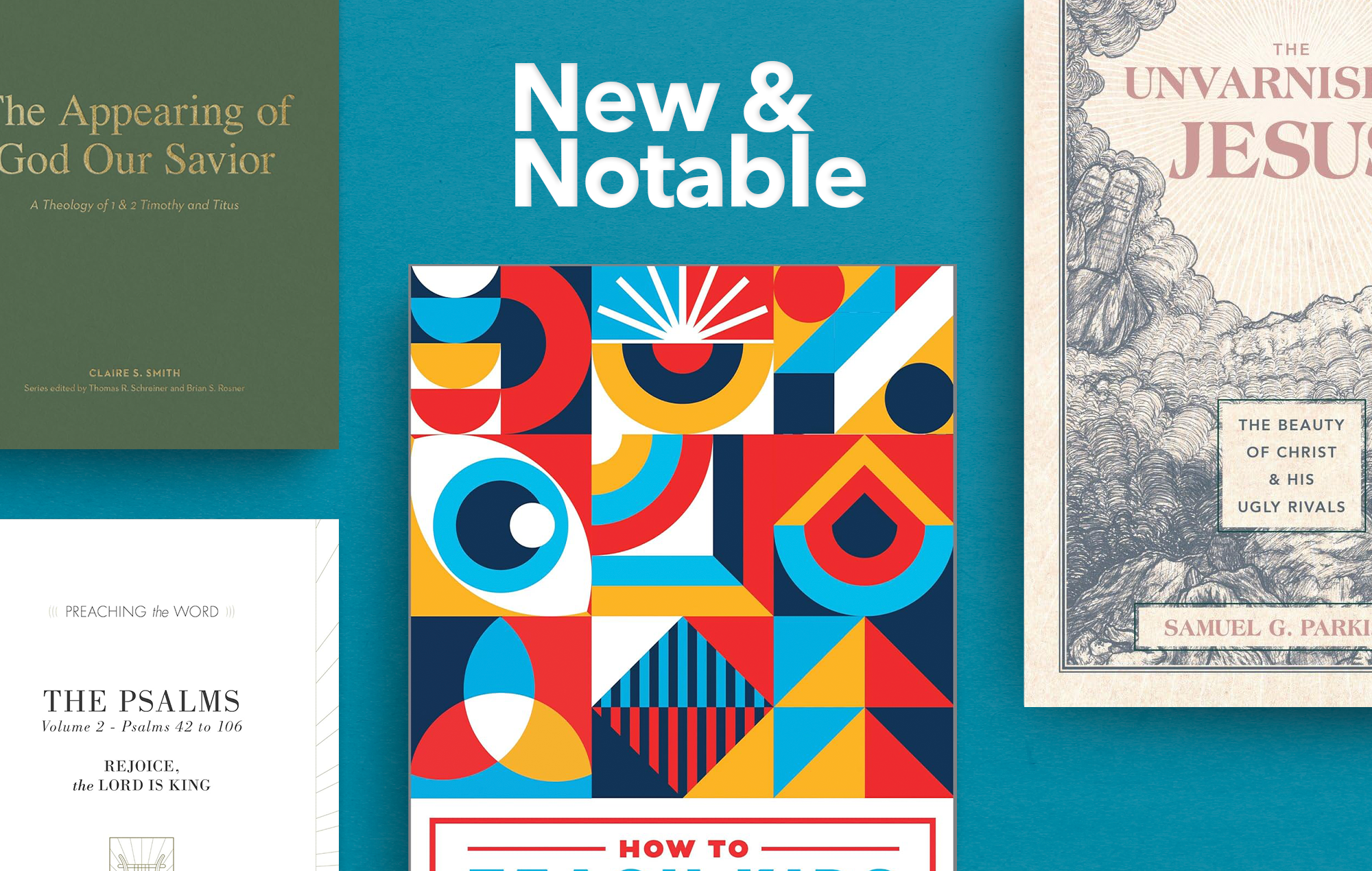 As you know, I like to do my best to sort through the new Christian books that are released each month to see what stands out as being not only new, but also particularly notable. I received quite a number of books in January and narrowed the list down to the ones below. I have included the editorial description for each. I hope there’s something here that catches your eye!]]>
As you know, I like to do my best to sort through the new Christian books that are released each month to see what stands out as being not only new, but also particularly notable. I received quite a number of books in January and narrowed the list down to the ones below. I have included the editorial description for each. I hope there’s something here that catches your eye!]]>
As you know, I like to do my best to sort through the new Christian books that are released each month to see what stands out as being not only new, but also particularly notable. I received quite a number of books in January and narrowed the list down to the ones below. I have included the editorial description for each. I hope there’s something here that catches your eye!
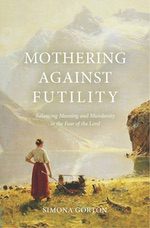
Mothering Against Futility: Balancing Meaning and Mundanity in the Fear of the Lord by Simona Gorton. “Simona Gorton calls women to embrace the God–glorifying tension between the seemingly meaningless work and the weighty responsibility of motherhood. We know the gospel impacts the repetitive, mundane work so inherent in homemaking and mothering, but how does that knowledge work itself out in the fabric of late nights and spilled oatmeal? As mothers, we live in the tension between the seemingly meaningless ‘everyday’ of our callings and the magnificent realities of the gospel and what God promises to do through us as mothers as we raise up the next generation to His glory. This book was written to showcase how God uniquely uses the ‘vanity’ inherent in the work of motherhood to display the beauties of the gospel in and through us as we fix our eyes on its truth.” (Buy it at Amazon)
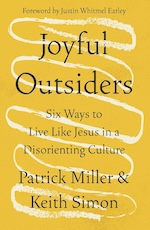
Joyful Outsiders: Six Ways to Live Like Jesus in a Disorienting Culture by Patrick Miller & Keith Simon. “You probably feel more like an outsider in our culture today than you did ten years ago. If that’s the case, you’re not alone. The question is, what kind of outsider will you become? Will you become a combative outsider and rage against your enemies? Will you become a conformist outsider and mirror the world around you? Will you become a conflict-averse outsider and avoid confrontation at all costs? Jesus has so much for you. He’s called you to be a joyful outsider like him. He was crucified as an outcast outside the city. Now he welcomes you to join him; to die to yourself and discover that sacrificial love has the power to change the world. In Joyful Outsiders, pastors Patrick Miller and Keith Simon will train you how to be a joyful outsider by laying out six ways to navigate a confusing culture at home, at work, and beyond. They draw on the examples of biblical characters to introduce six types of joyful outsiders: the artist, the protestor, the builder, the advisor, the ambassador, and the trainer.” (Buy it at Amazon)
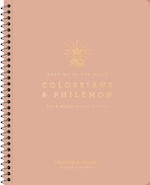
Meet Me in the Bible series by Colleen Searcy. “Meet Me in the Bible” is a series of 8-week Bible studies by Colleen Searcy. The series is launching with 2 volumes now and 2 more becoming available in May. The initial volumes cover Colossians & Philemon and The Story of Abraham. Every volume in the series offers: a simple 5-step framework for studying any book of the Bible, individually or in a group; a bookmark, ample space for note-taking, discussion questions, and helpful appendixes for further study; an inductive approach to studying Scripture; a unique combination of Scripture Journal and Bible Reading Guide; and spiral-bound pages that lie flat to make reading and writing more comfortable. (Buy them at Amazon)
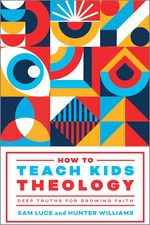
How to Teach Kids Theology: Deep Truths for Growing Faith by Sam Luce & Hunter Williams. “What comes to mind when you think about teaching theological truths to children? Glazed eyes? Over-their-head discussions? Theology doesn’t have to be ‘too deep for kids.’ For kids to stand firm in a culture that suppresses the truth of Christianity, we need to give them a grand view of God that overwhelms their hearts and fills them with wonder. A child’s faith is only as strong as the God they believe in. For their faith to be great, they need to learn about their great God. In each chapter, the authors diagnose problems that hinder leaders from teaching kids theology, explain principles to combat these problems, and suggest practices for applying these principles to your ministry.” (Buy it at Amazon or Westminster Books)
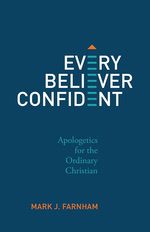
Every Believer Confident: Apologetics for the Ordinary Christian by Mark Farnham. “Do you want to defend your faith but aren’t sure where to begin? Mark Farnham’s accessible guidebook simplifies apologetics and empowers Christians to effectively present the gospel in all its glory and rationality. This new edition includes practice case studies, chapter review questions, and a new chapter on engaging in gospel conversations over the long term.” Fred Zaspel says of it: “Marvelously clear, practical, and emboldening. Excellent guidance for anyone who seeks to be more faithful and effective in gospel advance.” (Buy it at Amazon or Westminster Books)
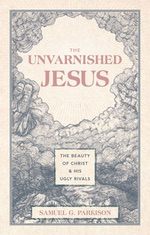
The Unvarnished Jesus: The Beauty of Christ and His Ugly Rivals by Samuel G. Parkison. “Samuel G. Parkison makes a startling claim: Jesus is the most beautiful man to ever exist. His defence is theoretical and experiential: he knows him to be ultimate beauty and he has experienced him to be so. Deconstructing cultural notions that beauty is subjective or sentimental, Parkison constructs an impressive picture of God’s breathtaking beauty. On this firm foundation, the only building to rise is one that testifies to Jesus, the God–man, as the most beautiful man that ever lived.” (Buy it at Amazon)
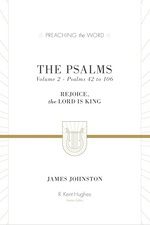
The Psalms: Rejoice, the Lord Is King, Volume 2, Psalms 42 to 106 by James A. Johnston (Preaching the Word Commentary). This is now the second volume of a 3-volume set covering all 150 psalms. “The Psalms is one of the most widely loved books of the Bible. A source of instruction for our prayers, inspiration for our songs, and consolation for our tears, these biblical poems resound with the whole spectrum of human emotion and teach us to hope in God each and every day. In the second volume of a 3-part commentary on the Psalms, pastor James Johnston walks readers through chapters 42–106, offering exegetical and pastoral insights along the way. Edited by R. Kent Hughes, the Preaching the Word expository series is an essential resource for anyone interested in studying, teaching, or preaching the Bible.” (Buy it at Amazon)
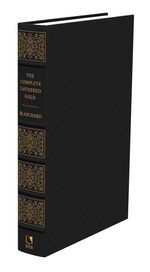
The Complete Gathered Gold: A Treasury of Quotations for Christians by John Blanchard. “Throughout his more than sixty years of ministry, John Blanchard, author of Ultimate Questions and Does God Believe in Atheists?, learned from hundreds of Christian men and women. The Complete Gathered Gold collects more than fifteen thousand of his favorite quotations on over six hundred subjects. Christians can find nuggets of wisdom on every topic, from ‘adoption’ to ‘zeal.’ The Complete Gathered Gold is sure to be a treasure trove for preachers, teachers, and everyday believers whenever they want to read a gem of truth.” (Buy it at Amazon or Westminster Books)
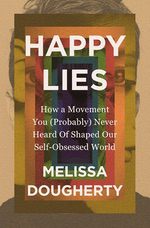
Happy Lies: How a Movement You (Probably) Never Heard Of Shaped Our Self-Obsessed World by Melissa Dougherty. “Have you ever wondered how we ended up in a world where personal feelings could become the authority for reality? Or why so many of us are on a relentless pursuit for happiness yet somehow feel more exhausted and sadder than ever? You’re not alone. Melissa deftly traces the roots of today’s social chaos back to a little-known (but very influential) 1800s philosophy known as New Thought. A former follower of its teachings, Melissa provides clarity and compassion mixed with a dash of loving snark as she exposes New Thought’s deceptions and its many concerning tendrils within the church and our ‘self-help’ culture. You’ll be shocked, grieved, and encouraged as you learn: How you can experience true freedom, hope, and peace instead of the world’s counterfeits; How an anti-God ideology so easily hijacked Christian-sounding ideas; Why thinking positively is entirely different from the unbiblical and burdensome ‘positive thought’ movement; How understanding the New Thought mindset can help us share our faith more effectively; and much more.” (Buy it at Amazon)
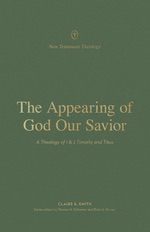
The Appearing of God Our Savior: A Theology of 1 and 2 Timothy and Titus by Claire Smith. “The letters of 1 and 2 Timothy and Titus were written by Paul to trusted coworkers toward the end of his apostolic ministry. As Paul’s delegates, they were to teach and defend the truth, model godly living, and ensure that godly church leadership was in place. But these letters are more than just a how-to guide for ministry. In this volume of the New Testament Theology series, Claire Smith explores the central themes and theology of each letter, which consistently focus on God’s eternal plan in Christ to save a people for himself. Emphasizing that we live between the two appearings of Christ Jesus in history, Smith encourages readers to live in this present time as God’s household (1 Timothy), how to endure suffering as believers (2 Timothy), and how to live in an unbelieving world (Titus).” (Buy it at Amazon)
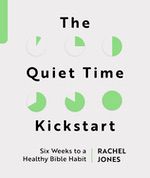
The Quiet Time Kickstart: Six Weeks to a Healthy Bible Habit by Rachel Jones. “Kickstart your quiet time and discover the joy of spending time with God in his word. Beginning with short, simple 5-minute devotions that are easy to make time for, this little guide will kickstart a daily Bible-reading routine. It’s ideal for anyone new to reading the Bible or anyone struggling to spend regular time in God’s word. The devotions gradually increase in length over the course of six weeks and offer focused guidance on understanding the Bible. So by the time you finish, you’ll have the skills and confidence you need to read and enjoy Scripture for yourself—and make your quiet time a habit for life.” (Buy it at Amazon or Westminster Books)

Our Daily Food: Or Portions for the Lord’s Household by James Smith. “James Smith was a prolific writer, and his daily readings and devotionals in particular were highly esteemed and hugely popular. ‘My object,’ said our author, ‘is to lead the mind from self–to Jesus; from sin—to salvation; from the troubles of life—to the comforts of the gospel. My aim is to humble the sinner—and exalt the Saviour; to strip the creature—and place the crown on the head of God’s free grace! I cannot ascribe too much to Jesus—or too little to man!’ Some daily devotionals are longer, and demand a fair amount of time. Some are briefer, and take a few moments to read over. These golden nuggets of truth will take only a moment to consider, but will give you matter for a day’s consideration and comfort.” (Buy it at Amazon)
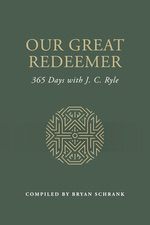
Our Great Redeemer: 365 Days with J. C. Ryle by Bryan Schrank (editor). This one actually released at the end of 2024 but I missed it until now. You couldn’t go wrong spending a year with Ryle! “J. C. Ryle knew that there was only one way to prepare for Christ’s return: to know Him as Our Great Redeemer. This compilation of 365 powerful readings from Ryle’s preaching and writing is rich with the grace, truth, and conviction that defined Jesus’s ministry. Spend this year meditating on the glory of Christ with one of the great evangelical leaders of the nineteenth century in this new devotional.” (Buy it at Amazon or Westminster Books)
]]> I’m quite certain you have heard of the New Age movement. Though its popularity seems to have crested and begun to wane some time ago, it continues to wield a good bit of influence. But I wonder if you’ve heard of another similarly-named but quite different movement called New Thought.]]>
I’m quite certain you have heard of the New Age movement. Though its popularity seems to have crested and begun to wane some time ago, it continues to wield a good bit of influence. But I wonder if you’ve heard of another similarly-named but quite different movement called New Thought.]]>
I’m quite certain you have heard of the New Age movement. Though its popularity seems to have crested and begun to wane some time ago, it continues to wield a good bit of influence. But I wonder if you’ve heard of another similarly-named but quite different movement called New Thought. Unlike New Age which originated within Eastern religions, New Thought originated within a Christian (or Christianesque, at least) context. This means it has a guise of Christianity and uses many of the same words and concepts. It can therefore disguise itself within churches and movements while maintaining a veneer of Christianity. It’s a clever deception.
New Thought is the subject of Melissa Dougherty’s new book Happy Lies: How a Movement You (Probably) Never Heard Of Shaped Our Self-Obsessed World. As you may surmise from the title, Dougherty believes New Thought is not merely a movement that infiltrates and perverts Christian contexts, but also one that has helped shape the Western world. Have you ever wondered why objective truth has been diminished in favor of subjective feelings or why young people are told to relentlessly focus on positivity yet seem sadder than ever? Have you ever wondered why some churches preach messages of personal empowerment in favor of biblical emphases like meekness and poverty of spirit? The answer—or partial answer, at least—is New Thought.
New Thought originated in the United States in the early nineteenth century. If you have heard of Phineas Quimby or Franz Mesmer you have heard of some of its early founders. If you’ve encountered the writings of Ralph Waldo Emerson or Napoleon Hill you’ve read the works of people who popularized it. By this point, New Thought largely existed outside of churches, but then certain forms of Charismatic expression embraced its teachings so that today you can find it syncretized with Christianity in prosperity gospel churches or in churches like Joel Osteen’s. Where Christians are told to visualize outcomes, make “I am” statements, or “name and claim,” New Thought is in the background. It is a pernicious foe.
In a well-paced and reader-friendly book, Dougherty goes to great lengths to explain New Thought and show where it makes its presence known both in the wider culture and the church. It has influenced the rise of relativism and new notions of identity. It lies behind certain forms of self-help and the Law of Attraction. And it makes its presence known in Word of Faith, progressive Christianity, and even (to lesser degree) the seeker-sensitive Church Growth Movement. She writes to explain New Thought so Christians can identify and combat it. Yet she also writes to persuade those who may be entangled in it, who think they are Christians but are actually denying the gospel by looking for salvation from within instead of without.
I appreciate the work Dougherty has done in Happy Lies to uncover, highlight, and counter a dangerous movement. I don’t think she has fully convinced me that New Thought is quite as prevalent as she may suggest and, when it comes to New Thought’s influence, I think there may be some distinction to be made between correlation and causation. While I would be surprised to learn that the average reader of this blog, and therefore of this review, has been substantially influenced by New Thought, I would not be surprised to learn that they know and love someone who has been. In that way, I believe this book may prove both influential and beneficial. For that reason and others, I am glad to recommend it.
]]> Do I have a library made up of thousands of books or do I have a library made up of a couple dozen? I suppose it depends on what you count as a book. It has been many years—at least 15, I think—since I decided to go all-in with ebooks, a decision I have stuck with. Today I’ve got 20 or 30 printed books in my collection and many thousands in electronic formats.]]>
Do I have a library made up of thousands of books or do I have a library made up of a couple dozen? I suppose it depends on what you count as a book. It has been many years—at least 15, I think—since I decided to go all-in with ebooks, a decision I have stuck with. Today I’ve got 20 or 30 printed books in my collection and many thousands in electronic formats.]]>
Do I have a library made up of thousands of books or do I have a library made up of a couple dozen? I suppose it depends on what you count as a book. It has been many years—at least 15, I think—since I decided to go all-in with ebooks, a decision I have stuck with. Today I’ve got 20 or 30 printed books in my collection and many thousands in electronic formats.
So far I have not had any significant regrets. I may have the occasional wistful thought about the feel or smell of a hardcover book, but they quickly dispel when I sit on a plane, take out my iPad, and have access to every book I own at 30,000 feet in the air. They dispel when I consider that I live in a small house and simply don’t have the space for a substantial library. And they dispel as well when I consider the price difference between a book printed on paper and a book that takes no physical form (not to mention the vast number of books I’ve been able to acquire for no more than a couple of dollars through daily Kindle deals and regular Logos sales and freebies).
My general strategy has been to collect commentaries and reference works in Logos format and other resources in Kindle format. Hence, if I am preparing a sermon, I am probably using Logos and if I am reading a book for pleasure or review, I am probably using my Kindle. Occasionally I’ll use both of them. Of course I wish there was a way to connect and integrate the two libraries, but unfortunately both depend upon proprietary formats. The highlights of my reading make their way quickly and smoothly into My System for Remembering and Re-Encountering What I Read.
When I first went all-in with ebooks, reading electronically was still quite novel. Amazon’s Kindle was a relatively new device and while Logos had a more substantial track record, it still seemed risky to forgo the security of a printed commentary for an electronic one. My most substantial concerns were censorship on Amazon’s part and bankruptcy on Logos’ since either could quickly make me regret my decision.
To this point, though, neither concern has come to fruition. While Amazon has had a couple of stumbles when it comes to censorship (most notably and ironically by removing Orwell’s 1984 from some people’s accounts in 2009), they have not stopped publishing books that counter society’s prevailing winds. It seems to me that we may have already passed through peak corporate Woke, which makes it unlikely that deeper censorship is on the immediate horizon. I take this to mean that the kind of books I want to collect are likely to remain in my library and likely to remain for sale on Amazon.
Meanwhile, Logos has remained steady and viable. They have recently changed their revenue model from purchase to subscription which, as much as many of us don’t love the idea of another monthly fee, should offer them greater financial stability while providing customers with more timely improvements and updates. They also continue to offer pretty much all of the commentaries and reference works that are meaningful to me, all nicely integrated into their powerful system.
I freely admit that neither Amazon nor Logos are entirely risk-free and that neither is too big to fail. That said, nothing in this world is risk-free and even the safest printed library is still prone to fire, flood, and a host of other concerns. It’s never a matter of eliminating risks but of mitigating risks while balancing risks with benefits.
Some people are concerned about bequeathing an electronic library to other people as they may do with a physical library. While I have not yet had to consider this with Kindle, I can attest that when my son passed away, it was simple (and meaningful) to transfer the ownership of his Logos account to one of his friends from seminary. Logos has a procedure for this and is glad to do it. Meanwhile, anyone who shares my Amazon account has access to all of the books connected to it, so at the very least my wife and daughters can access them in perpetuity.
I would never say that electronic libraries are right for everyone or the best option in every situation. I would never say they are without drawbacks. Yet, many years after making the shift, I would say that it was right for me and that I am glad I did it.
]]> We live at a great time to be readers! Christian publishers labor diligently to provide us with good books on every conceivable topic. Once a month I like to sort through all the new releases and put together a list of some of the new and notables. Here are my picks for August, 2024.]]>
We live at a great time to be readers! Christian publishers labor diligently to provide us with good books on every conceivable topic. Once a month I like to sort through all the new releases and put together a list of some of the new and notables. Here are my picks for August, 2024.]]>
We live at a great time to be readers! Christian publishers labor diligently to provide us with good books on every conceivable topic. Once a month I like to sort through all the new releases and put together a list of some of the new and notables. Here are my picks for August 2024.
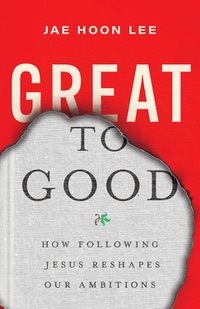
Great to Good: How Following Jesus Reshapes Our Ambitions by Jae Hoon Lee. “People tend to measure success by worldly standards. We assume that greatness comes from charisma, influence, and followers. But God cares more about our character than about what people around us think of our reputations. Pastor Jae Hoon Lee challenges us not to pursue greatness but to grow in goodness. Jesus called his followers to cultivate character of goodness, not to aspire to positions of power. The faithful Christian life is one that seeks to become good. These reflections and meditations on the good Christian life unpack what it means for the church to live in obedience and faith, to strip away ambitious self-glorification, and to instead live humble lives of goodness and love.” (Buy it at Amazon or Westminster Books)
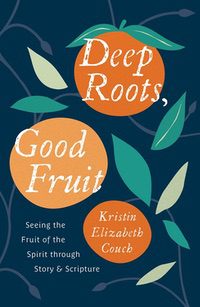
Deep Roots, Good Fruit: Seeing the Fruit of the Spirit through Story & Scripture by Kristin Elizabeth Couch. “What does the fruit of the Spirit look like in everyday life, and how can we become the people the Holy Spirit calls us to be? Author Kristin Elizabeth Couch invites you to explore the fruit of the Spirit through captivating stories of people she’s known: there’s a father who goes missing in a snowstorm; a boss who shouts like a drill sergeant; a neighbor with a refrigerator full of eggs; and Grandpa, who smells of Old Spice! By combining memorable stories with rich meditations on Scripture, Kristin encourages us to see that God is at work even in life’s mundane moments, and that although our growth may seem slow, in the Spirit’s power we really can become more like Jesus. As you reflect on the fruit of the Spirit, you will long for it more deeply, pray for it more fervently, and see afresh how the Spirit is at work in your own life and the lives of others. Put deep roots into God’s word and enjoy bearing more and more of his good fruit.” (Buy it at Amazon)
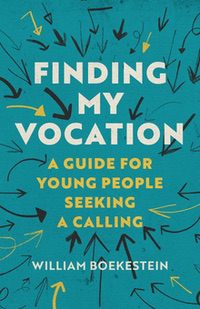
Finding My Vocation: A Guide for Young People Seeking a Calling by William Boekestein. “How can I pick the right job? Actually, you don’t need to choose a job that’s ‘perfect for you.’ But you do need to be faithful and productive in ways that honor God in your work life. Here’s a better question: As a believer, how can I determine what I am supposed to do, and then do it well? The doctrine of calling, or vocation, leads us to the answer. Because for those who are “called according to his purpose” (Rom. 8:28), God provides a place, a time, and the gifts necessary to work for him in this world. God placed us in his world to work for his glory. You might not know exactly what he has planned for you, but you must—and can—be faithful where he calls you to be.” (Buy it at Amazon or Westminster Books)
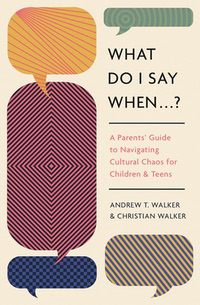
What Do I Say When…?: A Parent’s Guide to Navigating Cultural Chaos for Children and Teens by Andrew T. Walker & Christian Walker. “Navigating the world for the first time can be challenging, especially when popular cultural beliefs contradict the teachings of Scripture. So when inevitable questions arise, parents must be equipped with sound biblical answers to guide their children through the complexities of modern life—because if we fail to catechize our children, the world will surely step in to do it for us. Written by husband and wife duo Andrew and Christian Walker, this accessible and trusted guide helps busy parents quickly and effectively respond to their children’s questions on a wide range of topics, including abortion, sexuality, transgenderism, technology, political engagement, and more. Each chapter contains age-appropriate prompts for parents of children at different stages of development and maturity. Parents can refer to each chapter as specific questions arise, study hot-button topics for future reference, or access a range of conversation starters to proactively cultivate biblical truth within their child’s heart.” (Buy it at Amazon or Westminster Books)
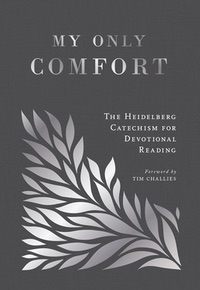
My Only Comfort: The Heidelberg Catechism for Devotional Reading. This is a slight reimagining of the Heidelberg Catechism. “The Heidelberg Catechism is poetic, pastoral, and comforting, but the Q&A format can undercut devotional reading. Bound in linen with silver foil, My Only Comfort includes a Scripture passage for each of the 52 readings.” I wrote the foreword and said, “Rather than reading as a long series of questions and answers, the Catechism now reads as a kind of poetic devotional. And it works well! I trust and I pray that this will spark a new wave of interest and help a new generation to both read and benefit from it.” (Buy it at Amazon or Westminster Books)
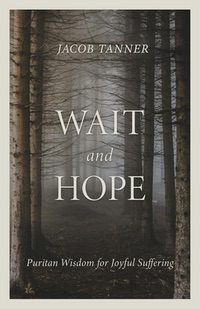
Wait and Hope: Puritan Wisdom for Joyful Suffering by Tanner Jacob. “Since the fall, suffering has been a universal part of human experience. While the specific trials we face change, we all long for hope in the face of many burdens. No group of writers in church history grasped this better than the Puritans. In Wait and Hope, Jacob Tanner reminds us how the Puritans endured immense suffering in various aspects of the Christian life– from facing persecution and death to pursuing assurance through trials. By looking at the lessons they learned, suffering pilgrims today are invited to join the tradition of waiting in hope.” (Buy it at Amazon or Westminster Books)
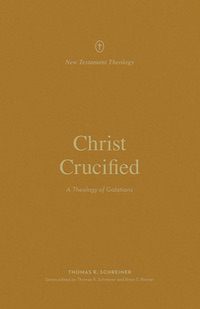
Christ Crucified: A Theology of Galatians by Thomas R. Schreiner. “In a time marked by confusion and change, the pathway to salvation for the Galatians seemed unclear. While the false teachers contended for circumcision and obedience to the law as necessary for justification before God, Paul presented the truth of the gospel and redrew the lines of salvation around the cross of Jesus Christ. In this addition to the New Testament Theology series, scholar Thomas R. Schreiner addresses the conflict between Paul and his opponents in Galatia, examines the gospel itself, and shows what it looks like to live out the truth of the gospel in the new era. After examining the dominant biblical-theological themes of Galatians, readers will be reminded of the gift of grace Christ offers through his death on the cross—the only possible path to salvation and true unity among believers.” (Buy it at Amazon or Westminster Books)
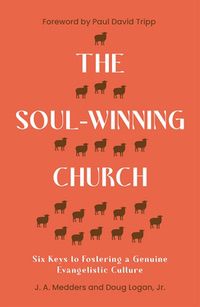
The Soul-Winning Church: Six Keys to Fostering a Genuine Evangelistic Culture by J.A. Medders & Doug Logan. “Your church’s sermons often include a call to evangelize. You’ve held evangelism training events. You give out invites to your Christmas and Easter services. So… where are all the new Christians? Is your church actually reaching the lost with the gospel? For many of us, despite having the best intentions our churches struggle to reach out with the gospel effectively. J.A. Medders and Doug Logan Jr. have decades of experience in leading churches and mentoring pastors, and here they outline six principles for cultivating a genuine evangelistic culture throughout your church. Includes case studies from a variety of different cultures and contexts to give you practical ideas for implementing these six principles. There are also free resources available, including a podcast series, that will help church leaders to implement the principles they learn in the book.” (Buy it at Amazon)
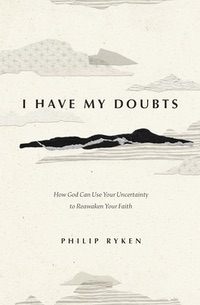
I Have My Doubts: How God Can Use Your Uncertainty to Reawaken Your Faith by Philip Graham Ryken. “Will God do what he says he promises? Can we trust his intentions? Is he even good? Without guidance, these doubt-filled questions can hinder spiritual progress and lead to discouragement. Thankfully, the Bible offers encouraging examples of men and women who remained faithful to God even through seasons of uncertainty. Based on a series of Wheaton College chapel messages, this encouraging guide explores 10 Bible stories on the topic of faith and doubt to reassure readers that doubt is normal for Christians. These stories cover a wide range of questions and doubts that most Christians experience at some point in their faith journey—doubts about God’s power, protection, justice, healing, and more. Ultimately, readers will better understand the dynamic of faith and doubt, helping them renew their faith in God even through times of uncertainty.” (Buy it at Amazon or Westminster Books)
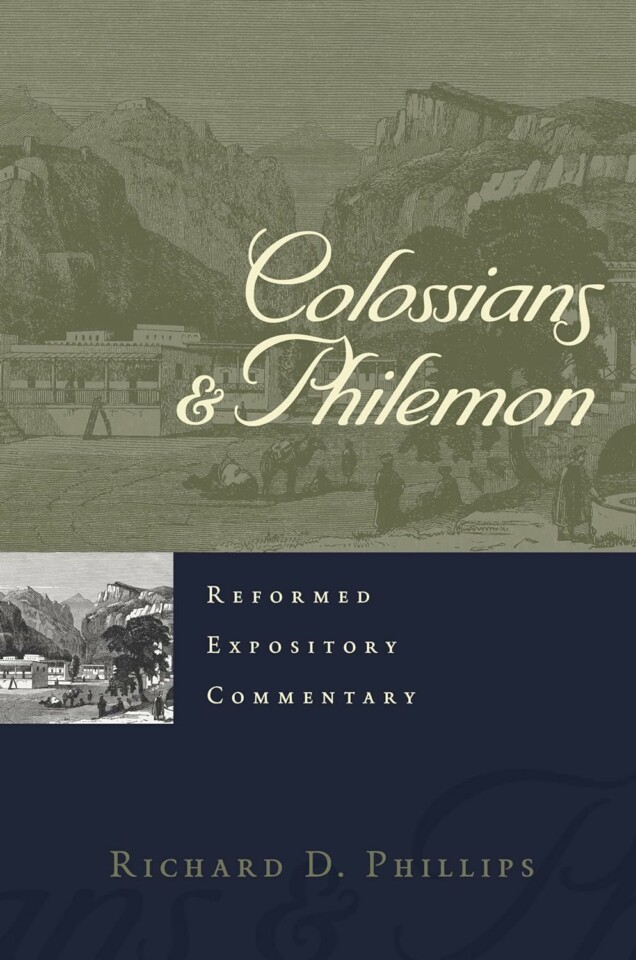
Colossians & Philemon (Reformed Expository Commentaries) by Richard D. Phillips. This volumes continues and extends the Reformed Expository Commentaries series which is sermon-based and ideal for use by preachers or general readers alike. “Caught between Jewish legalism and pagan mystery religions—and evidently attracted to both—the young church in Colossae was struggling. The apostle Paul’s urgent letter to the congregation presents a singularly potent Christology as the cure for their confusion. In a companion letter to Philemon, a member of the church, Paul shows that embracing right doctrine leads to right relationships. Richard D. Phillips’s devotional, pastoral commentary on these two letters presents a compelling view of apostolic apologetics and connects the false teaching of the past to the teaching and beliefs that surround believers on all sides today.” (Buy it at Amazon or Westminster Books)
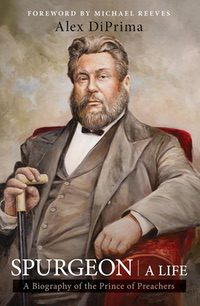
Charles Spurgeon: A Life by Alex DiPrima. “Alex DiPrima paints a fresh portrait of Charles Haddon Spurgeon, the most well-known gospel minister of the nineteenth century. By providing social, historical, and religious context, DiPrima helps us comprehend the scope of Spurgeon’s ministry in London. Combining academic expertise with popular presentation, this short biography of the famed Prince of Preachers will be the go-to introduction to Spurgeon for years to come.” (Buy it at Amazon or Westminster Books)
]]>Quite a long time has passed since we witnessed the unexpected rise of a new kind of Calvinism. Few had anticipated that in the twenty-first century, so many millions of people spanning a host of nations and traditions would find themselves affirming such old and controversial doctrines. Yet many did so because they were wary and weary of the kind of big-box church-growth Evangelicalism that had been packaged and professionalized and very nearly franchised out.
As a movement grows from infancy to maturity, it becomes necessary to ask some questions about it. Particularly, it becomes necessary to ask if it is possible that it over-corrected in response to some of the concerns that caused it to grow in the first place. It becomes necessary to ask where it may need to change before those over-corrections become too deeply entrenched to ever change.
The purpose of Andrew Heard’s book Growth and Change: The Danger and Necessity of a Passion for Church Growth is to get church leaders thinking about the connection between the two terms—between growth and change. “This book is designed to help you think about a very important and very emotional topic: change. And not just change in some generalized sense, but a kind of change that could have great significance in your life: change to our churches, our gospel ministries, and our Christian leadership.” It is change that would spur growth.
Why is such change so necessary? He explains in the introduction:
I am convinced that many of the ways we are running our churches and ministries, and many of the ways that we are exercising our leadership within our churches and ministries, has become a significant hindrance to the fundamental growth of the church, both numerically and spiritually. Or, again to put it positively, I’m convinced that with some significant changes to church life and to our leadership patterns and practices, we will see a greater penetration of the gospel into the lost community around us and so see many more people saved. I’m convinced that we can see more men, women and children come to faith in Christ and grown to maturity in Christ.
Big if true, as the young folk say. But also challenging because “we won’t change the things that need to be changed until the pain of not changing is greater than the pain of changing.” The author’s task, then, is to help us see and feel the pain of not changing to such a degree that we actually begin what could be a long and difficult process. The greatest part of that pain is the pain of knowing that the people around us are perishing and that it is our responsibility to reach them with the good news that could save them. “Unless we share God’s heart for the lost in such a way that it pains us greatly to see people perish without Christ, and unless that pain exceeds the pain that we know will accompany our efforts to make changes, we will almost always opt for the status quo. Of course, this is not the only factor that will determine whether we work to bring about change. But it’s a significant and inescapable part of the equation.”
I need to pause here to say that Heard is one of us. He’s not some church growth guru who is writing from a completely different theological perspective. He’s not one of those guys who wants to be able to start a new movement with his name attached to it or a consultant whose over-priced plan is to water down the gospel to make it more palatable to unbelievers. Not at all. He loves the gospel and would do nothing to tamper with it or adapt it to modern sensibilities. Yet he is also concerned that many churches—many of our churches—have too little concern for the growth of their churches and, therefore, for the salvation of the people in their communities. “If we develop a passion for church growth without being aware that this is one of the most dangerous passions a person can have, then the passion will destroy us and our work. What’s more, it’s one thing for the leaders of a church to be passionate about growth, but when that passion extends to the members of the church, the situation becomes even more dangerous.” In other words, he wants us to consider growth with a prudent awareness of the temptations it can bring and the many ways it can go wrong.
So the goal of his book is to create a passion for growth and a heart that is willing to bear the pain of change. It is to commit to being faithful, but also to assess whether we are being truly fruitful—to think deeply about both inputs and outputs, the things we do and the results we see in response. It is to convince Christians that it is honoring to God to consider and do those things that will spur growth, yet always in such a way that God’s Word reigns supreme over both means and ends.
Acknowledging that such talk makes some people nervous, it is perhaps worth noting here that no less than D.A. Carson provided the foreword and proclaimed it the best book in its field. “Andrew Heard,” he insists, “is a reliable guide to the biblical, theological, evangelistic and pastoral issues that will confront all Christian leaders who aim for growth, recognize the need for change, and hunger to work out of a rich and faithful biblical theology. Andrew is well known and well trusted in Australia, his homeland. Now we pray that his influence may multiply exponentially around the world.” And having read Growth and Change, I find myself echoing both the praise and the hope. I read this book with a deepening sense of conviction and with a deepening sense that I need to go back and read it again, and possibly again after that.
]]>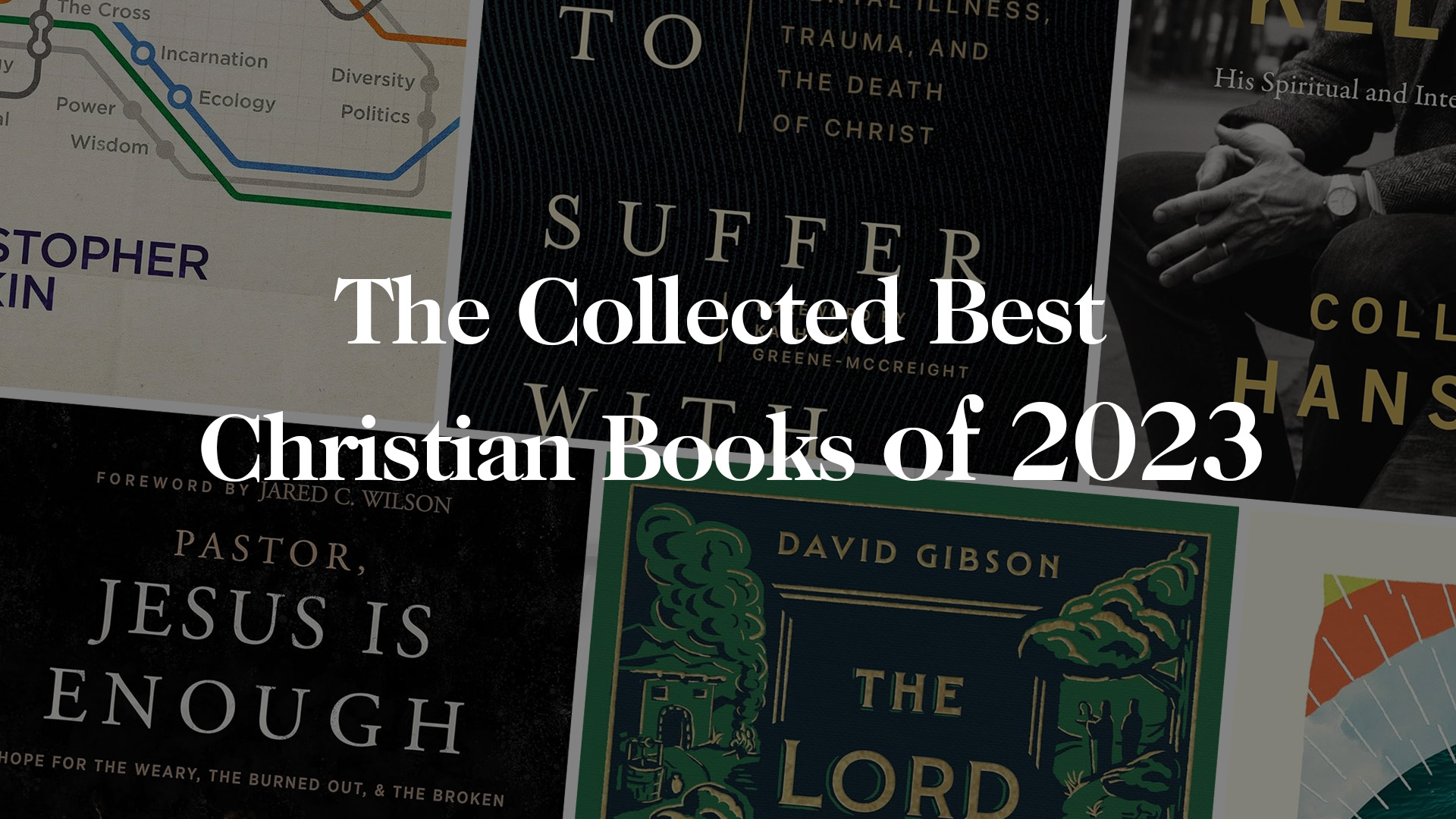 I probably don’t need to tell you how much I love books in general, and Christian books in particular. One of my favorite times to be a reader is in mid-December when people begin to share their picks for the top books of the year. I usually collect a good number of these lists and scour them to see if there is any consensus. I have done that over the past few weeks and am ready to share the results. A few years ago it always seemed simple to find a few consensus picks. Over the past years, for one reason or another, it has become far more difficult. So while I scour as many lists as ever, it is rare for a single book to appear on more than a handful of them. With that in mind, here are the ones that appeared repeatedly and, in a more subjective sense, seemed to generate the most positive buzz throughout the year. If I had to list just a couple of others, they would likely be Remaking the World by Andrew Wilson and The Great Dechurching by Jim Davis, Michael Graham, and Ryan Burge. Here is an incomplete list of the various awards and roundups I consulted. (I feel compelled to note that both Christianity Today and The Gospel Coalition base their awards on paid submissions—publishers must submit their books and pay a fee for them to be considered which makes their process and criteria a little different.) Let me add a word about methodology. The…]]>
I probably don’t need to tell you how much I love books in general, and Christian books in particular. One of my favorite times to be a reader is in mid-December when people begin to share their picks for the top books of the year. I usually collect a good number of these lists and scour them to see if there is any consensus. I have done that over the past few weeks and am ready to share the results. A few years ago it always seemed simple to find a few consensus picks. Over the past years, for one reason or another, it has become far more difficult. So while I scour as many lists as ever, it is rare for a single book to appear on more than a handful of them. With that in mind, here are the ones that appeared repeatedly and, in a more subjective sense, seemed to generate the most positive buzz throughout the year. If I had to list just a couple of others, they would likely be Remaking the World by Andrew Wilson and The Great Dechurching by Jim Davis, Michael Graham, and Ryan Burge. Here is an incomplete list of the various awards and roundups I consulted. (I feel compelled to note that both Christianity Today and The Gospel Coalition base their awards on paid submissions—publishers must submit their books and pay a fee for them to be considered which makes their process and criteria a little different.) Let me add a word about methodology. The…]]>
I probably don’t need to tell you how much I love books in general, and Christian books in particular. One of my favorite times to be a reader is in mid-December when people begin to share their picks for the top books of the year. I usually collect a good number of these lists and scour them to see if there is any consensus. I have done that over the past few weeks and am ready to share the results.
A few years ago it always seemed simple to find a few consensus picks. Over the past years, for one reason or another, it has become far more difficult. So while I scour as many lists as ever, it is rare for a single book to appear on more than a handful of them. With that in mind, here are the ones that appeared repeatedly and, in a more subjective sense, seemed to generate the most positive buzz throughout the year.
- Biblical Critical Theory: How the Bible’s Unfolding Story Makes Sense of Modern Life and Culture by Christopher Watkin. This book also appeared in last year’s roundup, but I think because it was large, dense, and released late in 2022, many readers only got to it this year. Notably, Christianity Today declared it their book of the year.
- The Lord of Psalm 23: Jesus Our Shepherd, Companion, and Host by David Gibson. I read many positive reviews of this one throughout the year and also spotted it on several of the year-end roundups.
- Pastor, Jesus Is Enough: Hope for the Weary, the Burned Out, and the Broken by Jeremy Writebol. This book is obviously geared to pastors and will primarily appeal to them. Many seemed to find it a source of deep encouragement.
- A Quiet Mind to Suffer With: Mental Illness, Trauma, and the Death of Christ by John Andrew Bryant. A number of avid readers mentioned that this book was an especially helpful volume on mental illness and the nearness of Christ to those who suffer from it.
- Timothy Keller: His Spiritual and Intellectual Formation by Collin Hansen. This biography, which focuses primarily on intellectual and spiritual influences, was timed providentially so it was released very close to the time Keller went to be with the Lord. Many readers appreciated coming to know him better through it.
If I had to list just a couple of others, they would likely be Remaking the World by Andrew Wilson and The Great Dechurching by Jim Davis, Michael Graham, and Ryan Burge.
Here is an incomplete list of the various awards and roundups I consulted. (I feel compelled to note that both Christianity Today and The Gospel Coalition base their awards on paid submissions—publishers must submit their books and pay a fee for them to be considered which makes their process and criteria a little different.)
- Christianity Today
- The Gospel Coalition
- Kevin DeYoung
- For the Church
- Trevin Wax
- Mere Orthodoxy
- Cole Newton
- Wes Bredenhof
- Erik Raymond
- Credo Magazine
- David Kaywood
- Craig Hamilton
- Kristen Wetherell
- Darryl Dash
- Cindy Matson
- Aaron Armstrong
- Kevin Halloran
- Bob Kellemen
- Matthew Hosier
- Andrew Wilson
- Christa Threlfall
Let me add a word about methodology. The only lists I include are the ones that are published by people I follow anyway. I follow perhaps 250 to 300 blogs and sites, so that provides a significant group to draw from. That said, I tend to follow people with whom I have broad doctrinal alignment, so I suppose there’s a pretty significant bias involved. So be it!
]]>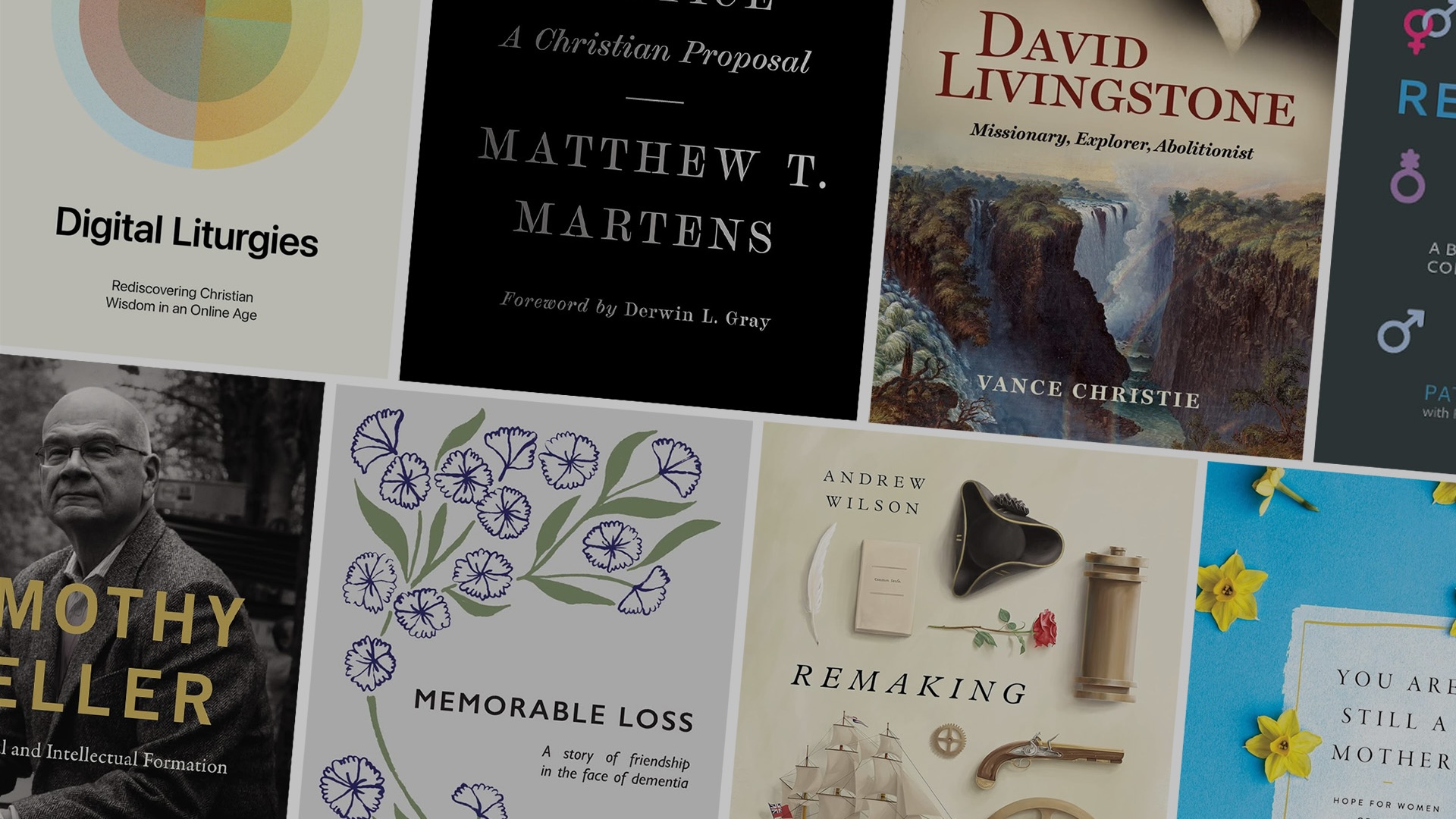 As another year draws to a close, I wanted to take some time to consider the books I read in 2023 and to assemble a list of my top picks. Apart from the first book, which I consider the best I read this year, the rest are in no particular order. In each case I’ve included a brief excerpt from my review. (You can read my reviews of these books and many others here.) Reforming Criminal Justice: A Christian Proposal by Matthew Martens. I rank this as the best largely because it got me to think about things I’ve never really considered before and pushed me to think about them in a distinctly Christian way. Most of us probably assume that the criminal justice system in our country is generally sound. We may believe that it needs some tweaks here and there. We may understand that because it exists in a fallen world it will in some ways reflect the sins and weaknesses of the people who control and oversee it. But rarely do we pause to ask questions like this: If we had to design a criminal justice system from scratch and do so in a way that is consistent with Scripture, what might it look like? What principles would we embed within it? And how closely would it resemble the system we currently have? These are the question this fascinating book answers from a distinctly Christian perspective. (Buy it at Amazon or Westminster Books; read my review) Digital Liturgies: Rediscovering Christian Wisdom in an Online Age by Samuel James. Samuel…]]>
As another year draws to a close, I wanted to take some time to consider the books I read in 2023 and to assemble a list of my top picks. Apart from the first book, which I consider the best I read this year, the rest are in no particular order. In each case I’ve included a brief excerpt from my review. (You can read my reviews of these books and many others here.) Reforming Criminal Justice: A Christian Proposal by Matthew Martens. I rank this as the best largely because it got me to think about things I’ve never really considered before and pushed me to think about them in a distinctly Christian way. Most of us probably assume that the criminal justice system in our country is generally sound. We may believe that it needs some tweaks here and there. We may understand that because it exists in a fallen world it will in some ways reflect the sins and weaknesses of the people who control and oversee it. But rarely do we pause to ask questions like this: If we had to design a criminal justice system from scratch and do so in a way that is consistent with Scripture, what might it look like? What principles would we embed within it? And how closely would it resemble the system we currently have? These are the question this fascinating book answers from a distinctly Christian perspective. (Buy it at Amazon or Westminster Books; read my review) Digital Liturgies: Rediscovering Christian Wisdom in an Online Age by Samuel James. Samuel…]]>
As another year draws to a close, I wanted to take some time to consider the books I read in 2023 and to assemble a list of my top picks. Apart from the first book, which I consider the best I read this year, the rest are in no particular order. In each case I’ve included a brief excerpt from my review. (You can read my reviews of these books and many others here.)
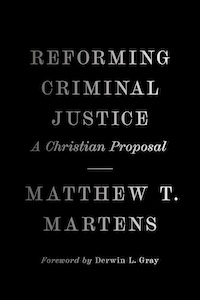
Reforming Criminal Justice: A Christian Proposal by Matthew Martens. I rank this as the best largely because it got me to think about things I’ve never really considered before and pushed me to think about them in a distinctly Christian way. Most of us probably assume that the criminal justice system in our country is generally sound. We may believe that it needs some tweaks here and there. We may understand that because it exists in a fallen world it will in some ways reflect the sins and weaknesses of the people who control and oversee it. But rarely do we pause to ask questions like this: If we had to design a criminal justice system from scratch and do so in a way that is consistent with Scripture, what might it look like? What principles would we embed within it? And how closely would it resemble the system we currently have? These are the question this fascinating book answers from a distinctly Christian perspective. (Buy it at Amazon or Westminster Books; read my review)
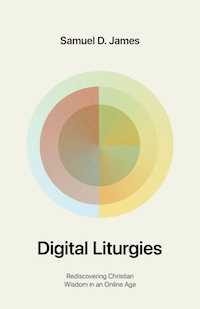
Digital Liturgies: Rediscovering Christian Wisdom in an Online Age by Samuel James. Samuel James’ Digital Liturgies is meant to help you think about digital technologies and the social internet they enable. For these are not harmless or inconsequential tools. Neither can they be exactly compared to any tools that we have previously experienced in human history, for they alone provide a “disembodied electronic environment that we enter through connected devices for the purpose of accessing information, relationships, and media that are not available to us in a physical format.” Our use of these technologies and our increasing immersion in them essentially brings us into a whole new kind of world in which we leave aside so much of what makes us who we are. (Buy it at Amazon or Westminster Books; read my review)
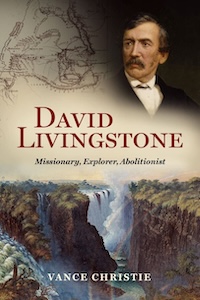
David Livingstone: Missionary, Explorer, Abolitionist by Vance Christie. There are some historical figures whose every sin seems to get overlooked and whose every virtue seems to get amplified. Conversely, there are other historical figures whose every virtue seems to get overlooked and whose every sin seems to get amplified. I would place the modern understanding of David Livingstone squarely in the latter category. Though he was most certainly a flawed individual, it seems that today he is known only for those flaws rather than for his many strengths. It’s for this reason that Vance Christie’s weighty new biography of Livingstone is so timely and so important. (Buy it at Amazon or Westminster Books; read my review)
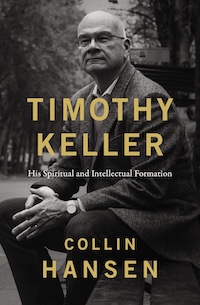
Timothy Keller: His Spiritual and Intellectual Formation by Collin Hansen. I wasn’t expecting to enjoy this book as much as I did. I enjoy reading a good biography as much as anyone, but was perhaps a bit skeptical about a book that, instead of focusing on an individual’s life and accomplishments, instead describes his spiritual and intellectual formation. Yet what could have been a mite dry was actually very compelling. Whether you have been influenced by Keller or not, whether you admire him or not, I believe you will enjoy this account of his life framed around his intellectual and spiritual development. Told through the pen of an especially talented a writer, it is a fascinating and compelling narrative. It may just get you thinking about who has formed you and compel you to praise God for the people, the preachers, the books, and the organizations that have made you who you are. (Buy it at Amazonor Westminster Books; read my review)
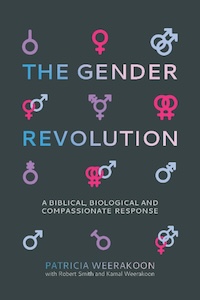
The Gender Revolution: A Biblical, Biological and Compassionate Response by Patricia Weerakoon, Robert Smith, and Kamal Weerakoon. This is a book that has been written to provide a biblical, biological, and compassionate response to the modern day gender ideology that has been flooding our world and sweeping away so many victims. It is written by a fascinating combination of authors: Patricia Weerakoon who is a now-retired medical doctor, counsellor, sex therapist, speaker, writer and academic; Kamal Weerakoon (Patricia’s son) who is a missions director at a Presbyterian church; and Robert Smith who is a long-time lecturer in theology, ethics and music ministry at Sydney Missionary & Bible College. (Buy it at Amazon or Westminster Books; read my review)
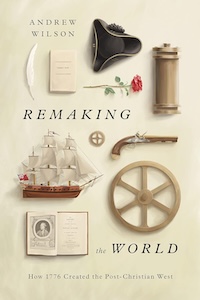
Remaking the World: How 1776 Created the Post-Christian West by Andrew Wilson. The book’s big idea is that the year “1776, more than any other year in the last millennium, is the year that made us who we are.” In this case, the “us” refers to those who live in what we might call the modern, industrialized West. I very much enjoyed reading Remaking the World. It is an enjoyable book, a well-paced book, and one written with verve. It takes on an audacious thesis and, as far as I can tell (even while admitting I’m entirely unqualified to judge), one the author defends well. I think you’re likely to enjoy it just as much as I did. (Buy it at Amazon or Westminster Books; read my review)
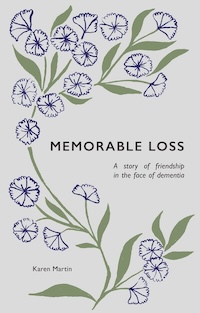
Memorable Loss: A Story of Friendship in the Face of Dementia by Karen Martin. This is Karen Martin’s account of the days from immediately prior to her friend Kathleen’s diagnosis of dementia all the way to her passing. It explains Alzheimer’s and dementia and shows how though they necessarily reduce the patient’s capacities, they do not reduce her personhood. It tells of some of the trials that caretakers must endure and some of the agonizing decisions they need to make on behalf of the one they love. And it does all of this through the highest quality of prose. It’s an achingly beautiful account that leaves the reader groaning with the sorrow of this world but rejoicing in its delights and longing for the day when death and mourning, when crying and pain, will have passed away. (Buy it at Amazon or Westminster Books; read my review)
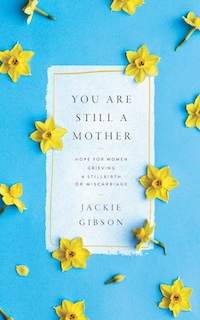
You Are Still a Mother: Hope for Women Grieving a Stillbirth or Miscarriage by Jackie Gibson. There is no path through this life that does not involve hardship. There is no path through this life that does not involve sorrow and loss. One of the most common sorrows, the most common losses, is that of a child who dies through miscarriage or stillbirth. So many parents are familiar with the agony of losing a child they never truly got to know, yet loved with their whole heart. Writing specifically for mothers who have become members of a club that no one wants to join, Jackie Gibson’s message to them is this: You are still a mother. (Buy it at Amazon or Westminster Books; read my review)
]]> October has been an excellent month when it comes to releases of Christian books. I sorted through the huge stacks that came my way this month and ended up with this list of 12 new and especially noteworthy picks. In each case I have provided the editorial description so you can have a bit of information about it. I hope there’s something here that catches your eye!Don’t Follow Your Heart: Boldly Breaking the Ten Commandments of Self-Worship by Thaddeus Williams. “Today we are told to be true to ourselves, look within for answers, and follow our hearts. But when we put our own happiness first, we experience record-breaking levels of aimlessness, loneliness, depression, and anxiety. Self-centeredness always fails to deliver the fulfillment we’re seeking. In Don’t Follow Your Heart, Thaddeus Williams debunks the ‘ten commandments of self-worship,’ which include popular propaganda, like: #liveyourbestlife: Thou shalt always act in accord with your chief end—to glorify and enjoy yourself forever. #followyourheart: Thou shalt obey your emotions at all costs. #yolo: Thou shalt pursue the rush of boundary-free experience. Williams builds a case that this type of self-worship is not authentic, satisfying, or edgy. Instead, its rehashing what is literally humanity’s oldest lie. He calls on a new generation of mavericks and renegades, heretics who refuse to march in unison with the self-obsessed herd. With a fascinating blend of theology, philosophy, science, psychology, and pop culture, Williams points us to a life beyond self-defeating dogmas to a more meaningful life centered on Someone infinitely more interesting, satisfying, and…]]>
October has been an excellent month when it comes to releases of Christian books. I sorted through the huge stacks that came my way this month and ended up with this list of 12 new and especially noteworthy picks. In each case I have provided the editorial description so you can have a bit of information about it. I hope there’s something here that catches your eye!Don’t Follow Your Heart: Boldly Breaking the Ten Commandments of Self-Worship by Thaddeus Williams. “Today we are told to be true to ourselves, look within for answers, and follow our hearts. But when we put our own happiness first, we experience record-breaking levels of aimlessness, loneliness, depression, and anxiety. Self-centeredness always fails to deliver the fulfillment we’re seeking. In Don’t Follow Your Heart, Thaddeus Williams debunks the ‘ten commandments of self-worship,’ which include popular propaganda, like: #liveyourbestlife: Thou shalt always act in accord with your chief end—to glorify and enjoy yourself forever. #followyourheart: Thou shalt obey your emotions at all costs. #yolo: Thou shalt pursue the rush of boundary-free experience. Williams builds a case that this type of self-worship is not authentic, satisfying, or edgy. Instead, its rehashing what is literally humanity’s oldest lie. He calls on a new generation of mavericks and renegades, heretics who refuse to march in unison with the self-obsessed herd. With a fascinating blend of theology, philosophy, science, psychology, and pop culture, Williams points us to a life beyond self-defeating dogmas to a more meaningful life centered on Someone infinitely more interesting, satisfying, and…]]>
October has been an excellent month when it comes to releases of Christian books. I sorted through the huge stacks that came my way this month and ended up with this list of 12 new and especially noteworthy picks. In each case I have provided the editorial description so you can have a bit of information about it. I hope there’s something here that catches your eye!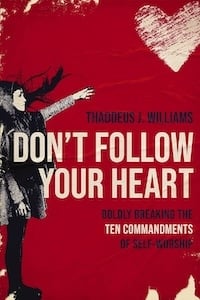 Don’t Follow Your Heart: Boldly Breaking the Ten Commandments of Self-Worship by Thaddeus Williams. “Today we are told to be true to ourselves, look within for answers, and follow our hearts. But when we put our own happiness first, we experience record-breaking levels of aimlessness, loneliness, depression, and anxiety. Self-centeredness always fails to deliver the fulfillment we’re seeking. In Don’t Follow Your Heart, Thaddeus Williams debunks the ‘ten commandments of self-worship,’ which include popular propaganda, like: #liveyourbestlife: Thou shalt always act in accord with your chief end—to glorify and enjoy yourself forever. #followyourheart: Thou shalt obey your emotions at all costs. #yolo: Thou shalt pursue the rush of boundary-free experience. Williams builds a case that this type of self-worship is not authentic, satisfying, or edgy. Instead, its rehashing what is literally humanity’s oldest lie. He calls on a new generation of mavericks and renegades, heretics who refuse to march in unison with the self-obsessed herd. With a fascinating blend of theology, philosophy, science, psychology, and pop culture, Williams points us to a life beyond self-defeating dogmas to a more meaningful life centered on Someone infinitely more interesting, satisfying, and awesome than ourselves.” (Buy it at Amazon or ChristianBook.com)
Don’t Follow Your Heart: Boldly Breaking the Ten Commandments of Self-Worship by Thaddeus Williams. “Today we are told to be true to ourselves, look within for answers, and follow our hearts. But when we put our own happiness first, we experience record-breaking levels of aimlessness, loneliness, depression, and anxiety. Self-centeredness always fails to deliver the fulfillment we’re seeking. In Don’t Follow Your Heart, Thaddeus Williams debunks the ‘ten commandments of self-worship,’ which include popular propaganda, like: #liveyourbestlife: Thou shalt always act in accord with your chief end—to glorify and enjoy yourself forever. #followyourheart: Thou shalt obey your emotions at all costs. #yolo: Thou shalt pursue the rush of boundary-free experience. Williams builds a case that this type of self-worship is not authentic, satisfying, or edgy. Instead, its rehashing what is literally humanity’s oldest lie. He calls on a new generation of mavericks and renegades, heretics who refuse to march in unison with the self-obsessed herd. With a fascinating blend of theology, philosophy, science, psychology, and pop culture, Williams points us to a life beyond self-defeating dogmas to a more meaningful life centered on Someone infinitely more interesting, satisfying, and awesome than ourselves.” (Buy it at Amazon or ChristianBook.com)
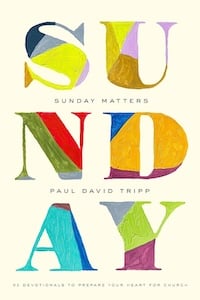 Sunday Matters: 52 Devotionals to Prepare Your Heart for Church by Paul David Tripp. “Christians understand the importance of attending church, but many find their attention being pulled away from worship because of family, schedule, work, finances, and other distractions. With so much on their minds, how can churchgoers prepare their hearts to offer God the worship he deserves? In Sunday Matters, Paul David Tripp shares 52 devotions about the beauty and significance of church, helping Christians engage in vibrant gathered worship each week. Each short, accessible meditation highlights an essential spiritual topic, including divine grace, gratitude, our identity in Christ, and dependence on the Lord. Over the course of a year, Sunday Matters will strengthen each believer’s personal relationship with God and fill churches with joyful, engaged, and passionate worshipers.” (Buy it at Amazon, ChristianBooks.com, or Westminster Books)
Sunday Matters: 52 Devotionals to Prepare Your Heart for Church by Paul David Tripp. “Christians understand the importance of attending church, but many find their attention being pulled away from worship because of family, schedule, work, finances, and other distractions. With so much on their minds, how can churchgoers prepare their hearts to offer God the worship he deserves? In Sunday Matters, Paul David Tripp shares 52 devotions about the beauty and significance of church, helping Christians engage in vibrant gathered worship each week. Each short, accessible meditation highlights an essential spiritual topic, including divine grace, gratitude, our identity in Christ, and dependence on the Lord. Over the course of a year, Sunday Matters will strengthen each believer’s personal relationship with God and fill churches with joyful, engaged, and passionate worshipers.” (Buy it at Amazon, ChristianBooks.com, or Westminster Books)
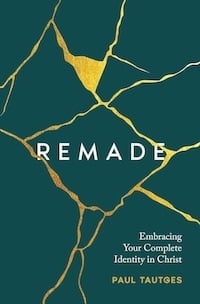 Remade: Embracing Your Complete Identity in Christ by Paul Tautges. “Do you know who you are? Often our self-perception, even as Christians, is fragmented or incomplete—we struggle to grasp the richly faceted identity we’ve been given in Christ. When our evaluation of ourselves, our sin, and our circumstances is misaligned with God’s view, we don’t live with the comfort and motivation Christ offers. In this Scripture-saturated devotional, pastor and biblical counselor Paul Tautges provides 90 meditations on your complete identity before God in Christ. You are a saint in good standing before God, yet you are simultaneously a sinner who must battle with your desires and a sufferer who undergoes hardship. Day by day, discover how grasping this threefold biblical reality centers your thoughts and affections on the Savior and prepares you to stay on God’s good path as you live in a broken world.” (Buy it at Amazon, ChristianBook.com, or Westminster Books)
Remade: Embracing Your Complete Identity in Christ by Paul Tautges. “Do you know who you are? Often our self-perception, even as Christians, is fragmented or incomplete—we struggle to grasp the richly faceted identity we’ve been given in Christ. When our evaluation of ourselves, our sin, and our circumstances is misaligned with God’s view, we don’t live with the comfort and motivation Christ offers. In this Scripture-saturated devotional, pastor and biblical counselor Paul Tautges provides 90 meditations on your complete identity before God in Christ. You are a saint in good standing before God, yet you are simultaneously a sinner who must battle with your desires and a sufferer who undergoes hardship. Day by day, discover how grasping this threefold biblical reality centers your thoughts and affections on the Savior and prepares you to stay on God’s good path as you live in a broken world.” (Buy it at Amazon, ChristianBook.com, or Westminster Books)
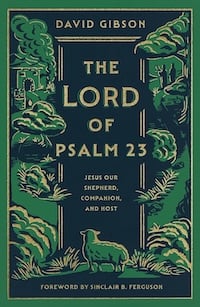 The Lord of Psalm 23: Jesus Our Shepherd, Companion, and Host by David Gibson. “Psalm 23 is one of the most recognizable passages in the whole Bible. Though relatively short, this poetic depiction of God’s love epitomizes Christ’s goodness and provision as he leads his children. Even lifelong Christians will find fresh encouragement by closely studying these familiar words. David Gibson walks through each verse in Psalm 23, thoroughly examining its 3 depictions of the believer’s union with Christ as sheep and shepherd, traveler and companion, and guest and host. Gibson provides canonical context for the Psalm’s beautiful imagery, inspiring praise and wonder as readers reflect on the loving Shepherd who meets every need.” (Buy it at Amazon, ChristianBook.com, or Westminster Books)
The Lord of Psalm 23: Jesus Our Shepherd, Companion, and Host by David Gibson. “Psalm 23 is one of the most recognizable passages in the whole Bible. Though relatively short, this poetic depiction of God’s love epitomizes Christ’s goodness and provision as he leads his children. Even lifelong Christians will find fresh encouragement by closely studying these familiar words. David Gibson walks through each verse in Psalm 23, thoroughly examining its 3 depictions of the believer’s union with Christ as sheep and shepherd, traveler and companion, and guest and host. Gibson provides canonical context for the Psalm’s beautiful imagery, inspiring praise and wonder as readers reflect on the loving Shepherd who meets every need.” (Buy it at Amazon, ChristianBook.com, or Westminster Books)
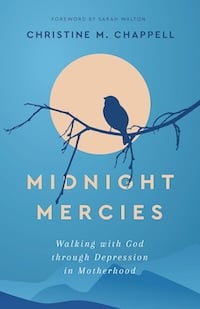 Midnight Mercies: Walking with God Through Depression in Motherhood by Christine Chappell. “Are you a mother who feels stuck in depression? You’re not the only Christian woman who knows what this darkness is like. When feelings of hopelessness, weariness, sadness, anger, anxiety, shame, and loneliness feel impossible to bear, it can seem like God is nowhere to be found. But there’s more to the story than you can presently perceive. Biblical counselor Christine Chappell has walked these dark paths herself—and she wants to help you to see God’s heart for you more clearly as you endure sorrow and pain. As Christine recounts her own midnight journey through depression and explores stories of desperate sufferers who experienced God’s mercy in the Scriptures, she shows how God meets us in our despair and helps us toward his light—one step at a time. Each chapter concludes with immediate help in the form of simple next steps, a Scripture verse for contemplation and comfort, and questions for journaling.” (Buy it at Amazon, ChristianBook.com, or Westminster Books)
Midnight Mercies: Walking with God Through Depression in Motherhood by Christine Chappell. “Are you a mother who feels stuck in depression? You’re not the only Christian woman who knows what this darkness is like. When feelings of hopelessness, weariness, sadness, anger, anxiety, shame, and loneliness feel impossible to bear, it can seem like God is nowhere to be found. But there’s more to the story than you can presently perceive. Biblical counselor Christine Chappell has walked these dark paths herself—and she wants to help you to see God’s heart for you more clearly as you endure sorrow and pain. As Christine recounts her own midnight journey through depression and explores stories of desperate sufferers who experienced God’s mercy in the Scriptures, she shows how God meets us in our despair and helps us toward his light—one step at a time. Each chapter concludes with immediate help in the form of simple next steps, a Scripture verse for contemplation and comfort, and questions for journaling.” (Buy it at Amazon, ChristianBook.com, or Westminster Books)
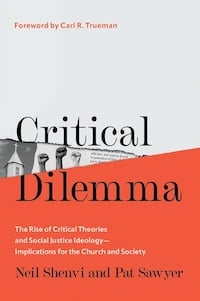 Critical Dilemma: The Rise of Critical Theories and Social Justice Ideology-Implications for the Church and Society by Neil Shenvi & Pat Sawyer. “Critical theory and its expression in fields such as critical race theory, critical pedagogy, and queer theory are having a profound impact on our culture. Contemporary critical theory’s ideas about race, class, gender, identity, and justice have dramatically shaped how people think, act, and view one another—in Christian and secular spheres alike. In Critical Dilemma, authors Neil Shenvi and Pat Sawyer illuminate the origins and influences of contemporary critical theory, considering it in the light of clear reason and biblical orthodoxy. While acknowledging that it can provide some legitimate insights regarding race, class, and gender, Critical Dilemma exposes the false assumptions at the heart of critical theory, arguing that it poses a serious threat to both the church and society at large. Drawing on exhaustive research and careful analysis, Shenvi and Sawyer condemn racism, urge Christians to seek justice, and offer a path forward for racial healing and unity while also opposing critical theory’s manifold errors.” (Buy it at Amazon or ChristianBook.com)
Critical Dilemma: The Rise of Critical Theories and Social Justice Ideology-Implications for the Church and Society by Neil Shenvi & Pat Sawyer. “Critical theory and its expression in fields such as critical race theory, critical pedagogy, and queer theory are having a profound impact on our culture. Contemporary critical theory’s ideas about race, class, gender, identity, and justice have dramatically shaped how people think, act, and view one another—in Christian and secular spheres alike. In Critical Dilemma, authors Neil Shenvi and Pat Sawyer illuminate the origins and influences of contemporary critical theory, considering it in the light of clear reason and biblical orthodoxy. While acknowledging that it can provide some legitimate insights regarding race, class, and gender, Critical Dilemma exposes the false assumptions at the heart of critical theory, arguing that it poses a serious threat to both the church and society at large. Drawing on exhaustive research and careful analysis, Shenvi and Sawyer condemn racism, urge Christians to seek justice, and offer a path forward for racial healing and unity while also opposing critical theory’s manifold errors.” (Buy it at Amazon or ChristianBook.com)
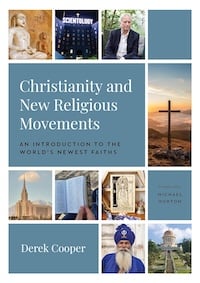 Christianity and New Religious Movements: An Introduction to the World’s Newest Faiths by Derek Cooper. “Every major religion has produced hundreds of offshoots. Although sometimes disparaged as cults or sects, these new religious movements are often culturally accepted and claim to promote a healthy and happy lifestyle. We may have heard of them, but many of us know little about them. For Christians, this makes it difficult for us to engage with their adherents wisely and well. Derek Cooper, a professor of global Christianity, delves into ten of the most historic, most prominent, and most recognizable new religious movements, focusing on ones with members whom people have a higher chance of meeting. Writing from a confessional yet compassionate Christian perspective, he provides an overview of religions such as Jainism, Nation of Islam, Mormonism, and Scientology―their origins, religious writings, beliefs, practices―and describes effective points of contact for Christians. Includes discussion questions and suggestions for further reading.” (Buy it at Amazon, ChristianBook.com, or Westminster Books)
Christianity and New Religious Movements: An Introduction to the World’s Newest Faiths by Derek Cooper. “Every major religion has produced hundreds of offshoots. Although sometimes disparaged as cults or sects, these new religious movements are often culturally accepted and claim to promote a healthy and happy lifestyle. We may have heard of them, but many of us know little about them. For Christians, this makes it difficult for us to engage with their adherents wisely and well. Derek Cooper, a professor of global Christianity, delves into ten of the most historic, most prominent, and most recognizable new religious movements, focusing on ones with members whom people have a higher chance of meeting. Writing from a confessional yet compassionate Christian perspective, he provides an overview of religions such as Jainism, Nation of Islam, Mormonism, and Scientology―their origins, religious writings, beliefs, practices―and describes effective points of contact for Christians. Includes discussion questions and suggestions for further reading.” (Buy it at Amazon, ChristianBook.com, or Westminster Books)
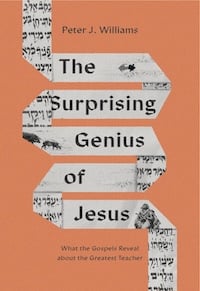 The Surprising Genius of Jesus: What the Gospels Reveal about the Greatest Teacher by Peter J. Williams. “When someone thinks of Jesus, “genius” is not likely the first word that comes to mind. But when studied in detail, Jesus’s teachings and interactions with others combined high levels of knowledge and insight, verbal skill, and simplicity—showing his genius. In The Surprising Genius of Jesus, Peter J. Williams examines the story of the prodigal son in Luke 15 to show the genius, creativity, and wisdom of Jesus’s teachings. He used simple but powerful stories to confront the Pharisees and scribes of the day, drawing on his knowledge of the Jewish Scriptures to teach his audience through complex layers and themes. Williams challenges those who question whether Jesus really was the source of the parables recorded in the Gospels, pointing readers to the truth of who Jesus is and why that matters for them today.” (Buy it at Amazon, ChristianBook.com, or Westminster Books)
The Surprising Genius of Jesus: What the Gospels Reveal about the Greatest Teacher by Peter J. Williams. “When someone thinks of Jesus, “genius” is not likely the first word that comes to mind. But when studied in detail, Jesus’s teachings and interactions with others combined high levels of knowledge and insight, verbal skill, and simplicity—showing his genius. In The Surprising Genius of Jesus, Peter J. Williams examines the story of the prodigal son in Luke 15 to show the genius, creativity, and wisdom of Jesus’s teachings. He used simple but powerful stories to confront the Pharisees and scribes of the day, drawing on his knowledge of the Jewish Scriptures to teach his audience through complex layers and themes. Williams challenges those who question whether Jesus really was the source of the parables recorded in the Gospels, pointing readers to the truth of who Jesus is and why that matters for them today.” (Buy it at Amazon, ChristianBook.com, or Westminster Books)
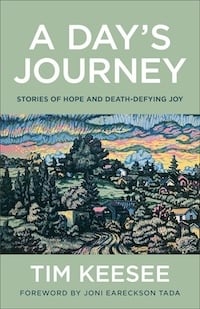 A Day’s Journey: Stories of Hope and Death-Defying Joy by Tim Keesee. “Tim Keesee spent years crisscrossing the globe, documenting the gospel’s advance in regions of war and persecution through his writing and films. But double blows from terminal cancer diagnoses in 2019 and 2021 brought his travels to a halt. In A Day’s Journey, Tim takes up his pen to write dispatches from a smaller, more intimate world. He writes of Christian brothers and sisters who have taught him so much about a day well spent: the way they work and worship, the way they pray and sing, the way they love their neighbors and their enemies, even when beaten black and blue for the sake of Christ. In this book you’ll have the privilege to walk with Tim through days of pain and hard questions, but also days of grace, wonder, and death-defying joy. Poignant, inspiring, and beautifully written, these stories model the courage we need, the joy we have, the gospel we love, the cross we bear, and the hope we embrace until faith becomes sight.” (Buy it at Amazon, ChristianBook.com, or Westminster Books)
A Day’s Journey: Stories of Hope and Death-Defying Joy by Tim Keesee. “Tim Keesee spent years crisscrossing the globe, documenting the gospel’s advance in regions of war and persecution through his writing and films. But double blows from terminal cancer diagnoses in 2019 and 2021 brought his travels to a halt. In A Day’s Journey, Tim takes up his pen to write dispatches from a smaller, more intimate world. He writes of Christian brothers and sisters who have taught him so much about a day well spent: the way they work and worship, the way they pray and sing, the way they love their neighbors and their enemies, even when beaten black and blue for the sake of Christ. In this book you’ll have the privilege to walk with Tim through days of pain and hard questions, but also days of grace, wonder, and death-defying joy. Poignant, inspiring, and beautifully written, these stories model the courage we need, the joy we have, the gospel we love, the cross we bear, and the hope we embrace until faith becomes sight.” (Buy it at Amazon, ChristianBook.com, or Westminster Books)
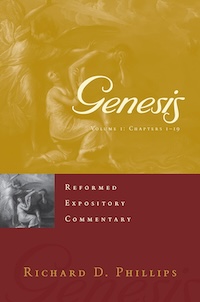 Genesis by Richard Phillips (Reformed Expository Commentary), 2-Volumes. “The book of Genesis lays the essential foundations of the Christian faith. In its first few chapters, we meet God the Creator and witness his first covenant with man. When Adam sins and God responds with a gospel promise, the stage is set for the grand narrative of redemptive history. Through his devotional commentary, Richard Phillips guides readers to better understand God, themselves, their world, and the redemptive, Christ-directed trajectory of history. In the upheaval of the flood and of Babel, and in the stories of Abraham, Isaac, Jacob, and Joseph, God does not forsake his creation or his plan for its redemption through the incarnate Son. As he delves deep into the wonders of Genesis, Phillips invites you first and foremost to worship the God who keeps his covenant promises—both to those in past generations who longed for Christ’s coming and to you who now wait for his return. As are all Reformed Expository Commentaries, this book is accessible to both pastors and lay readers. Each volume in the series gives careful attention to the biblical text, is doctrinally Reformed, focuses on Christ through the lens of redemptive history, and applies the Bible to our contemporary setting.” (Buy it at Amazon, ChristianBook.com, or Westminster Books)
Genesis by Richard Phillips (Reformed Expository Commentary), 2-Volumes. “The book of Genesis lays the essential foundations of the Christian faith. In its first few chapters, we meet God the Creator and witness his first covenant with man. When Adam sins and God responds with a gospel promise, the stage is set for the grand narrative of redemptive history. Through his devotional commentary, Richard Phillips guides readers to better understand God, themselves, their world, and the redemptive, Christ-directed trajectory of history. In the upheaval of the flood and of Babel, and in the stories of Abraham, Isaac, Jacob, and Joseph, God does not forsake his creation or his plan for its redemption through the incarnate Son. As he delves deep into the wonders of Genesis, Phillips invites you first and foremost to worship the God who keeps his covenant promises—both to those in past generations who longed for Christ’s coming and to you who now wait for his return. As are all Reformed Expository Commentaries, this book is accessible to both pastors and lay readers. Each volume in the series gives careful attention to the biblical text, is doctrinally Reformed, focuses on Christ through the lens of redemptive history, and applies the Bible to our contemporary setting.” (Buy it at Amazon, ChristianBook.com, or Westminster Books)
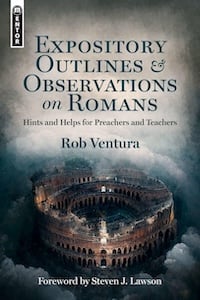 Expository Outlines and Observations on Romans: Hints and Helps for Preachers and Teachers by Rob Ventura. “The book of Romans is rich in doctrinal truth. In Expository Outlines and Observations on Romans Rob Ventura mines these truths and offers quick, accessible, expository nuggets for preachers and teachers. With a thoroughly Reformed view, Ventura has taken each passage of Romans and helps pastors prepare sermons that will help congregations dig deep into this excellent book. The exegesis of the original Greek is beneficial without being highly technical, and readers are aided on their journey by some of church history’s finest, including Luther, Calvin, Spurgeon, and Lloyd Jones. For each passage Ventura highlights: A central theme; A homiletical outline; Exegetical and practical insights; Applications for the church; Applications for non–believers. An excellent addition to any preacher’s bookshelf, this book will not only enrich your preaching, but also cause your own heart to marvel anew at the grace of God.” (Buy it at Amazon, ChristianBook.com, or Westminster Books)
Expository Outlines and Observations on Romans: Hints and Helps for Preachers and Teachers by Rob Ventura. “The book of Romans is rich in doctrinal truth. In Expository Outlines and Observations on Romans Rob Ventura mines these truths and offers quick, accessible, expository nuggets for preachers and teachers. With a thoroughly Reformed view, Ventura has taken each passage of Romans and helps pastors prepare sermons that will help congregations dig deep into this excellent book. The exegesis of the original Greek is beneficial without being highly technical, and readers are aided on their journey by some of church history’s finest, including Luther, Calvin, Spurgeon, and Lloyd Jones. For each passage Ventura highlights: A central theme; A homiletical outline; Exegetical and practical insights; Applications for the church; Applications for non–believers. An excellent addition to any preacher’s bookshelf, this book will not only enrich your preaching, but also cause your own heart to marvel anew at the grace of God.” (Buy it at Amazon, ChristianBook.com, or Westminster Books)
 I always enjoy speaking with Muslims. I enjoy it, in part, because I have yet to meet a Muslim who is offended when I bring up spiritual matters or who is uninterested in discussing them. I’m quite sure I have had more cordial conversations about the gospel with Muslims than with anyone else. I suspect many others would say the same. As I have spoken with Muslims, I always find myself wanting to better understand their faith so I can more effectively present the gospel to them. There are many resources that can help with this, but I am especially thankful for the collection written by Ayman Ibrahim. Ibrahim is a Professor of Islamic Studies at the Southern Baptist Theological Seminary and Director of Jenkins Center for the Christian Understanding of Islam. Having been born and raised in Egypt, he has first-hand experience with Islam and access to the Arabic language. This makes him especially qualified and his books especially effective. There are four I recommend to you. Reaching Your Muslim Neighbor with the Gospel was published by Crossway in 2002 and provides lots of insights and practical counsel on sharing the gospel with Muslims. In the first half of the book, he explains the different strands of Islam and their key beliefs to ensure the reader understands the sheer diversity of the Muslim world. In the second half, he offers advice on actually connecting with Muslims and sharing the gospel with them. That makes this book a very good place to begin before conversing…]]>
I always enjoy speaking with Muslims. I enjoy it, in part, because I have yet to meet a Muslim who is offended when I bring up spiritual matters or who is uninterested in discussing them. I’m quite sure I have had more cordial conversations about the gospel with Muslims than with anyone else. I suspect many others would say the same. As I have spoken with Muslims, I always find myself wanting to better understand their faith so I can more effectively present the gospel to them. There are many resources that can help with this, but I am especially thankful for the collection written by Ayman Ibrahim. Ibrahim is a Professor of Islamic Studies at the Southern Baptist Theological Seminary and Director of Jenkins Center for the Christian Understanding of Islam. Having been born and raised in Egypt, he has first-hand experience with Islam and access to the Arabic language. This makes him especially qualified and his books especially effective. There are four I recommend to you. Reaching Your Muslim Neighbor with the Gospel was published by Crossway in 2002 and provides lots of insights and practical counsel on sharing the gospel with Muslims. In the first half of the book, he explains the different strands of Islam and their key beliefs to ensure the reader understands the sheer diversity of the Muslim world. In the second half, he offers advice on actually connecting with Muslims and sharing the gospel with them. That makes this book a very good place to begin before conversing…]]>
I always enjoy speaking with Muslims. I enjoy it, in part, because I have yet to meet a Muslim who is offended when I bring up spiritual matters or who is uninterested in discussing them. I’m quite sure I have had more cordial conversations about the gospel with Muslims than with anyone else. I suspect many others would say the same.
As I have spoken with Muslims, I always find myself wanting to better understand their faith so I can more effectively present the gospel to them. There are many resources that can help with this, but I am especially thankful for the collection written by Ayman Ibrahim. Ibrahim is a Professor of Islamic Studies at the Southern Baptist Theological Seminary and Director of Jenkins Center for the Christian Understanding of Islam. Having been born and raised in Egypt, he has first-hand experience with Islam and access to the Arabic language. This makes him especially qualified and his books especially effective. There are four I recommend to you.
Reaching Your Muslim Neighbor with the Gospel was published by Crossway in 2002 and provides lots of insights and practical counsel on sharing the gospel with Muslims. In the first half of the book, he explains the different strands of Islam and their key beliefs to ensure the reader understands the sheer diversity of the Muslim world. In the second half, he offers advice on actually connecting with Muslims and sharing the gospel with them. That makes this book a very good place to begin before conversing with Muslims.
Apart from this book and a number of academic works that may be more appropriate for a scholarly audience, Ibrahim has written a three-part series titled “Introducing Islam” that provides a relatively concise understanding of three different aspects of Islam. These are ideal for those who wish to go a little deeper and perhaps be more prepared for in-depth conversations.
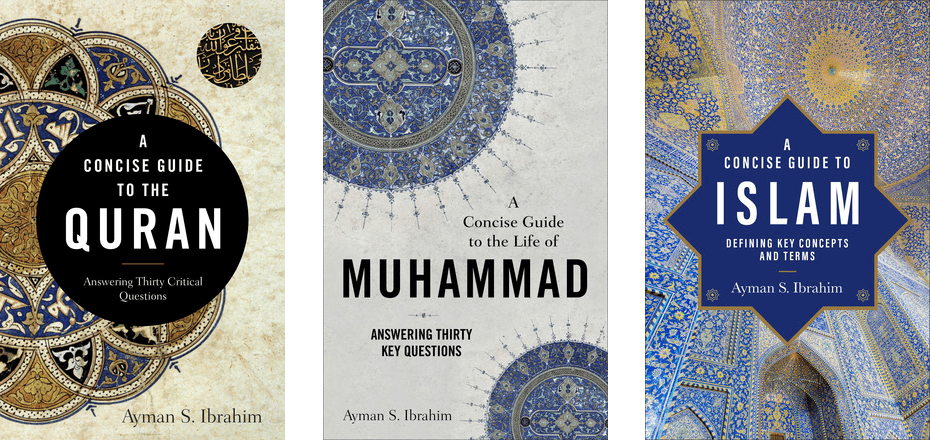
A Concise Guide to the Quran: Answering Thirty Critical Questions. If you want to understand Islam, you’ll need to under the Quran, and that is the heart of this book. Ibrahim asks and answers thirty questions that help explain the origins of the Quran, its central message, and what Muslims believe about it. What is the Quran and what does “Quran” mean? What do Shiite and Sunni Muslims believe about it and in what ways do they differ? What does the Quran say about Jews and Christians? What does it say about Jesus and the Bible? He answers all these questions and many more.
A Concise Guide to the Life of Muhammad: Answering Thirty Key Questions. The focus of this book is, of course, the prophet Muhammad. Ibrahim answers thirty questions that together offer a guide to Muhammad’s life and significance within Islam and the world. Because the book is written specifically for Christians, he asks the kind of questions Christians may be wondering: Who was Muhammad and was he a true historical figure? What do we know about his wives? What was the central message of what he taught and what did he believe about Jesus?
A Concise Guide to Islam: Defining Key Concepts and Terms. The third volume in this series, which will be published in just a few weeks, takes a different approach. Instead of asking and answering questions, it focuses on specific terms that appear within Islam and are commonly used by Muslims. So, for example, Ibrahim begins with terms related to the Islamic scriptures and defines the following: Quran, hadith, sira, sunna, each of which is likely to be familiar to those who have engaged with Muslims. The book can be read from cover to cover or treated more like a reference work where the inquisitive reader simply turns to the term that interests him.
Together, these four books provide a strong foundation for understanding what may soon be the world’s most dominant religion. With Muslims present in every country in the world, including yours and mine, it may be wise for us to be well prepared to share the gospel with them. These books will go a long way to doing just that.
]]> Another month has come and gone. For readers, that means that publishers have released another batch of books. I am in the happy position of receiving most of them, so sorted through the various stacks to arrive at this list of new and notables. In each case, I’ve included the editorial description so you can get a sense of what the book is all about. I hope there’s something here that stands out to you! Reclaiming Masculinity: Seven Biblical Principles for Being the Man God Wants You to Be by Matt Fuller. “In a world where masculinity is often associated with toxicity, what does it mean to ‘be a man’? In a straightforward and empathetic way, Matt Fuller gets beyond cultural confusion and stereotypes as he examines what the Bible says is distinctive about being a man. He outlines a positive vision of biblical masculinity and shows what that might look like in real life today. Men will be encouraged to be sacrificial when leading, to work hard and to protect and invest in others. Whatever your personality and interests—whether you would rather skin a rabbit, read a book or remodel your house—this book will give you confidence and direction to be the man God wants you to be.” (Buy it at Amazon or Westminster Books) The Reformation as Renewal: Retrieving the One, Holy, Catholic, and Apostolic Church by Matthew Barrett. “In the sixteenth century Rome charged the Reformers with novelty, as if they were heretics departing from the catholic (universal) church. But the Reformers…]]>
Another month has come and gone. For readers, that means that publishers have released another batch of books. I am in the happy position of receiving most of them, so sorted through the various stacks to arrive at this list of new and notables. In each case, I’ve included the editorial description so you can get a sense of what the book is all about. I hope there’s something here that stands out to you! Reclaiming Masculinity: Seven Biblical Principles for Being the Man God Wants You to Be by Matt Fuller. “In a world where masculinity is often associated with toxicity, what does it mean to ‘be a man’? In a straightforward and empathetic way, Matt Fuller gets beyond cultural confusion and stereotypes as he examines what the Bible says is distinctive about being a man. He outlines a positive vision of biblical masculinity and shows what that might look like in real life today. Men will be encouraged to be sacrificial when leading, to work hard and to protect and invest in others. Whatever your personality and interests—whether you would rather skin a rabbit, read a book or remodel your house—this book will give you confidence and direction to be the man God wants you to be.” (Buy it at Amazon or Westminster Books) The Reformation as Renewal: Retrieving the One, Holy, Catholic, and Apostolic Church by Matthew Barrett. “In the sixteenth century Rome charged the Reformers with novelty, as if they were heretics departing from the catholic (universal) church. But the Reformers…]]>
Another month has come and gone. For readers, that means that publishers have released another batch of books. I am in the happy position of receiving most of them, so sorted through the various stacks to arrive at this list of new and notables. In each case, I’ve included the editorial description so you can get a sense of what the book is all about. I hope there’s something here that stands out to you!
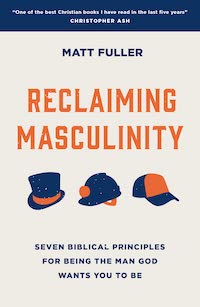 Reclaiming Masculinity: Seven Biblical Principles for Being the Man God Wants You to Be by Matt Fuller. “In a world where masculinity is often associated with toxicity, what does it mean to ‘be a man’? In a straightforward and empathetic way, Matt Fuller gets beyond cultural confusion and stereotypes as he examines what the Bible says is distinctive about being a man. He outlines a positive vision of biblical masculinity and shows what that might look like in real life today. Men will be encouraged to be sacrificial when leading, to work hard and to protect and invest in others. Whatever your personality and interests—whether you would rather skin a rabbit, read a book or remodel your house—this book will give you confidence and direction to be the man God wants you to be.” (Buy it at Amazon or Westminster Books)
Reclaiming Masculinity: Seven Biblical Principles for Being the Man God Wants You to Be by Matt Fuller. “In a world where masculinity is often associated with toxicity, what does it mean to ‘be a man’? In a straightforward and empathetic way, Matt Fuller gets beyond cultural confusion and stereotypes as he examines what the Bible says is distinctive about being a man. He outlines a positive vision of biblical masculinity and shows what that might look like in real life today. Men will be encouraged to be sacrificial when leading, to work hard and to protect and invest in others. Whatever your personality and interests—whether you would rather skin a rabbit, read a book or remodel your house—this book will give you confidence and direction to be the man God wants you to be.” (Buy it at Amazon or Westminster Books)
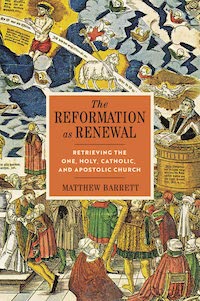 The Reformation as Renewal: Retrieving the One, Holy, Catholic, and Apostolic Church by Matthew Barrett. “In the sixteenth century Rome charged the Reformers with novelty, as if they were heretics departing from the catholic (universal) church. But the Reformers believed they were more catholic than Rome. Distinguishing themselves from Radicals, the Reformers were convinced they were retrieving the faith of the church fathers and the best of the medieval Scholastics. The Reformers saw themselves as faithful stewards of the one, holy, catholic, and apostolic church preserved across history, and they insisted on a restoration of true worship in their own day. By listening to the Reformers’ own voices, The Reformation as Renewal helps readers explore: The Reformation’s roots in patristic and medieval thought and its response to late medieval innovations; Key philosophical and theological differences between Scholasticism in the High Middle Ages and deviations in the Late Middle Ages; The many ways sixteenth and seventeenth century Protestant Scholastics critically appropriated Thomas Aquinas; The Reformation’s response to the charge of novelty by an appeal to the Augustinian tradition; Common caricatures that charge the Reformation with schism or assume the Reformation was the gateway to secularism; The spread of Reformation catholicity across Europe, as seen in first and second-generation leaders from Luther and Melanchthon in Wittenberg to Zwingli and Bullinger in Zurich to Bucer and Calvin in Strasbourg and Geneva to Tyndale, Cranmer, and Jewel in England, and many others; The theology of the Reformers, with special attention on their writings defending the catholicity of the Reformation.” (Buy it at Amazon or Westminster Books)
The Reformation as Renewal: Retrieving the One, Holy, Catholic, and Apostolic Church by Matthew Barrett. “In the sixteenth century Rome charged the Reformers with novelty, as if they were heretics departing from the catholic (universal) church. But the Reformers believed they were more catholic than Rome. Distinguishing themselves from Radicals, the Reformers were convinced they were retrieving the faith of the church fathers and the best of the medieval Scholastics. The Reformers saw themselves as faithful stewards of the one, holy, catholic, and apostolic church preserved across history, and they insisted on a restoration of true worship in their own day. By listening to the Reformers’ own voices, The Reformation as Renewal helps readers explore: The Reformation’s roots in patristic and medieval thought and its response to late medieval innovations; Key philosophical and theological differences between Scholasticism in the High Middle Ages and deviations in the Late Middle Ages; The many ways sixteenth and seventeenth century Protestant Scholastics critically appropriated Thomas Aquinas; The Reformation’s response to the charge of novelty by an appeal to the Augustinian tradition; Common caricatures that charge the Reformation with schism or assume the Reformation was the gateway to secularism; The spread of Reformation catholicity across Europe, as seen in first and second-generation leaders from Luther and Melanchthon in Wittenberg to Zwingli and Bullinger in Zurich to Bucer and Calvin in Strasbourg and Geneva to Tyndale, Cranmer, and Jewel in England, and many others; The theology of the Reformers, with special attention on their writings defending the catholicity of the Reformation.” (Buy it at Amazon or Westminster Books)
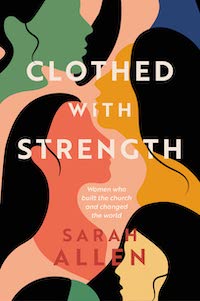 Clothed With Strength: Women Who Built the Church and Changed the World by Sarah Allen. “It’s easy to imagine that Christian women of the past were shrinking violets who were side-lined and excluded from making a difference in the church and in the world. The truth is that God has always raised up strong and courageous women to do his work. You might never have heard of Rebecca Protten, Hannah More, Ellen Raynard and Josephine Butler, but you’ll never forget how God used these four very different women to fight against injustice and poverty and to transform lives. These eighteenth and nineteenth century women worked in partnership with men to shape the evangelical church. Let their stories challenge you and fuel your faith today.” (Buy it at Amazon or Westminster Books)
Clothed With Strength: Women Who Built the Church and Changed the World by Sarah Allen. “It’s easy to imagine that Christian women of the past were shrinking violets who were side-lined and excluded from making a difference in the church and in the world. The truth is that God has always raised up strong and courageous women to do his work. You might never have heard of Rebecca Protten, Hannah More, Ellen Raynard and Josephine Butler, but you’ll never forget how God used these four very different women to fight against injustice and poverty and to transform lives. These eighteenth and nineteenth century women worked in partnership with men to shape the evangelical church. Let their stories challenge you and fuel your faith today.” (Buy it at Amazon or Westminster Books)
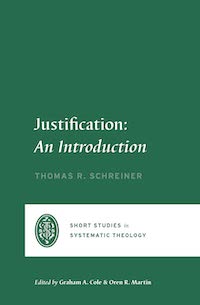 Justification: An Introduction (Short Studies in Systematic Theology) by Thomas Schreiner. “When we see the fallenness of the world, it is often challenging to understand how sinners can stand before a holy God, but the gospel gives hope—justification that comes through Jesus Christ. This doctrine is essential to the gospel but has sparked countless academic and theological disagreements throughout church history, even contributing to the Protestant Reformation in the sixteenth century. In this addition to the Short Studies in Systematic Theology series, Thomas R. Schreiner examines the biblical and historical background of the doctrine of justification. Schreiner explores it throughout church history and analyzes both the Old and New Testament teachings. By examining the relationship between justification and other doctrines of salvation—such as redemption, reconciliation, adoption, and sanctification—Schreiner shows how it gives peace, assurance, and joy to sinners through Jesus and hope for life today.” (Buy it at Amazon or Westminster Books)
Justification: An Introduction (Short Studies in Systematic Theology) by Thomas Schreiner. “When we see the fallenness of the world, it is often challenging to understand how sinners can stand before a holy God, but the gospel gives hope—justification that comes through Jesus Christ. This doctrine is essential to the gospel but has sparked countless academic and theological disagreements throughout church history, even contributing to the Protestant Reformation in the sixteenth century. In this addition to the Short Studies in Systematic Theology series, Thomas R. Schreiner examines the biblical and historical background of the doctrine of justification. Schreiner explores it throughout church history and analyzes both the Old and New Testament teachings. By examining the relationship between justification and other doctrines of salvation—such as redemption, reconciliation, adoption, and sanctification—Schreiner shows how it gives peace, assurance, and joy to sinners through Jesus and hope for life today.” (Buy it at Amazon or Westminster Books)
 Elisabeth Elliot: A Life by Lucy S.R. Austen. “Elisabeth Elliot (1926-2015) is one of the most widely known Christians of the twentieth and twenty-first centuries. After the death of her husband, Jim, and four other missionaries at the hands of Waorani tribesmen in Ecuador, Elliot famously returned to live among the same people who had killed her husband. Her legacy, however, extends far beyond these events. In the years that followed, Elliot became a prolific writer and speaker, touching the lives of countless people around the world. In this single-volume biography, Lucy S. R. Austen takes readers on an in-depth journey through the life of Elisabeth Elliot—her birth to missionary parents, her courtship and marriage to Jim Elliot, her missions work in Ecuador, and her private life and public work after she returned to the United States. Through Elliot’s example of love for God and obedience to his commands, readers will ponder what it means to follow Jesus.” (Buy it at Amazon or Westminster Books)
Elisabeth Elliot: A Life by Lucy S.R. Austen. “Elisabeth Elliot (1926-2015) is one of the most widely known Christians of the twentieth and twenty-first centuries. After the death of her husband, Jim, and four other missionaries at the hands of Waorani tribesmen in Ecuador, Elliot famously returned to live among the same people who had killed her husband. Her legacy, however, extends far beyond these events. In the years that followed, Elliot became a prolific writer and speaker, touching the lives of countless people around the world. In this single-volume biography, Lucy S. R. Austen takes readers on an in-depth journey through the life of Elisabeth Elliot—her birth to missionary parents, her courtship and marriage to Jim Elliot, her missions work in Ecuador, and her private life and public work after she returned to the United States. Through Elliot’s example of love for God and obedience to his commands, readers will ponder what it means to follow Jesus.” (Buy it at Amazon or Westminster Books)
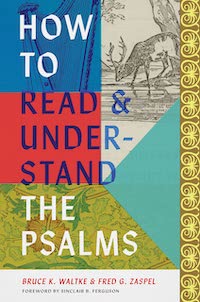 How to Read and Understand the Psalms by Fred Zaspel and Bruce Waltke. “Written over the course of 1,000 years, the book of Psalms is a collection of religious poetry voicing a wide variety of human emotions expressed in different genres–imprecatory psalms, psalms of praise, and more. It has become one of the most popular books of the Bible, but most readers have only a surface level understanding of the Psalms and how it fits into the larger historical and scriptural context. In How to Read and Understand the Psalms, Bruce K. Waltke and Fred G. Zaspel give readers tools to learn how to properly interpret and internalize the Psalms. Developed primarily from decades of lectures by Waltke, they explain the various types of psalms, Hebrew poetry, rhetorical techniques, and more. Armed with these tools, believers will discover how the 150 psalms can further fuel their knowledge and love of God.” (Buy it at Amazon or Westminster Books)
How to Read and Understand the Psalms by Fred Zaspel and Bruce Waltke. “Written over the course of 1,000 years, the book of Psalms is a collection of religious poetry voicing a wide variety of human emotions expressed in different genres–imprecatory psalms, psalms of praise, and more. It has become one of the most popular books of the Bible, but most readers have only a surface level understanding of the Psalms and how it fits into the larger historical and scriptural context. In How to Read and Understand the Psalms, Bruce K. Waltke and Fred G. Zaspel give readers tools to learn how to properly interpret and internalize the Psalms. Developed primarily from decades of lectures by Waltke, they explain the various types of psalms, Hebrew poetry, rhetorical techniques, and more. Armed with these tools, believers will discover how the 150 psalms can further fuel their knowledge and love of God.” (Buy it at Amazon or Westminster Books)
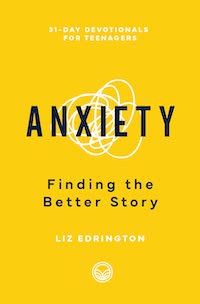 Anxiety: Finding the Better Story (31-Day Devotionals for Teenagers) by Liz Edrington. “Have you ever stood in front of an ocean wave, put your hand out in front of you, and said, ‘Stop, wave!?’ That would be ridiculous! … But have you ever tried the same approach with your anxiety? ‘Stop, anxiety!’ It probably hasn’t worked either. Liz gets it. As a teenager, she was stressed out and trying to survive her anxiety each day. Now that she’s a mental health counselor, she wants to pass on what she’s learned to other teenagers. Just understanding what anxiety is makes a big difference, but what makes an even bigger difference is understanding what God has to say about it. With daily Scripture readings, breathing exercises, and additional mental-health resources, this little book offers you comfort and help in your anxiety. See how your anxiety fits into the big story of your life—and of the whole universe–and learn how Jesus can bring you peace.” (Buy it at Amazon or Westminster Books)
Anxiety: Finding the Better Story (31-Day Devotionals for Teenagers) by Liz Edrington. “Have you ever stood in front of an ocean wave, put your hand out in front of you, and said, ‘Stop, wave!?’ That would be ridiculous! … But have you ever tried the same approach with your anxiety? ‘Stop, anxiety!’ It probably hasn’t worked either. Liz gets it. As a teenager, she was stressed out and trying to survive her anxiety each day. Now that she’s a mental health counselor, she wants to pass on what she’s learned to other teenagers. Just understanding what anxiety is makes a big difference, but what makes an even bigger difference is understanding what God has to say about it. With daily Scripture readings, breathing exercises, and additional mental-health resources, this little book offers you comfort and help in your anxiety. See how your anxiety fits into the big story of your life—and of the whole universe–and learn how Jesus can bring you peace.” (Buy it at Amazon or Westminster Books)
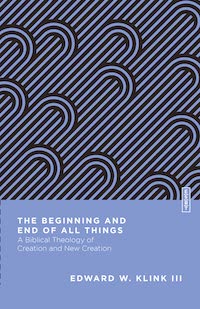 The Beginning and End of All Things: A Biblical Theology of Creation and New Creation by Edward Klink III. “Many Christians think of the doctrine of creation primarily as relating to the world’s origins. In The Beginning and End of All Things, Edward W. Klink III presents a more holistic understanding of creation–a story that is unfolded throughout all of Scripture and is at the core of the gospel itself. From beginning to end, the theme of creation and new creation not only directs the movement of the entire biblical story but also unifies its message. Klink explores the goodness of the physical world and how it will be perfected in the new creation of heaven and earth. Along with offering rich insights about God and his purposes for the world, a biblical theology of creation guides how we engage nature, culture, and life as embodied beings. Essential Studies in Biblical Theology (ESBT), edited by Benjamin L. Gladd, explore the central or essential themes of the Bible’s grand storyline. Taking cues from Genesis 1-3, authors trace the presence of these themes throughout the entire sweep of redemptive history. Written for students, church leaders, and laypeople, the ESBT offers an introduction to biblical theology.” (Buy it at Amazon or Westminster Books)
The Beginning and End of All Things: A Biblical Theology of Creation and New Creation by Edward Klink III. “Many Christians think of the doctrine of creation primarily as relating to the world’s origins. In The Beginning and End of All Things, Edward W. Klink III presents a more holistic understanding of creation–a story that is unfolded throughout all of Scripture and is at the core of the gospel itself. From beginning to end, the theme of creation and new creation not only directs the movement of the entire biblical story but also unifies its message. Klink explores the goodness of the physical world and how it will be perfected in the new creation of heaven and earth. Along with offering rich insights about God and his purposes for the world, a biblical theology of creation guides how we engage nature, culture, and life as embodied beings. Essential Studies in Biblical Theology (ESBT), edited by Benjamin L. Gladd, explore the central or essential themes of the Bible’s grand storyline. Taking cues from Genesis 1-3, authors trace the presence of these themes throughout the entire sweep of redemptive history. Written for students, church leaders, and laypeople, the ESBT offers an introduction to biblical theology.” (Buy it at Amazon or Westminster Books)
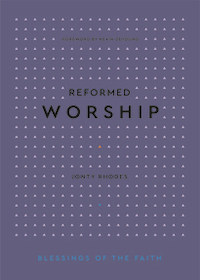 Reformed Worship by Jonty Rhodes. “Have you ever woken up on a Sunday morning and wondered if it was worth getting out of bed? Have you wondered why you should bother to attend corporate worship every week? Unfortunately, it can be easy to miss the excitement of corporate worship–but the excitement is there. Because God is all-sufficient, he commands worship for his glory but our gain! A Reformed view of worship is shaped by God’s Word and has the gospel as its context: God desires to meet with his people, and that meeting comes only in and through Christ, by the Holy Spirit. Jesus is our worship leader, and as our prophet, priest and king he teaches us what worship should look like. Writing with winsome enthusiasm, Jonty Rhodes celebrates the simplicity and freedom of Reformed worship and shows readers the joys of meeting with God in the means and manner he promises to bless.” (Buy it at Amazon or Westminster Books)
Reformed Worship by Jonty Rhodes. “Have you ever woken up on a Sunday morning and wondered if it was worth getting out of bed? Have you wondered why you should bother to attend corporate worship every week? Unfortunately, it can be easy to miss the excitement of corporate worship–but the excitement is there. Because God is all-sufficient, he commands worship for his glory but our gain! A Reformed view of worship is shaped by God’s Word and has the gospel as its context: God desires to meet with his people, and that meeting comes only in and through Christ, by the Holy Spirit. Jesus is our worship leader, and as our prophet, priest and king he teaches us what worship should look like. Writing with winsome enthusiasm, Jonty Rhodes celebrates the simplicity and freedom of Reformed worship and shows readers the joys of meeting with God in the means and manner he promises to bless.” (Buy it at Amazon or Westminster Books)
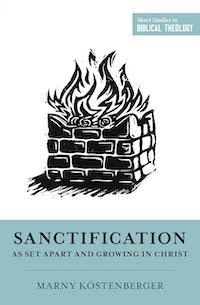 Sanctification as Set Apart and Growing in Christ by Margaret Elizabeth Köstenberger. “The entire biblical narrative declares the righteousness of God and the consecration of his people. In this book, Marny Köstenberger explores the topic of sanctification―being set apart by God for holiness. Surveying the Bible from beginning to end, Köstenberger shows that sanctification is grounded in the eternal holiness of God, who created humanity in his image. Now, in Christ, the Spirit sets believers apart and restores them to the original image. Sanctification often takes place in the midst of suffering and equips believers for their God-given mission.” (Buy it at Amazon or Westminster Books)
Sanctification as Set Apart and Growing in Christ by Margaret Elizabeth Köstenberger. “The entire biblical narrative declares the righteousness of God and the consecration of his people. In this book, Marny Köstenberger explores the topic of sanctification―being set apart by God for holiness. Surveying the Bible from beginning to end, Köstenberger shows that sanctification is grounded in the eternal holiness of God, who created humanity in his image. Now, in Christ, the Spirit sets believers apart and restores them to the original image. Sanctification often takes place in the midst of suffering and equips believers for their God-given mission.” (Buy it at Amazon or Westminster Books)
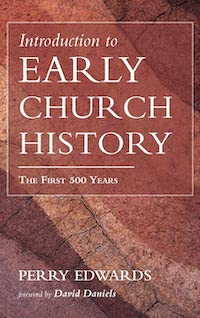 Introduction to Early Church History: The First 500 Years by Perry Edwards. “As an introduction to early church history, this book is not intended to cover any subject exhaustively. Its goal is to provide an overview of the most significant leaders of the church while adding stories of ordinary Christians who remained faithful to the Lord in the face of persecution. It will introduce readers to how the church, in its first five centuries, sought to answer the primary theological questions of the day. This book is meant to whet the appetite of those who have never read early church history and refresh the minds of those who have. For some, the reading of this book will be the beginning of a journey that will lead to a deep and abiding love for the history of God’s sovereign working in the church and in the world.” (Buy it at Amazon)
Introduction to Early Church History: The First 500 Years by Perry Edwards. “As an introduction to early church history, this book is not intended to cover any subject exhaustively. Its goal is to provide an overview of the most significant leaders of the church while adding stories of ordinary Christians who remained faithful to the Lord in the face of persecution. It will introduce readers to how the church, in its first five centuries, sought to answer the primary theological questions of the day. This book is meant to whet the appetite of those who have never read early church history and refresh the minds of those who have. For some, the reading of this book will be the beginning of a journey that will lead to a deep and abiding love for the history of God’s sovereign working in the church and in the world.” (Buy it at Amazon)
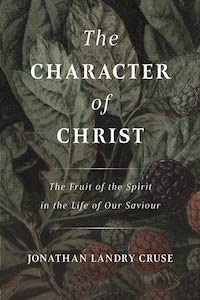 The Character of Christ: The Fruit of the Spirit in the Life of Our Saviour by Jonathan Landry Cruse. “Most experienced Christians are familiar with the fruit of the Spirit listed in Galatians. Love, peace, patience, and so on are often considered both gracious marks of true Christian character and ideals to aim for. But what do they look like when lived to the fullest? This book answers this question by studying the fullness of the fruit of the Spirit in the life of Christ. In a warm and engaging style, Jonathan Landry Cruse examines these godly attributes in the Lord’s example, comparing them with our own faltering efforts at holiness, and shows that we can only bear true fruit for God by our union to the life-giving Vine. The work is God’s, not ours – and this is good news for all those who yearn for greater sanctification.” (Buy it at Amazon)
The Character of Christ: The Fruit of the Spirit in the Life of Our Saviour by Jonathan Landry Cruse. “Most experienced Christians are familiar with the fruit of the Spirit listed in Galatians. Love, peace, patience, and so on are often considered both gracious marks of true Christian character and ideals to aim for. But what do they look like when lived to the fullest? This book answers this question by studying the fullness of the fruit of the Spirit in the life of Christ. In a warm and engaging style, Jonathan Landry Cruse examines these godly attributes in the Lord’s example, comparing them with our own faltering efforts at holiness, and shows that we can only bear true fruit for God by our union to the life-giving Vine. The work is God’s, not ours – and this is good news for all those who yearn for greater sanctification.” (Buy it at Amazon)
 Though May has come and gone, it proved to be a good month for Christian book releases. I sorted through the stacks that landed on my desk and arrived at this list of new and notables. In each case I’ve provided the editorial description to give you a sense of what it’s all about. I hope there’s something here that catches your eye! ESV Teen Study Bible. The new ESV Teen Study Bible is targeted at teens from 14 to 18 years of age and is available in a variety of cover styles and treatments. “Our world today pushes an endless number of distractions and temptations, which is why having faithful and accessible biblical resources for teens is more important than ever. Edited by pastor Jon Nielson, the ESV Teen Study Bible features numerous study and resource materials–including 12,000 accessible study notes adapted from the ESV Concise Study Bible, 365 devotions adapted from God’s Great Story by Jon Nielson, and 200 sidebars defining key doctrines and helping teens apply Scripture to their own lives. It also has full-page introductions for each biblical book, more than 150 maps and illustrations, an extensive glossary and concordance, and over a dozen topical articles. These features help facilitate deep engagement with the Scriptures, impacting the minds, hearts, and lives of teen followers of Christ.” (Buy it at Amazon or Westminster Books) Knowing God’s Truth: An Introduction to Systematic Theology by Jon Nielson. And speaking of Jon Nielson, here’s another new resource with his name on it. Note that there…]]>
Though May has come and gone, it proved to be a good month for Christian book releases. I sorted through the stacks that landed on my desk and arrived at this list of new and notables. In each case I’ve provided the editorial description to give you a sense of what it’s all about. I hope there’s something here that catches your eye! ESV Teen Study Bible. The new ESV Teen Study Bible is targeted at teens from 14 to 18 years of age and is available in a variety of cover styles and treatments. “Our world today pushes an endless number of distractions and temptations, which is why having faithful and accessible biblical resources for teens is more important than ever. Edited by pastor Jon Nielson, the ESV Teen Study Bible features numerous study and resource materials–including 12,000 accessible study notes adapted from the ESV Concise Study Bible, 365 devotions adapted from God’s Great Story by Jon Nielson, and 200 sidebars defining key doctrines and helping teens apply Scripture to their own lives. It also has full-page introductions for each biblical book, more than 150 maps and illustrations, an extensive glossary and concordance, and over a dozen topical articles. These features help facilitate deep engagement with the Scriptures, impacting the minds, hearts, and lives of teen followers of Christ.” (Buy it at Amazon or Westminster Books) Knowing God’s Truth: An Introduction to Systematic Theology by Jon Nielson. And speaking of Jon Nielson, here’s another new resource with his name on it. Note that there…]]>
Though May has come and gone, it proved to be a good month for Christian book releases. I sorted through the stacks that landed on my desk and arrived at this list of new and notables. In each case I’ve provided the editorial description to give you a sense of what it’s all about. I hope there’s something here that catches your eye!
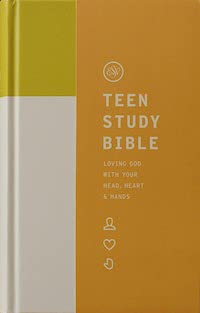 ESV Teen Study Bible. The new ESV Teen Study Bible is targeted at teens from 14 to 18 years of age and is available in a variety of cover styles and treatments. “Our world today pushes an endless number of distractions and temptations, which is why having faithful and accessible biblical resources for teens is more important than ever. Edited by pastor Jon Nielson, the ESV Teen Study Bible features numerous study and resource materials–including 12,000 accessible study notes adapted from the ESV Concise Study Bible, 365 devotions adapted from God’s Great Story by Jon Nielson, and 200 sidebars defining key doctrines and helping teens apply Scripture to their own lives. It also has full-page introductions for each biblical book, more than 150 maps and illustrations, an extensive glossary and concordance, and over a dozen topical articles. These features help facilitate deep engagement with the Scriptures, impacting the minds, hearts, and lives of teen followers of Christ.” (Buy it at Amazon or Westminster Books)
ESV Teen Study Bible. The new ESV Teen Study Bible is targeted at teens from 14 to 18 years of age and is available in a variety of cover styles and treatments. “Our world today pushes an endless number of distractions and temptations, which is why having faithful and accessible biblical resources for teens is more important than ever. Edited by pastor Jon Nielson, the ESV Teen Study Bible features numerous study and resource materials–including 12,000 accessible study notes adapted from the ESV Concise Study Bible, 365 devotions adapted from God’s Great Story by Jon Nielson, and 200 sidebars defining key doctrines and helping teens apply Scripture to their own lives. It also has full-page introductions for each biblical book, more than 150 maps and illustrations, an extensive glossary and concordance, and over a dozen topical articles. These features help facilitate deep engagement with the Scriptures, impacting the minds, hearts, and lives of teen followers of Christ.” (Buy it at Amazon or Westminster Books)
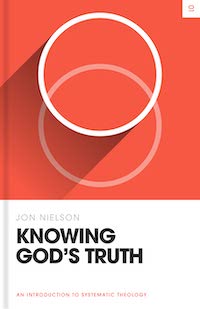 Knowing God’s Truth: An Introduction to Systematic Theology by Jon Nielson. And speaking of Jon Nielson, here’s another new resource with his name on it. Note that there is both an optional workbook and DVD to go with it. “When you consider theology, you may think of confusing, lofty terminology that only concerns scholars and pastors. But in reality, theology is for anyone who wants to better understand God and learn more about the Bible. Theology—the study of God and his word—should be personal, accessible, and worshipful. Pastor Jon Nielson has written Knowing God’s Truth, a part of the Theology Basics suite, to make systematic theology clear, meaningful, and practical for those looking for a highly accessible guide to studying God. In this introduction, Nielson defines systematic theology as “theological study done in a highly organized, topical way” and covers the 12 basic categories—Scripture, man, sin, church, and more. He also helps readers learn to apply theology in their everyday lives by integrating invitations to pray and meditate on what they’ve learned.” (Buy it at Amazon or Westminster Books)
Knowing God’s Truth: An Introduction to Systematic Theology by Jon Nielson. And speaking of Jon Nielson, here’s another new resource with his name on it. Note that there is both an optional workbook and DVD to go with it. “When you consider theology, you may think of confusing, lofty terminology that only concerns scholars and pastors. But in reality, theology is for anyone who wants to better understand God and learn more about the Bible. Theology—the study of God and his word—should be personal, accessible, and worshipful. Pastor Jon Nielson has written Knowing God’s Truth, a part of the Theology Basics suite, to make systematic theology clear, meaningful, and practical for those looking for a highly accessible guide to studying God. In this introduction, Nielson defines systematic theology as “theological study done in a highly organized, topical way” and covers the 12 basic categories—Scripture, man, sin, church, and more. He also helps readers learn to apply theology in their everyday lives by integrating invitations to pray and meditate on what they’ve learned.” (Buy it at Amazon or Westminster Books)
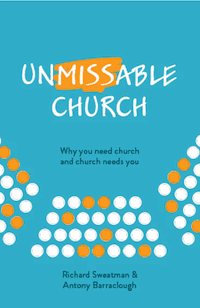 Unmissable Church: Why You Need Church and Church Needs You by Richard Sweatman & Antony Barraclough. “Modern life is a constant struggle between competing priorities, and for Christians especially so on Sundays. How can we juggle all the demands on our time and still make church a priority? Why is there sometimes such a disconnect between the Bible’s captivating vision for church and our experience of it? In Unmissable Church, Antony Barraclough and Richard Sweatman combine meticulous research, practical advice and pastoral warmth. They explore the reasons why it’s sometimes difficult to make it to church and what we can do about it. The issues of broken relationships, conflicting priorities, health concerns and more are treated with empathy and encouragement. Whether you are a leader looking to understand what’s keeping people away from church, a regular attender who wants to encourage others to gather more often, or someone who finds weekly attendance a challenge, this book will bring you greater clarity and perspective.” (Buy it at Amazon or Matthias Media)
Unmissable Church: Why You Need Church and Church Needs You by Richard Sweatman & Antony Barraclough. “Modern life is a constant struggle between competing priorities, and for Christians especially so on Sundays. How can we juggle all the demands on our time and still make church a priority? Why is there sometimes such a disconnect between the Bible’s captivating vision for church and our experience of it? In Unmissable Church, Antony Barraclough and Richard Sweatman combine meticulous research, practical advice and pastoral warmth. They explore the reasons why it’s sometimes difficult to make it to church and what we can do about it. The issues of broken relationships, conflicting priorities, health concerns and more are treated with empathy and encouragement. Whether you are a leader looking to understand what’s keeping people away from church, a regular attender who wants to encourage others to gather more often, or someone who finds weekly attendance a challenge, this book will bring you greater clarity and perspective.” (Buy it at Amazon or Matthias Media)
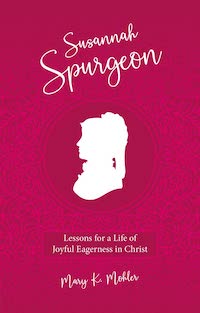 Susannah Spurgeon: Lessons for a Life of Joyful Eagerness in Christ by Mary Mohler. “Have you heard of Spurgeon? Preacher, evangelist and stalwart patriarch of the Modern Western Church today. If the cliché ‘behind every great man is a strong woman’, is true, then Susannah Spurgeon remains one of the matriarchs of the same tradition. Spurgeon was the bone companion of her husband. As a pastoral assistant, as Charles’ wife and support through trials, this woman’s biography has been a long time coming. Mary Mohler has gathered information on Susie from sources spanning letters, devotionals and biographies. The result is a thoughtful, sympathetic and endearing epitaph to a sister in Christ, whose voice can no longer be ignored. Mohler allows room for academics, mothers, daughters and wives to dwell on Spurgeon’s joyful eagerness in Christ.” (Buy it at Amazon or Westminster Books)
Susannah Spurgeon: Lessons for a Life of Joyful Eagerness in Christ by Mary Mohler. “Have you heard of Spurgeon? Preacher, evangelist and stalwart patriarch of the Modern Western Church today. If the cliché ‘behind every great man is a strong woman’, is true, then Susannah Spurgeon remains one of the matriarchs of the same tradition. Spurgeon was the bone companion of her husband. As a pastoral assistant, as Charles’ wife and support through trials, this woman’s biography has been a long time coming. Mary Mohler has gathered information on Susie from sources spanning letters, devotionals and biographies. The result is a thoughtful, sympathetic and endearing epitaph to a sister in Christ, whose voice can no longer be ignored. Mohler allows room for academics, mothers, daughters and wives to dwell on Spurgeon’s joyful eagerness in Christ.” (Buy it at Amazon or Westminster Books)
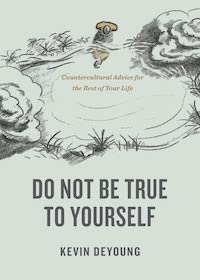 Do Not Be True to Yourself: Countercultural Advice for the Rest of Your Life by Kevin DeYoung. “Most speeches addressed to high school and college students follow a similar theme: march to the beat of your own drum. This may sound encouraging on the surface, but Scripture exhorts believers to submit their lives to the will of God, not their own desires. Christian students need gospel-centered truth to guide them on their journey toward independence. In this collection of inspiring sermons and graduation speeches, Kevin DeYoung delivers a motivational, biblical call to young people: serve God faithfully—and if necessary, counter-culturally—in the next season of your life. Do Not Be True to Yourself includes practical advice for cultivating a Christ-centered worldview in every area of adult life, including relationships, work, church participation, and spiritual growth, making it a transformational resource for mentoring students.” (Buy it at Amazon or Westminster Books)
Do Not Be True to Yourself: Countercultural Advice for the Rest of Your Life by Kevin DeYoung. “Most speeches addressed to high school and college students follow a similar theme: march to the beat of your own drum. This may sound encouraging on the surface, but Scripture exhorts believers to submit their lives to the will of God, not their own desires. Christian students need gospel-centered truth to guide them on their journey toward independence. In this collection of inspiring sermons and graduation speeches, Kevin DeYoung delivers a motivational, biblical call to young people: serve God faithfully—and if necessary, counter-culturally—in the next season of your life. Do Not Be True to Yourself includes practical advice for cultivating a Christ-centered worldview in every area of adult life, including relationships, work, church participation, and spiritual growth, making it a transformational resource for mentoring students.” (Buy it at Amazon or Westminster Books)
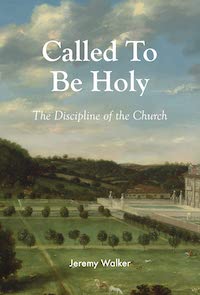 Called to Be Holy: The Discipline of the Church by Jeremy Walker. “Discipline is not a dirty word. Any group which is united and effective embraces discipline to promote the health and strength of the group as a whole and its survival over time. The same is true of the church of Jesus Christ, serving and striving together so that Christ is formed in every member. This booklet is a concise summary of the principles and the practices Christ has given for the holiness of his church. Jeremy Walker skillfully explains the assumptions that lie behind church discipline, grounded in the identity of the church and activity of the church of God. The text looks at the God-ordained purposes of corrective discipline, and the reasons why a church might have to pursue this course. Called to Be Holy offers practical advice as to how such discipline ought to be carried out in the church of Jesus Christ, it speaks to the nature of church discipline, in its more positive and negative aspects, and it identifies love as the primary motive behind any discipline in the church. Ultimately, the church of the living God needs to respond righteously when there is sin in her midst. God has not left us alone in this! Wisely and graciously, the Head of the church has told us how and why the church must discipline unrepentant sin.” (Buy it at Amazon)
Called to Be Holy: The Discipline of the Church by Jeremy Walker. “Discipline is not a dirty word. Any group which is united and effective embraces discipline to promote the health and strength of the group as a whole and its survival over time. The same is true of the church of Jesus Christ, serving and striving together so that Christ is formed in every member. This booklet is a concise summary of the principles and the practices Christ has given for the holiness of his church. Jeremy Walker skillfully explains the assumptions that lie behind church discipline, grounded in the identity of the church and activity of the church of God. The text looks at the God-ordained purposes of corrective discipline, and the reasons why a church might have to pursue this course. Called to Be Holy offers practical advice as to how such discipline ought to be carried out in the church of Jesus Christ, it speaks to the nature of church discipline, in its more positive and negative aspects, and it identifies love as the primary motive behind any discipline in the church. Ultimately, the church of the living God needs to respond righteously when there is sin in her midst. God has not left us alone in this! Wisely and graciously, the Head of the church has told us how and why the church must discipline unrepentant sin.” (Buy it at Amazon)
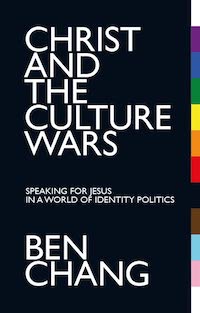 Christ and the Culture Wars: Speaking for Jesus in a World of Identity Politics by Benjamin Chang. “In our modern world the gospel of Jesus is seen by many less as good news for all humanity, and more as the bigoted edicts of a bygone era. Benjamin Chang explores the stories of the revolution, tracing the trajectories of four of the biggest social justice movements—feminism, racial justice, gay pride and the trans movement—before looking at the ways Christians usually engage with these arenas of cultural conflict (mirror, argue, ignore) and identifying a better way forward. Rather than hunkering down in our own identity tribes, arguing against other groups, or ignoring what is going on in the culture around us, Chang encourages Christians to find ways to speak for Jesus. He urges us to look at the way we tell stories, and consider whether we can re-capture hearts in our culture by telling a more powerful counter-narrative. He gives us language to use to speak about the cross in our world of identity politics. We will see that the gospel resonates with a culture when it speaks the language of the culture.” (Buy it at Amazon or Westminster Books)
Christ and the Culture Wars: Speaking for Jesus in a World of Identity Politics by Benjamin Chang. “In our modern world the gospel of Jesus is seen by many less as good news for all humanity, and more as the bigoted edicts of a bygone era. Benjamin Chang explores the stories of the revolution, tracing the trajectories of four of the biggest social justice movements—feminism, racial justice, gay pride and the trans movement—before looking at the ways Christians usually engage with these arenas of cultural conflict (mirror, argue, ignore) and identifying a better way forward. Rather than hunkering down in our own identity tribes, arguing against other groups, or ignoring what is going on in the culture around us, Chang encourages Christians to find ways to speak for Jesus. He urges us to look at the way we tell stories, and consider whether we can re-capture hearts in our culture by telling a more powerful counter-narrative. He gives us language to use to speak about the cross in our world of identity politics. We will see that the gospel resonates with a culture when it speaks the language of the culture.” (Buy it at Amazon or Westminster Books)
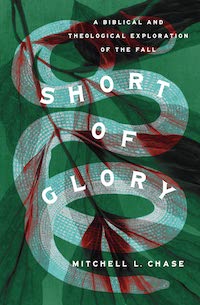 Short of Glory: A Biblical and Theological Exploration of the Fall by Mitchell L. Chase. “When looking around at the world, it is easy to see that all is not as it should be. This brokenness within the world and humanity finds its roots in mankind’s rebellion against God. The fall, as recorded in Genesis 3, sets the stage for creation’s need for redemption—ultimately found in Jesus Christ. In this book, pastor and professor Mitchell Chase argues that in order to understand the fall and recognize its profound impact on later Scripture and the world today, Christians must first understand Genesis 3. Chase identifies themes found in Genesis 3—temptation, shame, messianic hope, and more—and shows how they reverberate throughout the rest of the storyline of Scripture. Understanding Adam and Eve’s fall is crucial to understanding the world as it currently is and the need for redemption through Jesus.” (Buy it at Amazon or Westminster Books)
Short of Glory: A Biblical and Theological Exploration of the Fall by Mitchell L. Chase. “When looking around at the world, it is easy to see that all is not as it should be. This brokenness within the world and humanity finds its roots in mankind’s rebellion against God. The fall, as recorded in Genesis 3, sets the stage for creation’s need for redemption—ultimately found in Jesus Christ. In this book, pastor and professor Mitchell Chase argues that in order to understand the fall and recognize its profound impact on later Scripture and the world today, Christians must first understand Genesis 3. Chase identifies themes found in Genesis 3—temptation, shame, messianic hope, and more—and shows how they reverberate throughout the rest of the storyline of Scripture. Understanding Adam and Eve’s fall is crucial to understanding the world as it currently is and the need for redemption through Jesus.” (Buy it at Amazon or Westminster Books)
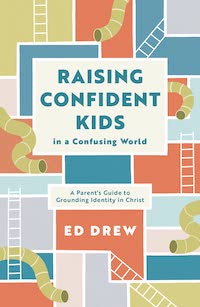 Raising Confident Kids in a Confusing World: A Parent’s Guide to Grounding Identity in Christ by Ed Drew. “As our children grow up, they hear many conflicting messages about who they are. They are told that they can define themselves by their achievements or popularity, or by how they feel, and that sexuality, morality and gender are just questions of personal choice. Too often, Christian parents feel nervous and intimidated about engaging with their children on the subjects of bodies, gender, sexuality and their sense of self. This warm and realistic book helps parents to show their children that the Bible has better answers than our culture on these topics, which are neither surprising nor confusing to our creator God. Full of biblical truth, practical wisdom and discussion questions, this book will inspire and equip parents to help their children find their identity in being made and loved by Jesus. An identity based on God’s love will help Children to have both a positive and a realistic view of themselves, and it will give them confidence to live by faith in a secular world.” (Buy it at Amazon or Westminster Books)
Raising Confident Kids in a Confusing World: A Parent’s Guide to Grounding Identity in Christ by Ed Drew. “As our children grow up, they hear many conflicting messages about who they are. They are told that they can define themselves by their achievements or popularity, or by how they feel, and that sexuality, morality and gender are just questions of personal choice. Too often, Christian parents feel nervous and intimidated about engaging with their children on the subjects of bodies, gender, sexuality and their sense of self. This warm and realistic book helps parents to show their children that the Bible has better answers than our culture on these topics, which are neither surprising nor confusing to our creator God. Full of biblical truth, practical wisdom and discussion questions, this book will inspire and equip parents to help their children find their identity in being made and loved by Jesus. An identity based on God’s love will help Children to have both a positive and a realistic view of themselves, and it will give them confidence to live by faith in a secular world.” (Buy it at Amazon or Westminster Books)
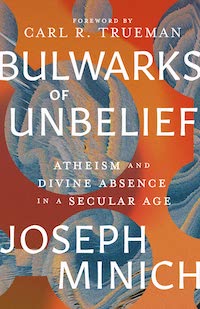 Bulwarks of Unbelief: Atheism and Divine Absence in a Secular Age by Joseph Minich. “Millions of people in the West identify as atheists. Christians often respond to this reality with proofs of God’s existence, as though rational arguments for atheism were the root cause of unbelief. In Bulwarks of Unbelief, Joseph Minich argues that a felt absence of God, as experienced by the modern individual, offers a better explanation for the rise in atheism. Recent technological and cultural shifts in the modern West have produced a perceived challenge to God’s existence. As modern technoculture reshapes our awareness of reality and belief in the invisible, it in turn amplifies God’s apparent silence. In this new context, atheism is a natural result. And absent of meaning from without, we have turned within. Christians cannot escape this aspect of modern life. Minich argues that we must consciously and actively return to reality. If we reattune ourselves to God’s story, reintegrate the whole person, and reinhabit the world, faith can thrive in this age of unbelief.” (Buy it at Amazon or Westminster Books)
Bulwarks of Unbelief: Atheism and Divine Absence in a Secular Age by Joseph Minich. “Millions of people in the West identify as atheists. Christians often respond to this reality with proofs of God’s existence, as though rational arguments for atheism were the root cause of unbelief. In Bulwarks of Unbelief, Joseph Minich argues that a felt absence of God, as experienced by the modern individual, offers a better explanation for the rise in atheism. Recent technological and cultural shifts in the modern West have produced a perceived challenge to God’s existence. As modern technoculture reshapes our awareness of reality and belief in the invisible, it in turn amplifies God’s apparent silence. In this new context, atheism is a natural result. And absent of meaning from without, we have turned within. Christians cannot escape this aspect of modern life. Minich argues that we must consciously and actively return to reality. If we reattune ourselves to God’s story, reintegrate the whole person, and reinhabit the world, faith can thrive in this age of unbelief.” (Buy it at Amazon or Westminster Books)
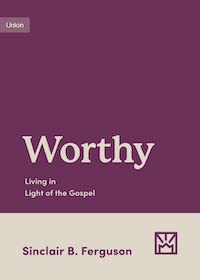 Worthy: Living in Light of the Gospel by Sinclair Ferguson. “While Jesus offers forgiveness for believers who sin, Scripture makes it clear that Christians are to pursue obedience and holiness. So what does it mean to walk in a manner that’s “worthy of the gospel of Christ” (Phil. 1:27), and how should that look in the life of a Christ follower? In this short, accessible guide, theologian Sinclair Ferguson explains the importance of living worthy of the gospel, why the principle is often forgotten, and how it’s cultivated. Clarifying the difference between biblical obedience and legalism, Ferguson exhorts believers to pursue Christlikeness, offering practical examples from Scripture. The second book of the Growing Gospel Integrity series, Worthy helps Christians, students, pastors, and those preparing for ministry to live as citizens of heaven rather than citizens of the world.” (Buy it at Amazon or Westminster Books)
Worthy: Living in Light of the Gospel by Sinclair Ferguson. “While Jesus offers forgiveness for believers who sin, Scripture makes it clear that Christians are to pursue obedience and holiness. So what does it mean to walk in a manner that’s “worthy of the gospel of Christ” (Phil. 1:27), and how should that look in the life of a Christ follower? In this short, accessible guide, theologian Sinclair Ferguson explains the importance of living worthy of the gospel, why the principle is often forgotten, and how it’s cultivated. Clarifying the difference between biblical obedience and legalism, Ferguson exhorts believers to pursue Christlikeness, offering practical examples from Scripture. The second book of the Growing Gospel Integrity series, Worthy helps Christians, students, pastors, and those preparing for ministry to live as citizens of heaven rather than citizens of the world.” (Buy it at Amazon or Westminster Books)
 I have given behind-the-scenes looks at book endorsements and conference speaking and thought I’d wrap up this little series with a look at publishing. I’m familiar only with Christian books so will keep my comments focused on that small corner of a much larger industry. From my perspective, here’s a look at how Christian publishing works. Agents Most authors are represented by a literary agent. This is an individual who represents authors to publishers in return for a percentage of the profits (typically around 15%). Authors will usually sign an exclusive contract with a particular agent for a set period of time. This contract means they can only write books for which that agent has represented them. Some publishers prefer not to work with agents (typically smaller ones) while others will only work with agents (typically larger ones). At their best, agents add a lot of value to the publishing industry by matching authors with the best publishers for their books and by helping authors get the best terms from the publishers. They also suggest ideas and topics to authors, help shape proposals, provide advice on contracts, and may even be involved in suggesting strategies for marketing, and so on. There are a lot of good and credible agents and agencies. Unfortunately there are some poor ones as well who will take advantage of prospective authors. Authors should do their homework and, if approached by an agent, ask for references. (Please don’t ask me to refer you to an agent as I cannot and will…]]>
I have given behind-the-scenes looks at book endorsements and conference speaking and thought I’d wrap up this little series with a look at publishing. I’m familiar only with Christian books so will keep my comments focused on that small corner of a much larger industry. From my perspective, here’s a look at how Christian publishing works. Agents Most authors are represented by a literary agent. This is an individual who represents authors to publishers in return for a percentage of the profits (typically around 15%). Authors will usually sign an exclusive contract with a particular agent for a set period of time. This contract means they can only write books for which that agent has represented them. Some publishers prefer not to work with agents (typically smaller ones) while others will only work with agents (typically larger ones). At their best, agents add a lot of value to the publishing industry by matching authors with the best publishers for their books and by helping authors get the best terms from the publishers. They also suggest ideas and topics to authors, help shape proposals, provide advice on contracts, and may even be involved in suggesting strategies for marketing, and so on. There are a lot of good and credible agents and agencies. Unfortunately there are some poor ones as well who will take advantage of prospective authors. Authors should do their homework and, if approached by an agent, ask for references. (Please don’t ask me to refer you to an agent as I cannot and will…]]>
I have given behind-the-scenes looks at book endorsements and conference speaking and thought I’d wrap up this little series with a look at publishing. I’m familiar only with Christian books so will keep my comments focused on that small corner of a much larger industry. From my perspective, here’s a look at how Christian publishing works.
Agents
Most authors are represented by a literary agent. This is an individual who represents authors to publishers in return for a percentage of the profits (typically around 15%). Authors will usually sign an exclusive contract with a particular agent for a set period of time. This contract means they can only write books for which that agent has represented them. Some publishers prefer not to work with agents (typically smaller ones) while others will only work with agents (typically larger ones). At their best, agents add a lot of value to the publishing industry by matching authors with the best publishers for their books and by helping authors get the best terms from the publishers. They also suggest ideas and topics to authors, help shape proposals, provide advice on contracts, and may even be involved in suggesting strategies for marketing, and so on.
There are a lot of good and credible agents and agencies. Unfortunately there are some poor ones as well who will take advantage of prospective authors. Authors should do their homework and, if approached by an agent, ask for references. (Please don’t ask me to refer you to an agent as I cannot and will not do that!)
Many publishers will accept proposals from authors who are not represented by agents, but typically this process takes longer and has a lower chance of success. The exception, of course, is when the author has a personal relationship with someone within the publishing company. As always, a lot comes down to who you know.
Money
Some Christian publishers are businesses and some are ministries. But in either case, they need to at least break even. This means there are almost always financial terms involved with the publication of a book. There are generally two major negotiable financial components to a contract. The first is the royalty and the second is the advance.
The royalty is the percentage of the book’s sale price that the author will receive. This is based on the wholesale rather than the retail price, so usually around half of what you might pay in the store. Often there are gradations so that royalties on the first X copies are fairly low, but then they increase as more copies sell. (X might be 10,000 for a small book or 100,000 for a major book.) An average royalty on a softcover or hardcover book might be 20% or so. When you consider that most Christian books sell fewer than 10,000 copies, yet take months to write, you can see that very few people can make a living as a Christian author.
The advance is the amount the author will be paid before the publication of the book—often one part of the advance when the contract is signed and the remaining portion when the manuscript is complete and accepted by the publisher. It is important to note that this is actually an advance against royalties which means that the author will receive no royalty payments until he has “paid back” the advance through royalties the book has earned. A first-time Christian author might get an advance of $5,000, though some publishers do not offer them at all. A major Christian author might get many multiples of that.
Of course there can be a host of other factors that are written into contracts—film rights for works of fiction, different rates for audiobooks depending on whether the author reads it or turns it over to a hired professional, foreign translation rates, future paperback editions, and so on.
One way to understand publishing is to see at it as a balancing of risk, with two parties each wanting the other to accept the higher risk. Authors have to invest a lot of effort in writing a book that may not earn back their investment in time, effort, and expertise. Publishers have to invest a lot of effort in acquiring, editing, and printing a book that may not earn back their financial investment. Hence authors will push for a high advance and high royalty while publishers will push low.
Some authors write books on behalf of their ministries and have the proceeds absorbed by them. Others write books personally and keep the proceeds as income.
Most publishers send royalty reports (and potentially royalty payments) either semi-annually or quarterly. The reports are generally long, printed statements that include how many books have been sold in all the various formats and at all the various price breaks. These are notoriously difficult to decipher and, even after all these years, I still struggle to make sense of them.
Authors
There was a time when publishers would be heavily invested in helping authors grow their “platform”—their reach to the people who might be interested in reading their book. Today, though, publishers tend to expect authors to already have a significant platform, often measured in social media followers, conference appearances, church attendees, or other metrics. This reduces the risk for publishers as they integrate authors. However, it makes it more difficult for lesser-known authors to get a proposal accepted. It’s far easier for a poor writer with a large platform to get a contract than for a great writer with a small one. That is unfortunate on the one hand, but also perhaps not surprising since publishers are (generally) not charities.
Publishers
There are quite a number of Christian publishers and each tends to have their niche, though there is a fair bit of overlap between them.
Some are independent while others are owned by massive mainstream publishing houses. Some will only publish authors who write from a particular theological perspective while others will publish authors who write from nearly any theological perspective. Some have large marketing and publicity departments while others have none at all. Wise authors and agents get to know the options so they can know where their books may fit the best.
Self Publishing
There was a time when self-publishing was considered vain—a way to get your name on the cover of a book without going through the accepted process of publication. I don’t think there is the same stigma today, especially after so many books in both the mainstream and Christian markets were initially rejected by publishers, were then self-published, and went on to be bestsellers. That said, the standard process does add a lot of value and many authors will struggle to make their self-published books reach the same levels of quality in editing, design, layout, marketing, and so on. The advantage of self-publishing, of course, is that the author can move as quickly as he likes, avoid all the gatekeepers, and make a higher percentage of profit per copy sold. Companies like Amazon make it easier than ever to self-publish and to have books available for purchase through the world’s largest marketplace. The entire industry has changed a lot in the past couple of decades and there is undoubtedly much more change to come.
Process
The process of publishing a nonfiction Christian book will usually go something like this.
An author will present an idea to an agent and they will begin to co-create a proposal. The proposal will usually include a thorough description of the book, a table of contents, and a chapter or two of writing. Most publishers prefer not to receive a complete manuscript as they like to help shape the book from its formative stages.
When that proposal is in good shape, the agent will send it to acquisitions editors at the publishers he deems to be the best fit for the project. The acquisitions editors will read the proposal and either reject it immediately or take it to an internal committee that makes decisions together. If they are interested in publishing the book, they will send a proposal to the agent who will in turn present it to the author. That proposal will usually include financial terms as well as a description of how the book will be published (e.g. hardcover or softcover, page count, quality of paper, and so on). Publishers will sometimes ask authors to sign contracts for multiple books at once and will generally offer them better terms if they do so.
Once the contract has been agreed upon and signed, the author will have a set period of time to submit the manuscript. That will often be about a year. In that time he will have access to the acquisitions editor to share ideas, receive feedback, and so on. That said, writing is a solitary and often lonely process that mostly sees the author sitting alone staring at a screen while desperately searching for reasons to procrastinate.
When the author is finished with the manuscript, he will send it to the acquisitions editor who will do a thorough edit, focusing on the ideas, the flow, and the wording. He will then send back a Word document with hundreds or even thousands of suggested changes, some of which may be minor and some of which may take weeks of work. The author will often have a month or so to respond to those changes. When that has been done, the acquisitions editor will send it to a second-level editor who will continue the work of shaping it. It will then often go to a third person who will look carefully for typos, errors in punctuation, and consistency with the appropriate style guide. Some books will also receive a theological edit by a trusted theologian. At this point it will be sent to potential endorsers so they can read it and write their blurbs.
When all that is done and the manuscript is considered complete, the book will enter into a design phase during which the text will be laid out in book form, the fonts will be chosen, and the page layout will be finalized. The title and cover will usually be finalized somewhere in this timeframe and added to catalogs and other advance marketing material. Eventually it will all be sent to a printer (often overseas) who will print the book and ship it to the warehouse from where it will be distributed.
Finally, perhaps a year after the author submits the manuscript to the editor, the book will be formally released. The author will usually assign a publicist to the book and his job is to arrange interviews, media appearances, and perhaps conference speaking. There will often be a lot of these immediately before and after the release date, and they will then slowly tail off.
The process generally moves quite slowly and very methodically. But it is proven and effective and results in the books you have come to know and love.
]]> It is surprisingly difficult to find a list of Christian books that have been released in any given month—especially if you want that list to be filtered by books released through particular publishers. That’s one of the reasons why I close each month by coming up with my list of New and Notable books. I comb through what I’ve received in the past month (and scour all the publishers’ websites) to come up with a list of titles that are interesting to me—and may just be interesting to you. Here are my picks for April. In each case I’ve included the publisher’s description. The Wolf in Their Pockets: 13 Ways the Social Internet Threatens the People You Lead by Chris Martin. “We can hardly remember a time when we didn’t feel the influence of that back pocket device. The average social media user spends about two-and-a-half hours a day using social media. That’s more than enough time to shape our values and desires. Pastors, teachers, and parents feel their influence slipping away. We’re seeing increased loneliness, disunity, and self-absorption. But where do we go from here? In The Wolf in Their Pockets, Internet expert Chris Martin examines the many ways we are being changed by social media. With a biblically informed voice, Martin both exposes the ways the Internet is distorting our life in Christ and shows us how to faithfully respond. Martin teaches us how to care for people who are obsessed with followers, views, and likes—and how to love those whose online influences…]]>
It is surprisingly difficult to find a list of Christian books that have been released in any given month—especially if you want that list to be filtered by books released through particular publishers. That’s one of the reasons why I close each month by coming up with my list of New and Notable books. I comb through what I’ve received in the past month (and scour all the publishers’ websites) to come up with a list of titles that are interesting to me—and may just be interesting to you. Here are my picks for April. In each case I’ve included the publisher’s description. The Wolf in Their Pockets: 13 Ways the Social Internet Threatens the People You Lead by Chris Martin. “We can hardly remember a time when we didn’t feel the influence of that back pocket device. The average social media user spends about two-and-a-half hours a day using social media. That’s more than enough time to shape our values and desires. Pastors, teachers, and parents feel their influence slipping away. We’re seeing increased loneliness, disunity, and self-absorption. But where do we go from here? In The Wolf in Their Pockets, Internet expert Chris Martin examines the many ways we are being changed by social media. With a biblically informed voice, Martin both exposes the ways the Internet is distorting our life in Christ and shows us how to faithfully respond. Martin teaches us how to care for people who are obsessed with followers, views, and likes—and how to love those whose online influences…]]>
It is surprisingly difficult to find a list of Christian books that have been released in any given month—especially if you want that list to be filtered by books released through particular publishers. That’s one of the reasons why I close each month by coming up with my list of New and Notable books. I comb through what I’ve received in the past month (and scour all the publishers’ websites) to come up with a list of titles that are interesting to me—and may just be interesting to you. Here are my picks for April. In each case I’ve included the publisher’s description.
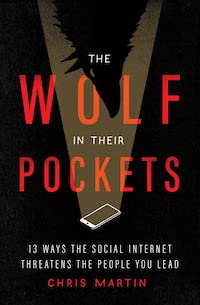 The Wolf in Their Pockets: 13 Ways the Social Internet Threatens the People You Lead by Chris Martin. “We can hardly remember a time when we didn’t feel the influence of that back pocket device. The average social media user spends about two-and-a-half hours a day using social media. That’s more than enough time to shape our values and desires. Pastors, teachers, and parents feel their influence slipping away. We’re seeing increased loneliness, disunity, and self-absorption. But where do we go from here? In The Wolf in Their Pockets, Internet expert Chris Martin examines the many ways we are being changed by social media. With a biblically informed voice, Martin both exposes the ways the Internet is distorting our life in Christ and shows us how to faithfully respond. Martin teaches us how to care for people who are obsessed with followers, views, and likes—and how to love those whose online influences have filled them with cynicism and contempt. Martin looks at how the social Internet is changing how we understand sex and beauty—what to do about the epidemic levels of anxiety—and how to redirect our hearts to worship Jesus Christ. Shepherding and leading people has never been easy, but the social Internet has brought new challenges. We need the miraculous work of the Holy Spirit and a powerful prayer life. Martin provides the biblical wisdom, direction, and hope necessary to combat The Wolf in Their Pockets.” (Buy it at Amazon or Westminster Books)
The Wolf in Their Pockets: 13 Ways the Social Internet Threatens the People You Lead by Chris Martin. “We can hardly remember a time when we didn’t feel the influence of that back pocket device. The average social media user spends about two-and-a-half hours a day using social media. That’s more than enough time to shape our values and desires. Pastors, teachers, and parents feel their influence slipping away. We’re seeing increased loneliness, disunity, and self-absorption. But where do we go from here? In The Wolf in Their Pockets, Internet expert Chris Martin examines the many ways we are being changed by social media. With a biblically informed voice, Martin both exposes the ways the Internet is distorting our life in Christ and shows us how to faithfully respond. Martin teaches us how to care for people who are obsessed with followers, views, and likes—and how to love those whose online influences have filled them with cynicism and contempt. Martin looks at how the social Internet is changing how we understand sex and beauty—what to do about the epidemic levels of anxiety—and how to redirect our hearts to worship Jesus Christ. Shepherding and leading people has never been easy, but the social Internet has brought new challenges. We need the miraculous work of the Holy Spirit and a powerful prayer life. Martin provides the biblical wisdom, direction, and hope necessary to combat The Wolf in Their Pockets.” (Buy it at Amazon or Westminster Books)
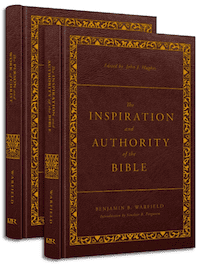 The Classic Warfield Collection (2-Volume Set) by Benjamin B Warfield, edited by John J Hughes. “In The Inspiration and Authority of the Bible, Warfield says that the Bible is ‘an oracular book … the Word of God in such a sense that whatever it says God says’ that all its affirmations are ‘to be esteemed as the utterance of God, of infallible truth and authority.’ Warfield’s incisive scholarship shines in this new and enhanced edition, which has been edited, formatted, and retypeset for modern readers. Its carefully prepared aids include fulsome abstracts at the beginning of each chapter, intelligent headings, smart paragraph breaks, explanatory notes, definitions of obscure terms, discussion questions, recommended reading, complete footnotes and bibliographies, and more. In The Person and Work of Christ, Warfield demonstrates that ‘it is no more possible to have a Christianity without an atoning Christ than it is to have a Christianity without a divine Christ.’ Warfield’s incisive scholarship shines in this new and enhanced edition, which has been edited, formatted, and re-typeset for modern readers. Its carefully prepared aids include fulsome abstracts at the beginning of each chapter, intelligent headings, smart paragraph breaks, explanatory notes, definitions of obscure terms, discussion questions, recommended reading, complete footnotes and bibliographies, and more.” (Buy it at Westminster Books)
The Classic Warfield Collection (2-Volume Set) by Benjamin B Warfield, edited by John J Hughes. “In The Inspiration and Authority of the Bible, Warfield says that the Bible is ‘an oracular book … the Word of God in such a sense that whatever it says God says’ that all its affirmations are ‘to be esteemed as the utterance of God, of infallible truth and authority.’ Warfield’s incisive scholarship shines in this new and enhanced edition, which has been edited, formatted, and retypeset for modern readers. Its carefully prepared aids include fulsome abstracts at the beginning of each chapter, intelligent headings, smart paragraph breaks, explanatory notes, definitions of obscure terms, discussion questions, recommended reading, complete footnotes and bibliographies, and more. In The Person and Work of Christ, Warfield demonstrates that ‘it is no more possible to have a Christianity without an atoning Christ than it is to have a Christianity without a divine Christ.’ Warfield’s incisive scholarship shines in this new and enhanced edition, which has been edited, formatted, and re-typeset for modern readers. Its carefully prepared aids include fulsome abstracts at the beginning of each chapter, intelligent headings, smart paragraph breaks, explanatory notes, definitions of obscure terms, discussion questions, recommended reading, complete footnotes and bibliographies, and more.” (Buy it at Westminster Books)
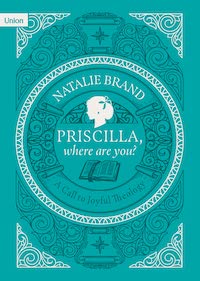 Priscilla, Where Are You? A Call to Joyful Theology by Natalie Brand. “‘What we believe about God is the single most important thing about us.’ This is a call to all Christians-but especially to Christian women-to engage more deeply in the joys of theology. Priscilla was a woman of sound doctrine who wasn’t afraid to share what she knew with others. And this is the privilege of every believing woman: we can explore truth and revel in God’s mysteries; we can live as God intended, with real spiritual strength and heartfelt praise. And we too will want to share our discoveries with others. (Buy it at Amazon or Westminster Books)
Priscilla, Where Are You? A Call to Joyful Theology by Natalie Brand. “‘What we believe about God is the single most important thing about us.’ This is a call to all Christians-but especially to Christian women-to engage more deeply in the joys of theology. Priscilla was a woman of sound doctrine who wasn’t afraid to share what she knew with others. And this is the privilege of every believing woman: we can explore truth and revel in God’s mysteries; we can live as God intended, with real spiritual strength and heartfelt praise. And we too will want to share our discoveries with others. (Buy it at Amazon or Westminster Books)
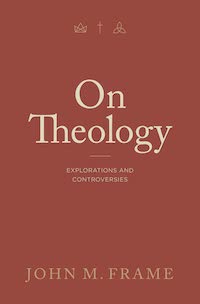 On Theology: Explorations and Controversies by John Frame. “John Frame is remarkable for his ability to pair profound thought with lucid prose. On Theology: Explorations and Controversies gathers concise reflections on wide-ranging matters of theology, philosophy, and ethics, divided into eight parts: Theological Method; The Thomist Controversy; Systematic Theology; Essays from Lexham Survey of Theology; Essays from The Gospel Coalition’s Concise Theology; Philosophy and Apologetics; Ethics and Politics; Personal Reflections. Whether considering age-old questions or current debates, Frame evokes deep thinking about Christian theology in a style that is accessible and engaging.” (Buy it at Amazon or Westminster Books)
On Theology: Explorations and Controversies by John Frame. “John Frame is remarkable for his ability to pair profound thought with lucid prose. On Theology: Explorations and Controversies gathers concise reflections on wide-ranging matters of theology, philosophy, and ethics, divided into eight parts: Theological Method; The Thomist Controversy; Systematic Theology; Essays from Lexham Survey of Theology; Essays from The Gospel Coalition’s Concise Theology; Philosophy and Apologetics; Ethics and Politics; Personal Reflections. Whether considering age-old questions or current debates, Frame evokes deep thinking about Christian theology in a style that is accessible and engaging.” (Buy it at Amazon or Westminster Books)
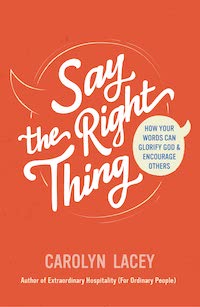 Say the Right Thing: How Your Words Can Glorify God and Encourage Others by Carolyn Lacey. “Words are powerful. They sink deep into our minds and our spirits. They can build others up or put others down. Many of us want to “say the right thing” and make a difference to others with our words, but we don’t know how to. Others of us struggle to control our speech and want help to be more godly in this area of our lives. This positive, constructive book delves into the Bible to show us how to overcome specific temptations, such as gossip or angry words. But it also goes much further. It shows us how we can use our speech to bring beauty, hope, truth, and comfort into the lives of those around us—and to give glory to God. Full of gracious words and practical help, this book will help readers to find out how to let the gospel shape their speech and enjoy the blessings that flow from this. (Buy it at Amazon)
Say the Right Thing: How Your Words Can Glorify God and Encourage Others by Carolyn Lacey. “Words are powerful. They sink deep into our minds and our spirits. They can build others up or put others down. Many of us want to “say the right thing” and make a difference to others with our words, but we don’t know how to. Others of us struggle to control our speech and want help to be more godly in this area of our lives. This positive, constructive book delves into the Bible to show us how to overcome specific temptations, such as gossip or angry words. But it also goes much further. It shows us how we can use our speech to bring beauty, hope, truth, and comfort into the lives of those around us—and to give glory to God. Full of gracious words and practical help, this book will help readers to find out how to let the gospel shape their speech and enjoy the blessings that flow from this. (Buy it at Amazon)
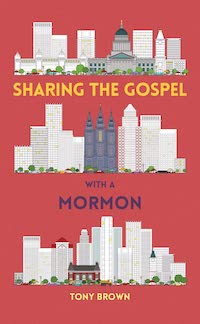 Sharing the Gospel with a Mormon by Tony Brown. “How do you share the gospel with those who believe it’s their mandate to evangelise to you? Mormons are eager to talk about their faith with anyone who will listen, so encounters with them are a great opportunity to discuss what the Bible really says. But if we’re not familiar with their beliefs, it can feel safer to avoid these conversations, and we can miss out on the chance to share the true gospel with them. Tony Brown spends his time conversing with and evangelising to those caught in New Religious Movements. In this thorough guide to sharing the gospel with a Mormon, he lays out the foundations of the Mormon faith and explains how their doctrines are not reconcilable with the Bible, despite their claims. He does so with a great love for Mormons, concluding that they are a lost people who need to hear the true gospel. If you’ve ever wondered how to share the gospel with a Mormon, then this book will give you the practical knowledge you need to start those conversations and point Mormons to the Jesus of the Bible.” (Buy it at Amazon)
Sharing the Gospel with a Mormon by Tony Brown. “How do you share the gospel with those who believe it’s their mandate to evangelise to you? Mormons are eager to talk about their faith with anyone who will listen, so encounters with them are a great opportunity to discuss what the Bible really says. But if we’re not familiar with their beliefs, it can feel safer to avoid these conversations, and we can miss out on the chance to share the true gospel with them. Tony Brown spends his time conversing with and evangelising to those caught in New Religious Movements. In this thorough guide to sharing the gospel with a Mormon, he lays out the foundations of the Mormon faith and explains how their doctrines are not reconcilable with the Bible, despite their claims. He does so with a great love for Mormons, concluding that they are a lost people who need to hear the true gospel. If you’ve ever wondered how to share the gospel with a Mormon, then this book will give you the practical knowledge you need to start those conversations and point Mormons to the Jesus of the Bible.” (Buy it at Amazon)
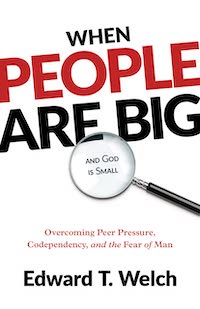 When People Are Big and God Is Small: Overcoming Peer Pressure, Codependency, and the Fear of Man (Second Edition) by Edward Welch. “Five college students pitch a tent by their car one dark night, not realizing they’ve set up camp by a military runway. They awake from a deep sleep to the shaking of the earth and a roar like mountains falling―the sound of a military transport plane taking off right over their heads. Can you imagine the visceral terror of that moment? For author and biblical counselor Edward Welch, it was a glimpse of what the Israelites experienced in God’s presence at Mount Sinai. Our God is a consuming fire. His holiness and relentless love put our sin, our weakness, and our fears in perspective. If we can learn the fear of the Lord―a fear that in Christ is filled with gratitude, love, and devotion―we can break free of the fear of other people that so easily entangles us. We can experience joy in our Christian lives as we need other people less and love them more. This groundbreaking work has helped countless numbers of people to confront their fear of man and live in freedom. The new edition features clarifying additions, new material, and revisions throughout.” (Buy it at Amazon or Westminster Books)
When People Are Big and God Is Small: Overcoming Peer Pressure, Codependency, and the Fear of Man (Second Edition) by Edward Welch. “Five college students pitch a tent by their car one dark night, not realizing they’ve set up camp by a military runway. They awake from a deep sleep to the shaking of the earth and a roar like mountains falling―the sound of a military transport plane taking off right over their heads. Can you imagine the visceral terror of that moment? For author and biblical counselor Edward Welch, it was a glimpse of what the Israelites experienced in God’s presence at Mount Sinai. Our God is a consuming fire. His holiness and relentless love put our sin, our weakness, and our fears in perspective. If we can learn the fear of the Lord―a fear that in Christ is filled with gratitude, love, and devotion―we can break free of the fear of other people that so easily entangles us. We can experience joy in our Christian lives as we need other people less and love them more. This groundbreaking work has helped countless numbers of people to confront their fear of man and live in freedom. The new edition features clarifying additions, new material, and revisions throughout.” (Buy it at Amazon or Westminster Books)
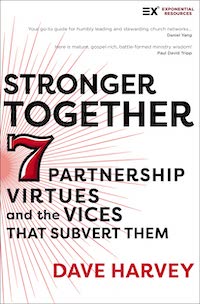 Stronger Together: Seven Partnership Virtues and the Vices that Subvert Them by Dave Harvey. “Networked churches are the primary church planting force in evangelicalism today—but what makes them so effective, why do they remain so under-appreciated, and what are the common pitfalls that can ensnare them? In Stronger Together, veteran church planter and pastor Dave Harvey draws from his experiences and study of networks to walk Christian institutions, church leaders, and planters through tested strategies for starting and sustaining healthy and biblical church partnerships. By focusing on key virtues and shedding light on the pitfalls that oppose them, Harvey unpacks seven dichotomies that offer a practical roadmap to healthy patterns. When churches are vitally connected to other churches, they thrive, multiply, and last longer. Scripture exemplifies this, and research proves it. Stronger Together—part of the Exponential series on ministry growth and discipleship—will teach you exactly how to pursue biblical collaboration that will allow your church to flourish and your ministry to grow.” (Buy it at Amazon)
Stronger Together: Seven Partnership Virtues and the Vices that Subvert Them by Dave Harvey. “Networked churches are the primary church planting force in evangelicalism today—but what makes them so effective, why do they remain so under-appreciated, and what are the common pitfalls that can ensnare them? In Stronger Together, veteran church planter and pastor Dave Harvey draws from his experiences and study of networks to walk Christian institutions, church leaders, and planters through tested strategies for starting and sustaining healthy and biblical church partnerships. By focusing on key virtues and shedding light on the pitfalls that oppose them, Harvey unpacks seven dichotomies that offer a practical roadmap to healthy patterns. When churches are vitally connected to other churches, they thrive, multiply, and last longer. Scripture exemplifies this, and research proves it. Stronger Together—part of the Exponential series on ministry growth and discipleship—will teach you exactly how to pursue biblical collaboration that will allow your church to flourish and your ministry to grow.” (Buy it at Amazon)
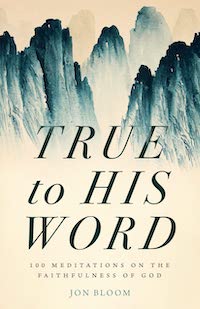 True to His Word: 100 Meditations on the Faithfulness of God by Jon Bloom. “The Bible teaches that God is always faithful, that He’s always TRUE to HIS WORD. Saints throughout history have affirmed it, and hymns and worship songs celebrate it. But what if it doesn’t look that way to you? You’re not alone. The Bible is full of examples of God’s children struggling to trust him in seasons of disappointment, discouragement, danger, disaster, depression, and deep grief—only to see God’s faithfulness to them manifest in surprising ways. These meditations are designed to help you grow in your ability to recognize God’s faithfulness in places you may not typically look, at times you don’t expect, and in providences— especially the most disturbing and devastating ones—that often don’t look like God’s faithfulness. Because the more you see it, the more wonderful God’s faithfulness becomes to you. And the more you’ll realize that ‘all the paths of the Lord are steadfast love and faithfulness’ (Psalm 25:10). (Buy it at Amazon)
True to His Word: 100 Meditations on the Faithfulness of God by Jon Bloom. “The Bible teaches that God is always faithful, that He’s always TRUE to HIS WORD. Saints throughout history have affirmed it, and hymns and worship songs celebrate it. But what if it doesn’t look that way to you? You’re not alone. The Bible is full of examples of God’s children struggling to trust him in seasons of disappointment, discouragement, danger, disaster, depression, and deep grief—only to see God’s faithfulness to them manifest in surprising ways. These meditations are designed to help you grow in your ability to recognize God’s faithfulness in places you may not typically look, at times you don’t expect, and in providences— especially the most disturbing and devastating ones—that often don’t look like God’s faithfulness. Because the more you see it, the more wonderful God’s faithfulness becomes to you. And the more you’ll realize that ‘all the paths of the Lord are steadfast love and faithfulness’ (Psalm 25:10). (Buy it at Amazon)
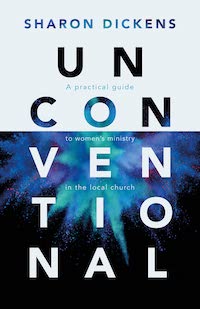 Unconventional by Sharon Dickens. “Discipling women is vital in every church. But it’s all very well knowing the theory — how do you actually get on and do it in practice? Unconventional is an honest look at beginning and sustaining a vibrant women’s ministry that works. Author Sharon Dickens shares how she started a women’s ministry from scratch — with all the frustrations and joys along the way — enabling you to learn from her mistakes and benefit from her extensive experience.” (Buy it at Amazon)
Unconventional by Sharon Dickens. “Discipling women is vital in every church. But it’s all very well knowing the theory — how do you actually get on and do it in practice? Unconventional is an honest look at beginning and sustaining a vibrant women’s ministry that works. Author Sharon Dickens shares how she started a women’s ministry from scratch — with all the frustrations and joys along the way — enabling you to learn from her mistakes and benefit from her extensive experience.” (Buy it at Amazon)
 In the past few weeks I have seen a fair bit of discussion about book endorsements—about those little blurbs you so often find inside the first few pages or on the back cover of a newly-published book. There seems to be some consensus that the entire endorsement system is faulty, but little consensus about what to do about it. I thought I’d give a behind-the-scenes glance at the system based on my understanding and my experience and then offer a few of my own thoughts about what, if anything, should be fixed. How Endorsements Work After an author completes a manuscript, and after an initial round or two of editing, the publisher begins to seek endorsements. Most often it is the responsibility of the author to request and provide these, though occasionally the publisher will make the request—especially with better-known authors. The publisher usually provides a PDF of the manuscript in near-final condition with the option to instead receive it printed on plain printer paper (since at this stage it has not yet been printed as a bound book). It almost always comes with a warning that the contents may still change a little bit as editing continues. They typically come with a deadline of 4 to 6 weeks. The person who has been asked to write the blurb then writes it out and sends it through to the author or publisher along with their preferred attribution (e.g. —Tim Challies, blogger and author). Publishers will usually want to have at least 5 or 6 solid…]]>
In the past few weeks I have seen a fair bit of discussion about book endorsements—about those little blurbs you so often find inside the first few pages or on the back cover of a newly-published book. There seems to be some consensus that the entire endorsement system is faulty, but little consensus about what to do about it. I thought I’d give a behind-the-scenes glance at the system based on my understanding and my experience and then offer a few of my own thoughts about what, if anything, should be fixed. How Endorsements Work After an author completes a manuscript, and after an initial round or two of editing, the publisher begins to seek endorsements. Most often it is the responsibility of the author to request and provide these, though occasionally the publisher will make the request—especially with better-known authors. The publisher usually provides a PDF of the manuscript in near-final condition with the option to instead receive it printed on plain printer paper (since at this stage it has not yet been printed as a bound book). It almost always comes with a warning that the contents may still change a little bit as editing continues. They typically come with a deadline of 4 to 6 weeks. The person who has been asked to write the blurb then writes it out and sends it through to the author or publisher along with their preferred attribution (e.g. —Tim Challies, blogger and author). Publishers will usually want to have at least 5 or 6 solid…]]>
In the past few weeks I have seen a fair bit of discussion about book endorsements—about those little blurbs you so often find inside the first few pages or on the back cover of a newly-published book. There seems to be some consensus that the entire endorsement system is faulty, but little consensus about what to do about it. I thought I’d give a behind-the-scenes glance at the system based on my understanding and my experience and then offer a few of my own thoughts about what, if anything, should be fixed.
How Endorsements Work
After an author completes a manuscript, and after an initial round or two of editing, the publisher begins to seek endorsements. Most often it is the responsibility of the author to request and provide these, though occasionally the publisher will make the request—especially with better-known authors. The publisher usually provides a PDF of the manuscript in near-final condition with the option to instead receive it printed on plain printer paper (since at this stage it has not yet been printed as a bound book). It almost always comes with a warning that the contents may still change a little bit as editing continues. They typically come with a deadline of 4 to 6 weeks. The person who has been asked to write the blurb then writes it out and sends it through to the author or publisher along with their preferred attribution (e.g. —Tim Challies, blogger and author).
Publishers will usually want to have at least 5 or 6 solid endorsements for a book. Endorsers are most often chosen for their connection to the topic of the book or for their name recognition. Of course to get 5 or 6 you may need to request 10 or 15, and this is one reason books occasionally end up with several pages of endorsements. Authors will usually request them from friends and acquaintances and perhaps also make a few long-shot requests from people they admire but don’t know.
I can only speak personally here, but I have never been offered money or any other perk in exchange for an endorsement. Neither have I ever had any “tit-for-tat” pressure applied as if I owe it to someone since they once did something nice for me—though it’s possible I have applied this pressure to myself at times.
I haven’t ever counted, but I probably receive 30 or 40 endorsement requests per year and suspect there are other people who receive far more. Some are from people I know, some are from people I haven’t met but look up to, some are from people I have never heard of before.
If someone provides an endorsement, they basically do so as an act of kindness, as there is little to gain, especially when measured against the time it takes to read a book and write a blurb. And you may need to trust me when I say they are surprisingly difficult to write.
Why Publishers Want Endorsements
Endorsements are considered a necessary part of publishing a book for a number of reasons, most of which are quite obvious. Here are some of them.
Most obviously, they work. It’s easy for readers to blame the industry, but I think it would be just as easy for the industry to blame the readers. As readers, we want to be able to assess books quickly and without rigorous analysis. Endorsements offer us the shortcut we want.
Then, readers cannot be familiar with every author, so endorsements help make relational connections. “I don’t know this author, but if that person I do know appreciates her, she must be okay.” In this way they are a free and effective marketing tactic.
Also, many publishers publish such a wide variety of authors that their brand does not offer any clues as to whether a book will be very good or very bad or somewhere between. No matter what comes from Banner of Truth you know it will be good and trustworthy because they are so judicious with what they produce. But then the publisher who publishes John MacArthur also publishes Sarah Young, so its own brand doesn’t count for nearly as much. Endorsers can provide credibility that publishers do not.
Then there’s this: endorsements are good for search engines, whether that is a global one like Google or a specific one like Amazon. Forewords, which are essentially long-form endorsements, are even more effective in this way. Sometimes the main purpose in an endorsement or foreword is to associate a book with a name that is more recognized than the author’s.
Finally, there are so many books being published, and often on the same subject, that endorsements can separate them from one another. What makes a reader choose one marriage book over another when both may be perfectly good? It could be the names recommending it on the back cover.
And I am sure there are many more reasons besides.
What Endorsements Mean
It would be a mistake to assume that every endorsement means that the person has thoroughly or completely read that book. We could debate whether it should mean this, but as it stands it does not. It could mean that the person has read it all or it could mean he has skimmed it. It could even mean he hasn’t read as much as a single word. Sometimes a clue will be in the endorsement (e.g. “I love this author and make sure to recommend all of his books”) and sometimes you will only be able to guess.
I expect that every endorser sets out to read every word of every book, but sooner or later is challenged in their conviction. And, to be fair, the ethics of endorsements are not always completely straightforward.
What about a condensed version of an existing work that I endorsed in the past? Can my endorsement roll over from the longer work to the shorter version of it? I was recently asked this very question.
I was recently asked to write a blurb for a book that is on a non-controversial topic I know well, by an author I know well, and even edited by an editor I know well. I have read probably 20 books on the subject, including every one the author cites. Should I read thoroughly or will a relatively quick skim suffice?
What about a reference work? I was asked to write endorsements for very large systematic theologies by both John MacArthur and Wayne Grudem—the first edition of MacArthur’s Biblical Doctrine and the second edition of Grudem’s Systematic Theology. Each would take weeks to read carefully from cover-to-cover. I am quite familiar with both authors and what they believe. Should I have read every word?
Or what about when a publisher asks for endorsements for the collected works of a historic author? I was asked to write a blurb for a three-volume set by an author who lived and died more than a century ago. I have read some, but not all of what those volumes contain. Should I read all 2,500 pages before writing the endorsement?
All of this to say, endorsements are perhaps a little more complicated than we might think. I believe most authors and publishers do their best to treat them seriously and ethically, even if also imperfectly.
Do Endorsements Need to Be Fixed?
Does the endorsement system need to be fixed? I don’t really think it does. It may not be ideal, but not much in this world really is. I am convinced that it works well enough and I am not convinced we have a viable alternative. So maybe let me offer a few suggestions for both readers and authors.
Readers:
- Don’t make too much of endorsements. Don’t take them as meaning more than they do. Read them to ensure you know what the endorser is really saying. And understand that what an endorsement really communicates is “I trust this person enough to extend a bit of my reputation and credibility toward him.”
- Develop your own list of trusted endorsers—people who you have come to regard as reliable in their recommendations.
- Go a little deeper in evaluating the merits of a book than simply reading the blurbs on the back cover.
- Don’t assume that the endorsing system is corrupt or driven by anything more (or less) than friendships and goodwill. There may be some exceptions, but I think they are few and rare.
Authors & Endorsers:
- Take endorsements seriously. Do you remember how honored you were the first time you got asked to write one? Try to maintain that sense of privilege rather than regarding them as just another chore.
- Write honest endorsements that avoid hyperbole. And it’s probably better to read manuscripts more thoroughly and write fewer endorsements than to endorse far more based on quick skims.
- Understand and accept the risk you take when penning an endorsement. It is no small thing to put your name on another person’s work, because if the book ends up being controversial and gaining criticism, you may catch some of the flack. If you are going to read books in a cursory way, understand that your risk is even greater.
- Don’t request more endorsements than you really need. No book benefits from having three or four pages of them. And no one wants the endorsement they took the time to write to be one of 30. So don’t waste people’s precious time and don’t feed your ego by pursuing quantity.
 January has been quite a good month for Christian book releases. I sorted through the many options and arrived at this list of new and notables. In each case I’ve provided the editorial description to give you a sense of what it’s all about. I hope there’s something here that’s of interest to you! A Praying Church: Becoming a People of Hope in a Discouraging World by Paul Miller. “In our current culture, the church and prayer are often dismissed as irrelevant. But when believers gather and pray together, powerful things happen: the Spirit equips the saints for ministry, the helpless are met with help, and believers experience the joy of being led by the Spirit of Jesus. In this book, Paul E. Miller, bestselling author of A Praying Life, casts a vision for a return to the simple yet life-changing practice of praying together. Through personal stories and biblical examples, Miller teaches the why, what, and how of praying together. Readers will learn how praying with other Christians can transform their communities into beacons of hope and be given practical strategies–such as finding a prayer partner and prioritizing a structured prayer time–to implement these changes in their own church.” (Buy it at Amazon or Westminster Books) A New Exposition of the London Baptist Confession of Faith of 1689, edited by Rob Ventura. “For centuries, Baptists have published confessions of faith as formal statements of their beliefs. Chief among these is the Second London Baptist Confession of Faith of 1689. This doctrinal statement is a…]]>
January has been quite a good month for Christian book releases. I sorted through the many options and arrived at this list of new and notables. In each case I’ve provided the editorial description to give you a sense of what it’s all about. I hope there’s something here that’s of interest to you! A Praying Church: Becoming a People of Hope in a Discouraging World by Paul Miller. “In our current culture, the church and prayer are often dismissed as irrelevant. But when believers gather and pray together, powerful things happen: the Spirit equips the saints for ministry, the helpless are met with help, and believers experience the joy of being led by the Spirit of Jesus. In this book, Paul E. Miller, bestselling author of A Praying Life, casts a vision for a return to the simple yet life-changing practice of praying together. Through personal stories and biblical examples, Miller teaches the why, what, and how of praying together. Readers will learn how praying with other Christians can transform their communities into beacons of hope and be given practical strategies–such as finding a prayer partner and prioritizing a structured prayer time–to implement these changes in their own church.” (Buy it at Amazon or Westminster Books) A New Exposition of the London Baptist Confession of Faith of 1689, edited by Rob Ventura. “For centuries, Baptists have published confessions of faith as formal statements of their beliefs. Chief among these is the Second London Baptist Confession of Faith of 1689. This doctrinal statement is a…]]>
January has been quite a good month for Christian book releases. I sorted through the many options and arrived at this list of new and notables. In each case I’ve provided the editorial description to give you a sense of what it’s all about. I hope there’s something here that’s of interest to you!
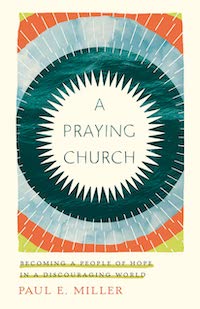 A Praying Church: Becoming a People of Hope in a Discouraging World by Paul Miller. “In our current culture, the church and prayer are often dismissed as irrelevant. But when believers gather and pray together, powerful things happen: the Spirit equips the saints for ministry, the helpless are met with help, and believers experience the joy of being led by the Spirit of Jesus. In this book, Paul E. Miller, bestselling author of A Praying Life, casts a vision for a return to the simple yet life-changing practice of praying together. Through personal stories and biblical examples, Miller teaches the why, what, and how of praying together. Readers will learn how praying with other Christians can transform their communities into beacons of hope and be given practical strategies–such as finding a prayer partner and prioritizing a structured prayer time–to implement these changes in their own church.” (Buy it at Amazon or Westminster Books)
A Praying Church: Becoming a People of Hope in a Discouraging World by Paul Miller. “In our current culture, the church and prayer are often dismissed as irrelevant. But when believers gather and pray together, powerful things happen: the Spirit equips the saints for ministry, the helpless are met with help, and believers experience the joy of being led by the Spirit of Jesus. In this book, Paul E. Miller, bestselling author of A Praying Life, casts a vision for a return to the simple yet life-changing practice of praying together. Through personal stories and biblical examples, Miller teaches the why, what, and how of praying together. Readers will learn how praying with other Christians can transform their communities into beacons of hope and be given practical strategies–such as finding a prayer partner and prioritizing a structured prayer time–to implement these changes in their own church.” (Buy it at Amazon or Westminster Books)
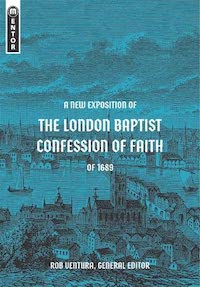 A New Exposition of the London Baptist Confession of Faith of 1689, edited by Rob Ventura. “For centuries, Baptists have published confessions of faith as formal statements of their beliefs. Chief among these is the Second London Baptist Confession of Faith of 1689. This doctrinal statement is a spiritual treasure trove worthy of our fresh attention. In this new study, more than twenty contributors unpack its timeless biblical truths, ‘things which are most surely believed among us’ (Luke 1:1). Our prayer is that the Lord will use this volume to richly edify and sanctify His people worldwide, and to assist the churches in pursuing biblical holiness and doctrinal purity. May these labors send God’s people back again and again to the Bible, which is–as the confession states–the ‘only sufficient, certain, and infallible rule of all saving knowledge, faith, and obedience’ (1.1).” (Buy it at Amazon or Westminster Books)
A New Exposition of the London Baptist Confession of Faith of 1689, edited by Rob Ventura. “For centuries, Baptists have published confessions of faith as formal statements of their beliefs. Chief among these is the Second London Baptist Confession of Faith of 1689. This doctrinal statement is a spiritual treasure trove worthy of our fresh attention. In this new study, more than twenty contributors unpack its timeless biblical truths, ‘things which are most surely believed among us’ (Luke 1:1). Our prayer is that the Lord will use this volume to richly edify and sanctify His people worldwide, and to assist the churches in pursuing biblical holiness and doctrinal purity. May these labors send God’s people back again and again to the Bible, which is–as the confession states–the ‘only sufficient, certain, and infallible rule of all saving knowledge, faith, and obedience’ (1.1).” (Buy it at Amazon or Westminster Books)
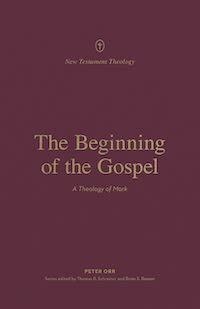 The Beginning of the Gospel: A Theology of Mark (New Testament Theology) by Peter Orr. “The book of Mark–the first and shortest Gospel written–serves as both a historical and theological account, connecting Jesus to the whole storyline of the Bible. Mark writes against the backdrop of the Old Testament and draws from other New Testament writers, specifically Peter and Paul, to articulate many themes that are found in the rest of the New Testament. In this addition to the New Testament Theology series, scholar Peter Orr offers an accessible summary of the theology of Mark, examining its relationship to both the Old and New Testaments. Each chapter focuses on a key theological theme–the identity of Christ, the announcement of the kingdom, the call to follow, and more–and explains how it is relevant for the church today.” (Buy it at Amazon or Westminster Books)
The Beginning of the Gospel: A Theology of Mark (New Testament Theology) by Peter Orr. “The book of Mark–the first and shortest Gospel written–serves as both a historical and theological account, connecting Jesus to the whole storyline of the Bible. Mark writes against the backdrop of the Old Testament and draws from other New Testament writers, specifically Peter and Paul, to articulate many themes that are found in the rest of the New Testament. In this addition to the New Testament Theology series, scholar Peter Orr offers an accessible summary of the theology of Mark, examining its relationship to both the Old and New Testaments. Each chapter focuses on a key theological theme–the identity of Christ, the announcement of the kingdom, the call to follow, and more–and explains how it is relevant for the church today.” (Buy it at Amazon or Westminster Books)
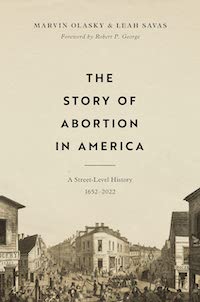 The Story of Abortion: A Street-Level History 1652–2022 by Marvin Olasky and Leah Savas. “
The Story of Abortion: A Street-Level History 1652–2022 by Marvin Olasky and Leah Savas. “
Fifty years ago, the Roe v. Wade Supreme Court decision to legalize abortion-on-demand sparked nationwide tensions that continue to this day. In the decades since that ruling, abortion opponents and proponents have descended on the Capitol each year for marches and protests. But this story didn’t begin with the Supreme Court in the 1970s; arguments about abortion have been a part of American history since the 17th century. So how did we get here? The Story of Abortion in America traces the long cultural history of this pressing issue from 1652 to today, focusing on the street-level activities of those drawn into the battles willingly or unwillingly. Authors Marvin Olasky and Leah Savas show complex lives on both sides: Some sacrificed much to help the poor and others sacrificed the helpless to empower themselves. The Story of Abortion in America argues that whatever happens legally won’t end the debate, but it will affect lives.” (Buy it at Amazon)
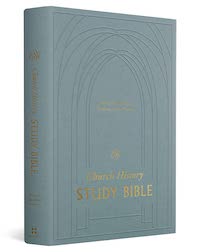 ESV Church History Study Bible. “The ESV Church History Study Bible is designed to help believers in all seasons of life understand the Bible with notes from over 300 of church history’s most prominent figures. Edited by Stephen J. Nichols, Gerald Bray, and Keith A. Mathison, this Bible features 20,000+ study notes from historical figures including Athanasius of Alexandria, John Chrysostom, Martin Luther, John Bunyan, Jonathan Edwards, and Charles Spurgeon. This study Bible also includes articles by trusted scholars on major aspects of church history, a glossary of historical figures, and ‘This Passage in History’ callouts. Created for serious readers, students, and teachers of God’s Word, the ESV Church History Study Bible highlights voices from the past offering wisdom for the present.” (Buy it at Amazon or Westminster Books)
ESV Church History Study Bible. “The ESV Church History Study Bible is designed to help believers in all seasons of life understand the Bible with notes from over 300 of church history’s most prominent figures. Edited by Stephen J. Nichols, Gerald Bray, and Keith A. Mathison, this Bible features 20,000+ study notes from historical figures including Athanasius of Alexandria, John Chrysostom, Martin Luther, John Bunyan, Jonathan Edwards, and Charles Spurgeon. This study Bible also includes articles by trusted scholars on major aspects of church history, a glossary of historical figures, and ‘This Passage in History’ callouts. Created for serious readers, students, and teachers of God’s Word, the ESV Church History Study Bible highlights voices from the past offering wisdom for the present.” (Buy it at Amazon or Westminster Books)
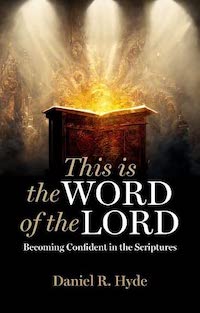 This Is the Word of the Lord: Becoming Confident in the Scriptures by Daniel R. Hyde. “Are you confident in the Word of God? Are you certain that God speaks to you in and through the pages of the Bible? Daniel R. Hyde exhorts readers to grow in their certainty that the Bible is the Word of God, to know with their hearts as well as their heads that God has spoken, and continues to speak, through his Scriptures. When troubles come, it is crucial that your confidence in what God has said is strong. Hyde hopes that by having a good grounding in what the Bible says about itself, Christians will be well equipped to stand firm.” (Buy it at Amazon)
This Is the Word of the Lord: Becoming Confident in the Scriptures by Daniel R. Hyde. “Are you confident in the Word of God? Are you certain that God speaks to you in and through the pages of the Bible? Daniel R. Hyde exhorts readers to grow in their certainty that the Bible is the Word of God, to know with their hearts as well as their heads that God has spoken, and continues to speak, through his Scriptures. When troubles come, it is crucial that your confidence in what God has said is strong. Hyde hopes that by having a good grounding in what the Bible says about itself, Christians will be well equipped to stand firm.” (Buy it at Amazon)
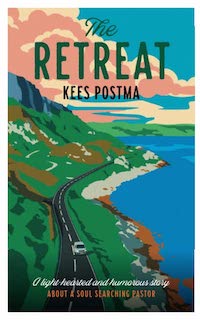 The Retreat : A Lighthearted and Humorous Story About a Soul-Searching Pastor by Kees Postma. “You’ll laugh, you’ll be challenged, and most of all you’ll be encouraged to find rest in the Lord, and strength to keep going. Case Parker, a worn-out pastor, is shocked by all the good, bad and ugly he has found in ministry so far. Having reached a point of utter exhaustion he decides to go to Ireland for a three day retreat. Case, and the other Dutch shepherds that join him, end up in all kind of interesting, dangerous and hilarious situations. This story will have you in stitches, will make you feel convicted and hopefully has you changed by the time the story ends. In his first translated book, Postma offers heartfelt, laugh-out-loud observations on the absurd ways shepherds and sheep alike, try to make themselves look better than they actually are. The Dutch version of the book became a bestseller interweaving humour and spiritual reflection.” (Buy it from Amazon)
The Retreat : A Lighthearted and Humorous Story About a Soul-Searching Pastor by Kees Postma. “You’ll laugh, you’ll be challenged, and most of all you’ll be encouraged to find rest in the Lord, and strength to keep going. Case Parker, a worn-out pastor, is shocked by all the good, bad and ugly he has found in ministry so far. Having reached a point of utter exhaustion he decides to go to Ireland for a three day retreat. Case, and the other Dutch shepherds that join him, end up in all kind of interesting, dangerous and hilarious situations. This story will have you in stitches, will make you feel convicted and hopefully has you changed by the time the story ends. In his first translated book, Postma offers heartfelt, laugh-out-loud observations on the absurd ways shepherds and sheep alike, try to make themselves look better than they actually are. The Dutch version of the book became a bestseller interweaving humour and spiritual reflection.” (Buy it from Amazon)
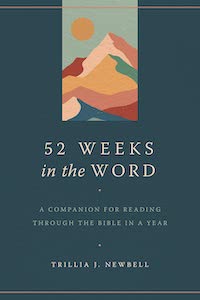 52 Weeks in the Word: A Companion for Reading through the Bible in a Year by Trillia Newbell. “Have you ever been disappointed or frustrated with your inability for consistent Bible study? Reading through the Bible in a year can feel daunting. It can be hard to know how—or where—to start. Perhaps you just need a friend who follows Jesus to help. Trillia Newbell is a trusted Bible teacher and lover of the Scriptures. She describes herself as a ‘forever student.’ And she’d like nothing more than for you to join her in the grand and thrilling adventure of growing in the knowledge and love of Jesus Christ! Rather than jumping around the Bible, you can jump into this book that will take you through the entirety of the Scriptures in one year!” (Buy it at Amazon or Westminster Books)
52 Weeks in the Word: A Companion for Reading through the Bible in a Year by Trillia Newbell. “Have you ever been disappointed or frustrated with your inability for consistent Bible study? Reading through the Bible in a year can feel daunting. It can be hard to know how—or where—to start. Perhaps you just need a friend who follows Jesus to help. Trillia Newbell is a trusted Bible teacher and lover of the Scriptures. She describes herself as a ‘forever student.’ And she’d like nothing more than for you to join her in the grand and thrilling adventure of growing in the knowledge and love of Jesus Christ! Rather than jumping around the Bible, you can jump into this book that will take you through the entirety of the Scriptures in one year!” (Buy it at Amazon or Westminster Books)
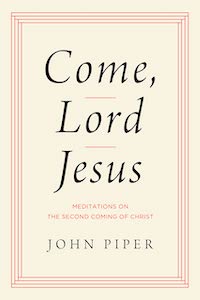 Come, Lord Jesus: Meditations on the Second Coming of Christ by John Piper. “Many people are curious about the second coming of Christ—what it will be like, when it will happen, and what signs will come first. In his latest book, Come, Lord Jesus, John Piper addresses all these issues, but stresses that those who love the second coming of Christ will receive a crown of righteousness (2 Timothy 4:6–8). Piper examines key biblical texts around the second coming while encouraging readers toward a Spirit-awakened affection for Jesus’s return. He also explores important questions such as, Could Jesus come at any moment, or must certain events happen first?; What does it mean to “Watch, for you know neither the day nor the hour”?; and What should we be doing when he comes? With a special focus on the teachings of Jesus, Paul, and Peter, Come, Lord Jesus portrays not only the glory of the revealed Savior, but also the glorification of the resurrected saints.” (Buy it at Amazon or Westminster Books)
Come, Lord Jesus: Meditations on the Second Coming of Christ by John Piper. “Many people are curious about the second coming of Christ—what it will be like, when it will happen, and what signs will come first. In his latest book, Come, Lord Jesus, John Piper addresses all these issues, but stresses that those who love the second coming of Christ will receive a crown of righteousness (2 Timothy 4:6–8). Piper examines key biblical texts around the second coming while encouraging readers toward a Spirit-awakened affection for Jesus’s return. He also explores important questions such as, Could Jesus come at any moment, or must certain events happen first?; What does it mean to “Watch, for you know neither the day nor the hour”?; and What should we be doing when he comes? With a special focus on the teachings of Jesus, Paul, and Peter, Come, Lord Jesus portrays not only the glory of the revealed Savior, but also the glorification of the resurrected saints.” (Buy it at Amazon or Westminster Books)
 As another month draws to a close, and as the holiday shopping season picks up, I thought I’d share another collection of new and notable Christian books. Each of these titles has been released in November (or, in a couple of cases, very late October). I hope there’s something here that is of interest to you or to someone on your Christmas list. Biblical Critical Theory: How the Bible’s Unfolding Story Makes Sense of Modern Life and Culture by Christopher Watkin. “Critical theories exist to critique what we think we know about reality and the social, political, and cultural structures in which we live. In doing so, they make visible the values and beliefs of a culture in order to scrutinize and change them. Biblical Critical Theory exposes and evaluates the often-hidden assumptions and concepts that shape late-modern society, examining them through the lens of the biblical story running from Genesis to Revelation, and asking urgent questions like: How does the Bible’s storyline help us understand our society, our culture, and ourselves? How do specific doctrines help us engage thoughtfully in the philosophical, political, and social questions of our day? How can we analyze and critique culture and its alternative critical theories through Scripture? Informed by the biblical-theological structure of Saint Augustine’s magisterial work The City of God (and with extensive diagrams and practical tools), Biblical Critical Theory shows how the patterns of the Bible’s storyline can provide incisive, fresh, and nuanced ways of intervening in today’s debates on everything from science, the arts, and…]]>
As another month draws to a close, and as the holiday shopping season picks up, I thought I’d share another collection of new and notable Christian books. Each of these titles has been released in November (or, in a couple of cases, very late October). I hope there’s something here that is of interest to you or to someone on your Christmas list. Biblical Critical Theory: How the Bible’s Unfolding Story Makes Sense of Modern Life and Culture by Christopher Watkin. “Critical theories exist to critique what we think we know about reality and the social, political, and cultural structures in which we live. In doing so, they make visible the values and beliefs of a culture in order to scrutinize and change them. Biblical Critical Theory exposes and evaluates the often-hidden assumptions and concepts that shape late-modern society, examining them through the lens of the biblical story running from Genesis to Revelation, and asking urgent questions like: How does the Bible’s storyline help us understand our society, our culture, and ourselves? How do specific doctrines help us engage thoughtfully in the philosophical, political, and social questions of our day? How can we analyze and critique culture and its alternative critical theories through Scripture? Informed by the biblical-theological structure of Saint Augustine’s magisterial work The City of God (and with extensive diagrams and practical tools), Biblical Critical Theory shows how the patterns of the Bible’s storyline can provide incisive, fresh, and nuanced ways of intervening in today’s debates on everything from science, the arts, and…]]>
As another month draws to a close, and as the holiday shopping season picks up, I thought I’d share another collection of new and notable Christian books. Each of these titles has been released in November (or, in a couple of cases, very late October). I hope there’s something here that is of interest to you or to someone on your Christmas list.
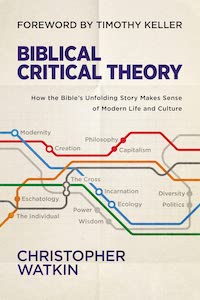 Biblical Critical Theory: How the Bible’s Unfolding Story Makes Sense of Modern Life and Culture by Christopher Watkin. “Critical theories exist to critique what we think we know about reality and the social, political, and cultural structures in which we live. In doing so, they make visible the values and beliefs of a culture in order to scrutinize and change them. Biblical Critical Theory exposes and evaluates the often-hidden assumptions and concepts that shape late-modern society, examining them through the lens of the biblical story running from Genesis to Revelation, and asking urgent questions like: How does the Bible’s storyline help us understand our society, our culture, and ourselves? How do specific doctrines help us engage thoughtfully in the philosophical, political, and social questions of our day? How can we analyze and critique culture and its alternative critical theories through Scripture? Informed by the biblical-theological structure of Saint Augustine’s magisterial work The City of God (and with extensive diagrams and practical tools), Biblical Critical Theory shows how the patterns of the Bible’s storyline can provide incisive, fresh, and nuanced ways of intervening in today’s debates on everything from science, the arts, and politics to dignity, multiculturalism, and equality. You’ll learn the moves to make and the tools to use in analyzing and engaging with all sorts of cultural artifacts and events in a way that is both biblically faithful and culturally relevant.” (Buy it from Amazon or Westminster Books)
Biblical Critical Theory: How the Bible’s Unfolding Story Makes Sense of Modern Life and Culture by Christopher Watkin. “Critical theories exist to critique what we think we know about reality and the social, political, and cultural structures in which we live. In doing so, they make visible the values and beliefs of a culture in order to scrutinize and change them. Biblical Critical Theory exposes and evaluates the often-hidden assumptions and concepts that shape late-modern society, examining them through the lens of the biblical story running from Genesis to Revelation, and asking urgent questions like: How does the Bible’s storyline help us understand our society, our culture, and ourselves? How do specific doctrines help us engage thoughtfully in the philosophical, political, and social questions of our day? How can we analyze and critique culture and its alternative critical theories through Scripture? Informed by the biblical-theological structure of Saint Augustine’s magisterial work The City of God (and with extensive diagrams and practical tools), Biblical Critical Theory shows how the patterns of the Bible’s storyline can provide incisive, fresh, and nuanced ways of intervening in today’s debates on everything from science, the arts, and politics to dignity, multiculturalism, and equality. You’ll learn the moves to make and the tools to use in analyzing and engaging with all sorts of cultural artifacts and events in a way that is both biblically faithful and culturally relevant.” (Buy it from Amazon or Westminster Books)
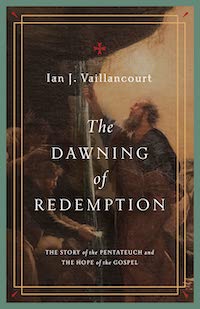 The Dawning of Redemption: The Story of the Pentateuch and the Hope of the Gospel by Ian J. Vaillancourt. “When starting a new Bible-reading plan, many readers begin enthusiastically in Genesis but then lose momentum when they encounter the Old Testament laws and genealogies. But the Pentateuch—the first five books of the Bible—has much to offer today’s Christian; it is the foundation for understanding the rest of the Bible, pointing forward to the coming Savior, Jesus Christ, in profound ways. In this accessible book, Ian J. Vaillancourt offers readers a helpful introduction to the Pentateuch as the essential first act in the Bible’s grand story of redemption. The chapters cover the whole of Genesis through Deuteronomy, examining themes such as creation, salvation, genealogies, and biblical covenants. Each chapter concludes with discussion questions, making this book a useful resource for individuals or groups who are looking to dive deeper into biblical study.” (Buy it from Amazon or Westminster Books)
The Dawning of Redemption: The Story of the Pentateuch and the Hope of the Gospel by Ian J. Vaillancourt. “When starting a new Bible-reading plan, many readers begin enthusiastically in Genesis but then lose momentum when they encounter the Old Testament laws and genealogies. But the Pentateuch—the first five books of the Bible—has much to offer today’s Christian; it is the foundation for understanding the rest of the Bible, pointing forward to the coming Savior, Jesus Christ, in profound ways. In this accessible book, Ian J. Vaillancourt offers readers a helpful introduction to the Pentateuch as the essential first act in the Bible’s grand story of redemption. The chapters cover the whole of Genesis through Deuteronomy, examining themes such as creation, salvation, genealogies, and biblical covenants. Each chapter concludes with discussion questions, making this book a useful resource for individuals or groups who are looking to dive deeper into biblical study.” (Buy it from Amazon or Westminster Books)
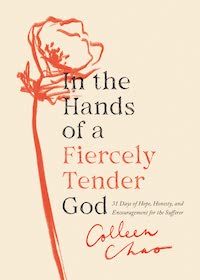 In the Hands of a Fiercely Tender God: 31 Days of Hope, Honesty, and Encouragement for the Sufferer by Colleen Chao. “The life of Colleen Chao was bright and beautiful—it was brimming with hope and possibility. She was a talented, confident, and ambitious young woman. So, Colleen never imagined that she’d swim through two decades of deep-water anxiety and depression. She didn’t guess that she’d marry late, suffer years of chronic pain and illness, and give birth to a child with health complications. And never in her life did she imagine hearing the words: ‘Cancer. Stage four. Terminal.’ In the Hands of a Fiercely Tender God is born of the suffering that on its own could have crushed Colleen. Her pain, instead, opened her eyes to eternal realities and has wrought a soul of indestructible joy. How do we suffer long and well? What do we do when we feel cheated? How do we face pressing darkness? One thing Colleen has learned is that we cannot bear the suffering alone. We need lots of help. To that end, Colleen shares a precious devotional gift with the suffering soul: thirty-one days of wisdom, hope, and encouragement. Drawing upon stories from past saints, rich truths from Scripture, and habits that build joyful endurance, Colleen helps fellow sufferers to embrace one day at a time, to trust and love Jesus more, and put themselves In the Hands of a Fiercely Tender God.” (Buy it from Amazon)
In the Hands of a Fiercely Tender God: 31 Days of Hope, Honesty, and Encouragement for the Sufferer by Colleen Chao. “The life of Colleen Chao was bright and beautiful—it was brimming with hope and possibility. She was a talented, confident, and ambitious young woman. So, Colleen never imagined that she’d swim through two decades of deep-water anxiety and depression. She didn’t guess that she’d marry late, suffer years of chronic pain and illness, and give birth to a child with health complications. And never in her life did she imagine hearing the words: ‘Cancer. Stage four. Terminal.’ In the Hands of a Fiercely Tender God is born of the suffering that on its own could have crushed Colleen. Her pain, instead, opened her eyes to eternal realities and has wrought a soul of indestructible joy. How do we suffer long and well? What do we do when we feel cheated? How do we face pressing darkness? One thing Colleen has learned is that we cannot bear the suffering alone. We need lots of help. To that end, Colleen shares a precious devotional gift with the suffering soul: thirty-one days of wisdom, hope, and encouragement. Drawing upon stories from past saints, rich truths from Scripture, and habits that build joyful endurance, Colleen helps fellow sufferers to embrace one day at a time, to trust and love Jesus more, and put themselves In the Hands of a Fiercely Tender God.” (Buy it from Amazon)
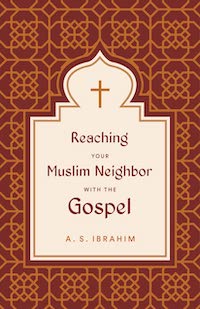 Reaching Your Muslim Neighbor with the Gospel by A. S. Ibrahim. “Muslims are coming to Christ more than ever before, which is why having a robust, Christ-centered foundation for evangelism is essential. However, many Christians know very little about Muslims and their beliefs, which often results in misconceptions and a decreased ability to clearly and effectively proclaim the gospel. In Reaching Your Muslim Neighbor with the Gospel, A. S. Ibrahim seeks to provide readers with insight and practical tips to engage and share the gospel with Muslim friends and neighbors. Ibrahim divides the book into two sections: (1) a Christian understanding of the strands of Islam and the diversity of Muslims, and (2) practical ways for Christians to connect with Muslims and effectively communicate the gospel. This book also incorporates true stories about Muslims coming to Christ and answers common questions.” (Buy it from Amazon or Westminster Books)
Reaching Your Muslim Neighbor with the Gospel by A. S. Ibrahim. “Muslims are coming to Christ more than ever before, which is why having a robust, Christ-centered foundation for evangelism is essential. However, many Christians know very little about Muslims and their beliefs, which often results in misconceptions and a decreased ability to clearly and effectively proclaim the gospel. In Reaching Your Muslim Neighbor with the Gospel, A. S. Ibrahim seeks to provide readers with insight and practical tips to engage and share the gospel with Muslim friends and neighbors. Ibrahim divides the book into two sections: (1) a Christian understanding of the strands of Islam and the diversity of Muslims, and (2) practical ways for Christians to connect with Muslims and effectively communicate the gospel. This book also incorporates true stories about Muslims coming to Christ and answers common questions.” (Buy it from Amazon or Westminster Books)
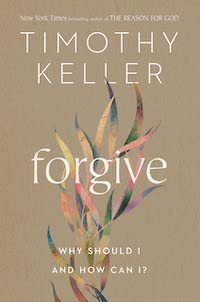 Forgive: Why Should I and How Can I? by Timothy Keller. “Pastor and New York Times bestselling author Timothy Keller outlines the reasons why forgiveness has to be a central part of everyone’s lives. Forgiving anyone in a meaningful way is one of the hardest things a person has to do. If you do not, resentment and vengeance begin to consume you. It is nearly impossible to move past transgression without forgiveness, but few people have the resources and the tools to forgive others fully and move on with their lives. Forgiveness is an essential skill, a moral imperative, and a religious belief that cuts right to the core of what it means to be human. In Forgive, Timothy Keller shows readers why it is so important and how to do it, explaining in detail the steps you need to take in order to move on without sacrificing justice or your humanity.” (Buy it from Amazon or Westminster Books)
Forgive: Why Should I and How Can I? by Timothy Keller. “Pastor and New York Times bestselling author Timothy Keller outlines the reasons why forgiveness has to be a central part of everyone’s lives. Forgiving anyone in a meaningful way is one of the hardest things a person has to do. If you do not, resentment and vengeance begin to consume you. It is nearly impossible to move past transgression without forgiveness, but few people have the resources and the tools to forgive others fully and move on with their lives. Forgiveness is an essential skill, a moral imperative, and a religious belief that cuts right to the core of what it means to be human. In Forgive, Timothy Keller shows readers why it is so important and how to do it, explaining in detail the steps you need to take in order to move on without sacrificing justice or your humanity.” (Buy it from Amazon or Westminster Books)
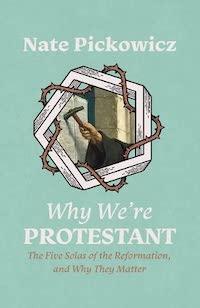 Why We’re Protestant: The Five Solas of the Reformation, and Why They Matter by Nate Pickowicz. Do you remember when Reformed Christians still talked about Reformed theology rather than current issues? This book turns back the clock by returning to some of the key Protestant distinctives. “One of the key questions the Protestant Reformation asked and answered was: how does a person get right with God? In approaching this question, the Reformers set out to rediscover and establish the bounds of essential Christianity through five declarations: sola Scriptura (Scripture alone), sola gratia (grace alone), sola fide (faith alone), solus Christus (Christ alone), and sola Deo gloria (the glory of God alone). Nate Pickowicz’s guide will help us understand not only the Reformation, but the Christian faith itself.” (Buy it from Amazon or Westminster Books)
Why We’re Protestant: The Five Solas of the Reformation, and Why They Matter by Nate Pickowicz. Do you remember when Reformed Christians still talked about Reformed theology rather than current issues? This book turns back the clock by returning to some of the key Protestant distinctives. “One of the key questions the Protestant Reformation asked and answered was: how does a person get right with God? In approaching this question, the Reformers set out to rediscover and establish the bounds of essential Christianity through five declarations: sola Scriptura (Scripture alone), sola gratia (grace alone), sola fide (faith alone), solus Christus (Christ alone), and sola Deo gloria (the glory of God alone). Nate Pickowicz’s guide will help us understand not only the Reformation, but the Christian faith itself.” (Buy it from Amazon or Westminster Books)
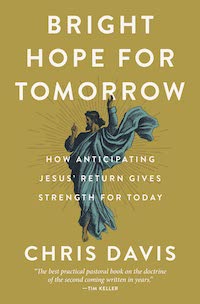 Bright Hope for Tomorrow: How Anticipating Jesus’ Return Gives Strength for Today by Chris Davis. “Hope is fuel. For Jesus’ disciples, the hope of seeing their risen Lord again, face to face, powered their endurance through persecution, their patience in discipling new believers, and their courage to renounce injustice and sinful passions. But have we set aside that fuel because the topic of Jesus’ return is mired in confusion and controversy? Many Christians have lost or overlooked the importance of the Lord’s appearing, resulting in a sluggish, ineffective faith. What if there is a way to recapture spiritual momentum? What if we could tap into the apostles’ longing to simply be in the presence of the resurrected Christ without getting entangled in date-setting or disagreements about the Millennium? And what if this fresh hope could drive our daily responses to temptation, affliction, discouragement, and life in a broken world? In Bright Hope for Tomorrow, pastor Chris Davis points the way forward. Exploring the return of Jesus on the terms of the New Testament letters, this book looks at portraits of Jesus’ appearing, rhythms necessary to maintain expectancy (including gathering, fasting, and resting), and the practical transformation such anticipation effects. Bright Hope for Tomorrow is not the next new thing. Rather, it is a recovery of what has been lost by end-times studies that have veered into peripheral concerns. Join this return to the gospel center: Christ has died, Christ is risen, Christ will come again.” (Buy it from Amazon)
Bright Hope for Tomorrow: How Anticipating Jesus’ Return Gives Strength for Today by Chris Davis. “Hope is fuel. For Jesus’ disciples, the hope of seeing their risen Lord again, face to face, powered their endurance through persecution, their patience in discipling new believers, and their courage to renounce injustice and sinful passions. But have we set aside that fuel because the topic of Jesus’ return is mired in confusion and controversy? Many Christians have lost or overlooked the importance of the Lord’s appearing, resulting in a sluggish, ineffective faith. What if there is a way to recapture spiritual momentum? What if we could tap into the apostles’ longing to simply be in the presence of the resurrected Christ without getting entangled in date-setting or disagreements about the Millennium? And what if this fresh hope could drive our daily responses to temptation, affliction, discouragement, and life in a broken world? In Bright Hope for Tomorrow, pastor Chris Davis points the way forward. Exploring the return of Jesus on the terms of the New Testament letters, this book looks at portraits of Jesus’ appearing, rhythms necessary to maintain expectancy (including gathering, fasting, and resting), and the practical transformation such anticipation effects. Bright Hope for Tomorrow is not the next new thing. Rather, it is a recovery of what has been lost by end-times studies that have veered into peripheral concerns. Join this return to the gospel center: Christ has died, Christ is risen, Christ will come again.” (Buy it from Amazon)
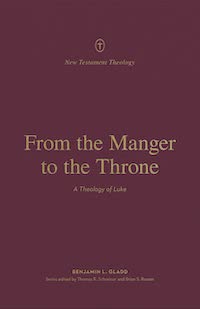 From the Manger to the Throne: A Theology of Luke by Benjamin L. Gladd. This is the most recent volume in the relatively new New Testament Theology series. It still wouldn’t be difficult to read all the existing volumes and catch up with the series before it expands too much! “The Gospel of Luke is a wonderfully detailed account of the ministry and miracles of Jesus Christ. What many readers don’t realize is that Luke, who was likely a Gentile, wrote his Gospel with a thorough knowledge of the Old Testament—pointing to Jesus’s life, ministry, and death as the culmination of Old Testament expectations and prophecy. In this addition to the New Testament Theology series, Benjamin L. Gladd explains the dominant biblical-theological themes in the Gospel of Luke, including the defeat of evil, peace in heaven and earth, the incorporation of the nations, and the kingdom of God. This resource is perfect for those looking to dig deeper into studying the interconnectedness of Scripture.” (Buy it from Amazon or Westminster Books)
From the Manger to the Throne: A Theology of Luke by Benjamin L. Gladd. This is the most recent volume in the relatively new New Testament Theology series. It still wouldn’t be difficult to read all the existing volumes and catch up with the series before it expands too much! “The Gospel of Luke is a wonderfully detailed account of the ministry and miracles of Jesus Christ. What many readers don’t realize is that Luke, who was likely a Gentile, wrote his Gospel with a thorough knowledge of the Old Testament—pointing to Jesus’s life, ministry, and death as the culmination of Old Testament expectations and prophecy. In this addition to the New Testament Theology series, Benjamin L. Gladd explains the dominant biblical-theological themes in the Gospel of Luke, including the defeat of evil, peace in heaven and earth, the incorporation of the nations, and the kingdom of God. This resource is perfect for those looking to dig deeper into studying the interconnectedness of Scripture.” (Buy it from Amazon or Westminster Books)
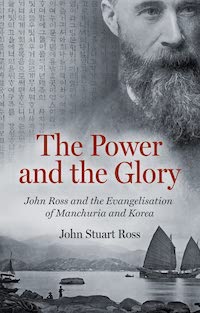 The Power and the Glory: John Ross and the Evangelisation of Manchuria and Korea by John Stuart Ross. “Born in the northeast of Scotland, John Ross arrived in Manchuria in 1872 and spent 40 years of his life there. He left behind an amazing legacy of culturally sensitive evangelism, established presbyterian churches, innovative missionary principles, valuable publications, and a rich vein of translations, including the first version of the New Testament in Korean. John S. Ross’s riveting biography tracks not only his life, but also the social, political and spiritual influences which shaped his life and work. God is still using John Ross’s labours to grow his Kingdom in South and North Korea today.” (Buy it from Amazon or Westminster Books)
The Power and the Glory: John Ross and the Evangelisation of Manchuria and Korea by John Stuart Ross. “Born in the northeast of Scotland, John Ross arrived in Manchuria in 1872 and spent 40 years of his life there. He left behind an amazing legacy of culturally sensitive evangelism, established presbyterian churches, innovative missionary principles, valuable publications, and a rich vein of translations, including the first version of the New Testament in Korean. John S. Ross’s riveting biography tracks not only his life, but also the social, political and spiritual influences which shaped his life and work. God is still using John Ross’s labours to grow his Kingdom in South and North Korea today.” (Buy it from Amazon or Westminster Books)
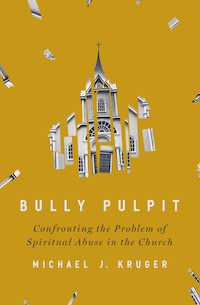 Bully Pulpit: Confronting the Problem of Spiritual Abuse in the Church by Michael Kruger. “Are churches looking for the wrong kind of leaders? The last decade has witnessed a rising number of churches wrecked by spiritual abuse–harsh, heavy-handed, domineering behavior from those in a position of spiritual authority. And high-profile cases are only a small portion of this widespread problem. Behind the scenes are many more cases of spiritual abuse that we will never hear about. Victims suffer in silence, not knowing where to turn. Of course, most pastors and leaders are godly, wonderful people who don’t abuse their sheep. They shepherd their flocks gently and patiently. But we can’t ignore the growing number who do not. We have tolerated and even celebrated the kind of leaders Jesus warned us against. We need gentle shepherds now more than ever, and in Bully Pulpit, seminary president and biblical scholar Michael J. Kruger offers a unique perspective for both church leaders and church members on the problem of spiritual abuse, how to spot it, and how to handle it in the church.” (Buy it from Amazon or Westminster Books)
Bully Pulpit: Confronting the Problem of Spiritual Abuse in the Church by Michael Kruger. “Are churches looking for the wrong kind of leaders? The last decade has witnessed a rising number of churches wrecked by spiritual abuse–harsh, heavy-handed, domineering behavior from those in a position of spiritual authority. And high-profile cases are only a small portion of this widespread problem. Behind the scenes are many more cases of spiritual abuse that we will never hear about. Victims suffer in silence, not knowing where to turn. Of course, most pastors and leaders are godly, wonderful people who don’t abuse their sheep. They shepherd their flocks gently and patiently. But we can’t ignore the growing number who do not. We have tolerated and even celebrated the kind of leaders Jesus warned us against. We need gentle shepherds now more than ever, and in Bully Pulpit, seminary president and biblical scholar Michael J. Kruger offers a unique perspective for both church leaders and church members on the problem of spiritual abuse, how to spot it, and how to handle it in the church.” (Buy it from Amazon or Westminster Books)
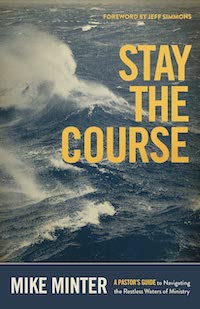 Stay the Course: A Pastor’s Guide to Navigating the Restless Waters of Ministry by Mike Minter. “Pastoral ministry is hard. These days—with pandemics and cultural crises and distrust of the church higher than ever—it may be especially hard. There is a reason an increasing number of pastors are depressed, burned out, leaving the ministry, or—worst of all—imploding their lives through moral failures. Mike Minter planted a church in 1975, and after a long and faithful career in pastoral ministry, he is burdened to see so many struggling pastors. This book is born from both his experience and his concern. His heart is to help younger pastors make it through the ministry intact, and Stay the Course will do just that.” (Buy it from Amazon)
Stay the Course: A Pastor’s Guide to Navigating the Restless Waters of Ministry by Mike Minter. “Pastoral ministry is hard. These days—with pandemics and cultural crises and distrust of the church higher than ever—it may be especially hard. There is a reason an increasing number of pastors are depressed, burned out, leaving the ministry, or—worst of all—imploding their lives through moral failures. Mike Minter planted a church in 1975, and after a long and faithful career in pastoral ministry, he is burdened to see so many struggling pastors. This book is born from both his experience and his concern. His heart is to help younger pastors make it through the ministry intact, and Stay the Course will do just that.” (Buy it from Amazon)
 It can be difficult to know how to tell others about our Christian convictions. It can be difficult to know the best way to tell others about what we believe and why we believe it. And while I am sure this has always been the case, there are new challenges that come with the seismic shifts we’ve seen in Western culture over the past decade or two—shifts that have carried us into what is increasingly obviously a post-Christian West in which our religious convictions are now a social liability far more than an asset. I am often asked for recommendations on books that someone can hand to an unbeliever, a skeptic, or a religious wanderer—books that may help persuade them to come to the Christian faith. I generally recommend Keller’s The Reason for God because of the way he engages intellectually with the modern mind, but now I’m glad to also be able to recommend a newer option: Rory Shiner and Peter Orr’s The World Next Door: A Short Guide to the Christian Faith. This book, they say, “is our best shot at commending the Christian message to our friends. It’s driven by the universal human instinct to increase the joy of finding a good thing by sharing it with others. We both think we’ve found a good thing—the best thing—in finding God through Jesus. We want to share it.” Shiner is a pastor in Perth, Australia while Orr is a Northern Irish professor who now teaches New Testament in Sydney. Shiner was raised in…]]>
It can be difficult to know how to tell others about our Christian convictions. It can be difficult to know the best way to tell others about what we believe and why we believe it. And while I am sure this has always been the case, there are new challenges that come with the seismic shifts we’ve seen in Western culture over the past decade or two—shifts that have carried us into what is increasingly obviously a post-Christian West in which our religious convictions are now a social liability far more than an asset. I am often asked for recommendations on books that someone can hand to an unbeliever, a skeptic, or a religious wanderer—books that may help persuade them to come to the Christian faith. I generally recommend Keller’s The Reason for God because of the way he engages intellectually with the modern mind, but now I’m glad to also be able to recommend a newer option: Rory Shiner and Peter Orr’s The World Next Door: A Short Guide to the Christian Faith. This book, they say, “is our best shot at commending the Christian message to our friends. It’s driven by the universal human instinct to increase the joy of finding a good thing by sharing it with others. We both think we’ve found a good thing—the best thing—in finding God through Jesus. We want to share it.” Shiner is a pastor in Perth, Australia while Orr is a Northern Irish professor who now teaches New Testament in Sydney. Shiner was raised in…]]>
It can be difficult to know how to tell others about our Christian convictions. It can be difficult to know the best way to tell others about what we believe and why we believe it. And while I am sure this has always been the case, there are new challenges that come with the seismic shifts we’ve seen in Western culture over the past decade or two—shifts that have carried us into what is increasingly obviously a post-Christian West in which our religious convictions are now a social liability far more than an asset.
I am often asked for recommendations on books that someone can hand to an unbeliever, a skeptic, or a religious wanderer—books that may help persuade them to come to the Christian faith. I generally recommend Keller’s The Reason for God because of the way he engages intellectually with the modern mind, but now I’m glad to also be able to recommend a newer option: Rory Shiner and Peter Orr’s The World Next Door: A Short Guide to the Christian Faith. This book, they say, “is our best shot at commending the Christian message to our friends. It’s driven by the universal human instinct to increase the joy of finding a good thing by sharing it with others. We both think we’ve found a good thing—the best thing—in finding God through Jesus. We want to share it.”
Shiner is a pastor in Perth, Australia while Orr is a Northern Irish professor who now teaches New Testament in Sydney. Shiner was raised in a Christian home while Peter was not. Yet both have come to the Christian faith and both are now eager to share it with their friends and family members. This book is their best attempt to do so.
They take an interesting angle on an evangelistic work by framing it around the Apostle’s Creed, the most widely accepted summary of Christian truth. This creed “is associated with baptism and the entry of new converts into the faith. We figure the creed will keep us on the straight and narrow, tethering us to an account of the faith that is briskly orthodox and historically grounded…” The creed also allows them to do more than talk about the Christian faith—it forces them to share exactly what its primary claims are. It forces them to deal immediately and unashamedly with matters Christians may shy away from as they talk to unbelievers—God as Creator, Jesus born of a virgin, the triunity of God, and so on.
Where they begin, though, is with demons. Yes, demons. They begin by telling of Jesus’ confrontation with a demon-possessed man, explaining how it opens up an understanding of the unseen world—the world the biblical writers described as existing above and below us. Why would they begin here? “Francis Schaeffer, a Christian thinker from the mid-20th century, apparently used to give his first talk on angels when addressing university students. When asked why, he explained that when he spoke about God and sin, people heard him to be speaking about morality. But when he spoke about angels, people understood he was speaking about spiritual truths. About a bigger reality, about transcendent truths. That’s what we want to talk about, too.”
This is clever, I think, because it immediately confronts the reader with the reality that the Christian faith is not merely a way to live or a system of morality, but something far bigger, far broader, far more all-encompassing. “The Christian faith is less like an object in the world, whose existence is accepted by some and denied by others, and more like a pair of glasses through which you look at the rest of life, the universe, and everything.”
And so they lead the reader through the Creed, phrase by phrase. They discuss the being and nature of God and tell of his creative power; they introduce Jesus as God and man, as incarnated and virgin-born, as crucified and buried, as resurrected, reigning, and returning; they tell of the Holy Spirit and his ongoing work in this world. In other words, they lead the reader through the most essential claims of Christianity.
While I am obviously not a skeptic of the faith, and while I have not yet had opportunity to hand this book to one, I do believe its approach is helpful and will prove effective. I admire the authors for not running away from even the most offensive of Christianity’s claims and from its most difficult doctrines. I admire them for wanting to share their own enthusiasm for the God who has met them and saved them. And I admire them for remaining engaging and winsome all the while. “Christianity’s explanatory power, bracing beauty, and sheer otherness are some of the best things about it. It ends up making our modern, secular, materialistic Western view of life look a bit, well, dull. There are all sorts of good reasons to become a Christian, some of them very serious. But one of the more surprising reasons is that being a Christian is actually really interesting and, in its own way, fun.” I couldn’t agree more and it’s my hope that many people read The World Next Door and come to embrace the faith it describes.
]]> A friend recently asked if I could help him figure out what to do with all the quotes and highlights he has collected over the years. As a pastor and author he reads a lot and as he reads he highlights and underlines passages while sometimes jotting down notes in the margins. Yet he’s not sure what to do with these highlights, how to remember them, and how to make them useful. For his sake I wrote out the system I use and thought I’d share it here. While I’ll freely admit it’s a bit geeky, it has served me very well for quite a long time now. Two Components This system has two components. The first component depends upon a service called ReadWise and the second upon Roam Research. Many people will not need both, but will find ReadWise sufficient for their purposes. For that reason, I will begin there. ReadWise According to ReadWise, the service “makes it easy to revisit and learn from your ebook & article highlights.” It also makes it easy to learn from your printed book and other highlights. It collects those highlights and then routinely prompts you to review them. ❖ Begin by visiting ReadWise and creating an account. You’ll qualify for a free 30-day trial to try it out. You should not need to add your credit card details until after that time, should you choose to keep using it. Once you have created your account, your first task will be getting some of your stuff into their…]]>
A friend recently asked if I could help him figure out what to do with all the quotes and highlights he has collected over the years. As a pastor and author he reads a lot and as he reads he highlights and underlines passages while sometimes jotting down notes in the margins. Yet he’s not sure what to do with these highlights, how to remember them, and how to make them useful. For his sake I wrote out the system I use and thought I’d share it here. While I’ll freely admit it’s a bit geeky, it has served me very well for quite a long time now. Two Components This system has two components. The first component depends upon a service called ReadWise and the second upon Roam Research. Many people will not need both, but will find ReadWise sufficient for their purposes. For that reason, I will begin there. ReadWise According to ReadWise, the service “makes it easy to revisit and learn from your ebook & article highlights.” It also makes it easy to learn from your printed book and other highlights. It collects those highlights and then routinely prompts you to review them. ❖ Begin by visiting ReadWise and creating an account. You’ll qualify for a free 30-day trial to try it out. You should not need to add your credit card details until after that time, should you choose to keep using it. Once you have created your account, your first task will be getting some of your stuff into their…]]>
A friend recently asked if I could help him figure out what to do with all the quotes and highlights he has collected over the years. As a pastor and author he reads a lot and as he reads he highlights and underlines passages while sometimes jotting down notes in the margins. Yet he’s not sure what to do with these highlights, how to remember them, and how to make them useful. For his sake I wrote out the system I use and thought I’d share it here. While I’ll freely admit it’s a bit geeky, it has served me very well for quite a long time now.
Two Components
This system has two components.
- The first component collects my highlights, stores them, and regularly brings them to my attention. This helps me with retention (as I read the highlights that have been resurfaced), with creativity (as I search for and find highlights) and with inspiration (as I serendipitously encounter those highlights on a regular basis).
- The second component also stores my highlights but additionally allows me to powerfully search them and to explore complex relationships between them.
The first component depends upon a service called ReadWise and the second upon Roam Research.
Many people will not need both, but will find ReadWise sufficient for their purposes. For that reason, I will begin there.
ReadWise
According to ReadWise, the service “makes it easy to revisit and learn from your ebook & article highlights.” It also makes it easy to learn from your printed book and other highlights. It collects those highlights and then routinely prompts you to review them.
❖
Begin by visiting ReadWise and creating an account. You’ll qualify for a free 30-day trial to try it out. You should not need to add your credit card details until after that time, should you choose to keep using it.
Once you have created your account, your first task will be getting some of your stuff into their system. After registering for an account it should immediately take you to the Import Highlights page. If it doesn’t, go to the “Connect & Sync” tab at the top of the screen and choose “Import Highlights.” You will see a long list of different ways to get content into ReadWise, and they are broken into two main categories: “Connect & Sync” and “Import & Upload.”
- The options listed under “Connect & Sync” are automated ways of getting content into the system (e.g. as you create highlights on your Kindle or as you create highlights in articles you have saved to Pocket, they are automatically imported into ReadWise).
- The options listed under “Import & Upload” are manual ways of getting content into the system (e.g. after reading a paperback edition of a book, you manually type your notes and highlights into ReadWise).
- Note: some of the automated options require you to do the setup procedure using Chrome for your browser rather than Safari or others.
❖
Let’s get some content into ReadWise.
If you read via a Kindle device, tap on the Kindle option. You will be prompted to install a browser extension, then to login to your Amazon account using your Amazon credentials. ReadWise will take a few minutes to go through your books, then tell you that it has sent you your first newsletter. In theory, you should now have an email in your inbox that contains 5 random highlights from your Kindle books. This is what ReadWise refers to as your “Daily Review.” From this point forward, ReadWise will continue to automatically import your Kindle highlights on a daily basis and send you a Daily Review email.
If you do not read via a Kindle device, you will need to import highlights another way. What I would suggest is beginning with “Freeform Input” which you’ll find under “Import & Upload.” You will be prompted to create a new book by adding a title and author. After you do that, you’ll be prompted to add a new highlight from that book and, optionally, to include a page number and your own notes. So simply type in a bunch of highlights from that book, one after another—at least 6 or 8 to start. You can repeat this for as many highlights as you would like to include. When you are done, click on the “ReadWise” header to get back to the “Import Highlights” page. It will prompt you to add some Supplemental Books. This is a way of importing the most popular highlights from various books. ReadWise will want you to select at least three. When you hit “continue” it will tell you that it has sent you your first newsletter. In theory, you should now have an email in your inbox that contains 5 random highlights from the books you imported. This is what ReadWise refers to as your “Daily Review.” It will be sent to you each day.
❖
Okay, so that has gotten ReadWise configured in the most basic way. What I would suggest now is continuing to add highlights to it since its power will grow with the volume of information you add to it. You’ll need to decide whether you want it to contain highlights from books alone or also highlights from articles and/or podcasts and/or Twitter. Additionally, you’ll need to decide whether you want to keep those Supplemental Books that you may have added before (which is to say, whether you want other people’s highlights in your system or only your own—I initially suggest not using Supplemental Books which means you’ll need to erase any you added earlier). Here are some ideas to try:
- Download the ReadWise app to your phone and try its scanning feature on a book you have read in a physical format. It should be able to scan those highlights directly into ReadWise.
- If you have only imported Kindle highlights, try importing some manual highlights from a book you have read in a physical format. Do this through the Freeform Input button or, as in the last bullet, through the app’s scanning functionality.
- If you have highlights in PDF documents, use the PDF button to upload them and extract the highlights. (It would be good to read the help document to understand the limitations on this method.)
- If you use Logos, try exporting your notes into a format that can be imported into ReadWise. (It used to be straightforward to export Logos notes into a CSV file, but this appears to have been removed in version 10.0. You could perhaps try exporting it into an RTF file and then converting that to a CSV or copying and pasting them into a spreadsheet. Alternatively, you can do it via the methods in either of the first two bullets. Also, upvote this feature request.)
❖
For what it’s worth, I only use ReadWise to import highlights from books I have read. I don’t care to know what other people deem important in books and don’t use the service to save highlights from articles and other media.
❖
If you are going to use only ReadWise, you may want to consider adding tags to all or some of your highlights. This will add some taxonomy to them and help you navigate between them (so, for example, you can pull up a list of all of the highlights tagged “prayer” or “marriage”). Tags will be especially important if they are for words that don’t actually appear in the quote but still represent its content (such as a quote about marriage that doesn’t actually contain the word “marriage.”). If you plan to also use Roam Research, this step may be redundant.
❖
If you are going to import lots of notes from physical books, it may be best to add them into a CSV file and then import that file. This could prove a better method than adding them through Freeform Input. So play with the options to see which suits you best. You can find sample CSV files here.
❖
After you have added a fair bit of content, try searching using the search icon at the top of the page. This will search all of your highlights for whatever keyword you type. You’ll notice the search is helpfully “fuzzy” so that, for example, a search for “duty” will also turn up results for “duties” and “dutiful.”
❖
You may want to tweak your Daily Review. To do that, click on the Account icon in the top right and select “Configure Reviews.” Here you can choose how many highlights you receive per day and tweak a few other settings. Frequency Tuning is especially important as it allows you to set how often different books will show up in your highlights—from very often to not at all. You’ll want to adjust these settings to suit your purposes, and especially to turn off books that you have read but don’t care to remember or encounter again.
❖
Adding highlights manually is simple and effective—but the system is at its absolute best with Kindle highlights, since they get added automatically and in the background. The deeper you get into this system, the more you may find yourself wanting to read via Kindle simply to gain that functionality.
❖
You can try the Mastery function to see if it appeals. It is meant to help you with retention by using the spaced repetition technique.
❖
ReadWise seems to be a stable app but, like every other service, there is always the risk that it will shut down some day. Thankfully they make it very easy to export your data, so you shouldn’t have to worry too much about losing it permanently.
❖
Before we move on, let’s consider what you’ve accomplished so far and what benefits you’ve gained.
- You now have an electronic home for all your highlights.
- You now have a way to search across all of your highlights.
- You will now have a selection of highlights sent to you each day to help you with retention and creativity.
- You may have highlights being regularly and automatically fed into your system (e.g. if you synced with your Kindle).
Roam Research
The second component of my system is Roam Research which is described as “a note-taking tool for networked thought.” It is essentially a tool for personal knowledge management that allows you to enter, organize, and then re-discover information. In that way it is kind of like a “second brain.” It uses a non-hierarchical method of relating notes to one another in which its “bi-directional links” create relationships between related pieces of knowledge. It’s kind of hard to describe, but once you see it and understand it, you can’t help but be impressed by it.
If ReadWise is the tool that imports highlights, stores them, and regularly resurfaces them, Roam is the tool that stores them, allows you to relate them to one another, and to work with them. There is some duplication between the two services, but each still has its own distinct purpose in my system. The two play very nicely together because ReadWise can automatically export all of its highlights to Roam Research.
You may want to try Roam Research if:
- you want to do more than just store and remember highlights, but also to work with them and integrate them into articles, books, and sermons.
- you want to also be able to search across your own writing—articles, books, sermons, and notes.
- you want to be able to look for complex relationships between ideas you have imported into Roam Research or added manually.
If that sounds interesting, then read on.
❖
Visit Roam Research and click “Sign Up.” You will be prompted to either create a new account or to login with your existing Google account. You will need to enter your payment information, but will not be charged until after a 31-day trial period. Set a reminder on your calendar to cancel in 30 days, just in case. (“Hey Siri, remind me in 30 days at 9 AM to cancel Roam Research.”)
You will begin at a Daily Notes page. This is a place for you to make, well, daily notes. But where I would begin is with importing your ReadWise highlights. Go back to ReadWise and to “Connect & Sync,” but this time to the “Export Highlights” option. You will see many options for getting your information out of ReadWise and into other applications. Click on the Roam button. You’ll need to use either Chrome or Firefox for this and add the ReadWise browser extension. Simply follow the process and, soon enough, you should see all of your highlights appear in Roam Research. It may take a few minutes, so be patient.
❖
Now you will want to “tag” your highlights by one of the two methods Roam provides. Select a book in Roam Research and scroll through the highlights. Find a word you’d consider especially important. Double click on it and tap the left bracket key ([) twice; you will now see something like this: [[marriage]]. This has turned that word into a link. If one of your highlights has an idea but not doesn’t contain the specific word (e.g. a quote about marriage that doesn’t contain the word “marriage”), click at the end of the highlight and type the number sign followed by the word in this format: #marriage. This creates the very same kind of link but using a different marriage. Try to create links like that for as many of your highlights as possible. Now when you click on the word “marriage” it will take you to a page that contains all of the links that contain the word.
❖
You can also highlight particularly interesting highlights. To do that, select the text and tap cmd+h (Mac) or ctrl+h (Windows). This is useful as you skim through your content later on as it makes key information stand out.
❖
Once you are on one of the pages for your keywords, scroll to the bottom and look for the words “Unlinked References.” Click the little triangle beside it. This will now show you all of the highlights in which that word appears but has not yet been tagged. You can tap the “Link” button to automatically tag them. This is a great way of finding references to what word that you would have otherwise missed.
❖
You can always click the question mark icon at the top right of the page to see help menus. Visit this tutorial page to get a little deeper into the system. You will also benefit from searching for tutorials on YouTube and elsewhere. There are tons of good resources for using Roam. It is much like Logos in that even if you only learn some of the basic functions and never become a true power user, it may still make a huge difference in your life.
❖
Roam, like ReadWise, works best when you commit to it and use it over the long-term. A half commitment will get half results. It is not for everyone, but if you are interested, make sure you at least give it a good go. That means continuing to import highlights through ReadWise while also adding content directly into Roam. You can conduct your research in Roam as well, actually using it as your writing app.
❖
Now, when you are doing research and want to pull up information about a subject, go to Roam and use the search button at the top. Type your keyword. Then begin to explore those bi-directional links to see where they take you. On any page, go to the … icon at the top and select Open Graph View to see where your keyword is used and what other concepts it relates to. Continue to explore the software and learn how powerful it is.
❖
If you don’t want to pay for Roam, you can take a look at Obsidian which is very similar, except that it is free in its basic form and resides on your local computer rather than on someone else’s server.
❖
And that’s that. I’d suggest you commit to the system for a few days or a few weeks and see if it can serve you. I have been using it for years and benefiting from it tremendously. I look forward to receiving my Daily Review every morning and always keep a Roam tab open so I can add information or search it at any time. So give it a shot and let me know how it works for you…
]]> October has been quite a month when it comes to releases of Christian books. I sorted through the huge stacks that came my way to arrive at this list of 10 new and especially noteworthy picks. In each case I have provided the editorial description so you can have a bit of information about it. I hope there’s something here that catches your eye! The Existence and Attributes of God (Volumes 1 & 2) Updated and Unabridged by Stephen Charnock, edited by Mark Jones. “This two-volume set, edited by Mark Jones, contains an updated and unabridged edition of Charnock’s classic work, Discourses upon the Existence and Attributes of God, written to instruct and encourage Christian pastors, theologians, and laypeople. Jones precedes each discourse with an introductory summary that explains Charnock’s general approach. In this clear, modernized presentation of this classic work, readers will experience his skillful exegesis, his influential way with words, his insight into human nature, his concern with the practical implications of who God is, and his Christ-focused approach to theology.” (Buy it from Amazon or Westminster Books) Embracing Complementarianism: Turning Biblical Convictions into Positive Church Culture by Jane Tooher & Graham Beynon. “It can be tempting to shy away from addressing the issue of gender roles in church because it’s often controversial. But this can result in churches either being increasingly influenced by secular culture or simply sticking with the status quo when it comes to what men and women do in church. Building on the belief that complementarianism is both biblical…]]>
October has been quite a month when it comes to releases of Christian books. I sorted through the huge stacks that came my way to arrive at this list of 10 new and especially noteworthy picks. In each case I have provided the editorial description so you can have a bit of information about it. I hope there’s something here that catches your eye! The Existence and Attributes of God (Volumes 1 & 2) Updated and Unabridged by Stephen Charnock, edited by Mark Jones. “This two-volume set, edited by Mark Jones, contains an updated and unabridged edition of Charnock’s classic work, Discourses upon the Existence and Attributes of God, written to instruct and encourage Christian pastors, theologians, and laypeople. Jones precedes each discourse with an introductory summary that explains Charnock’s general approach. In this clear, modernized presentation of this classic work, readers will experience his skillful exegesis, his influential way with words, his insight into human nature, his concern with the practical implications of who God is, and his Christ-focused approach to theology.” (Buy it from Amazon or Westminster Books) Embracing Complementarianism: Turning Biblical Convictions into Positive Church Culture by Jane Tooher & Graham Beynon. “It can be tempting to shy away from addressing the issue of gender roles in church because it’s often controversial. But this can result in churches either being increasingly influenced by secular culture or simply sticking with the status quo when it comes to what men and women do in church. Building on the belief that complementarianism is both biblical…]]>
October has been quite a month when it comes to releases of Christian books. I sorted through the huge stacks that came my way to arrive at this list of 10 new and especially noteworthy picks. In each case I have provided the editorial description so you can have a bit of information about it. I hope there’s something here that catches your eye!
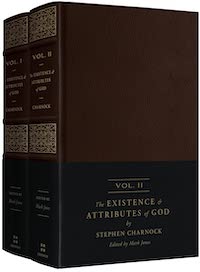 The Existence and Attributes of God (Volumes 1 & 2) Updated and Unabridged by Stephen Charnock, edited by Mark Jones. “This two-volume set, edited by Mark Jones, contains an updated and unabridged edition of Charnock’s classic work, Discourses upon the Existence and Attributes of God, written to instruct and encourage Christian pastors, theologians, and laypeople. Jones precedes each discourse with an introductory summary that explains Charnock’s general approach. In this clear, modernized presentation of this classic work, readers will experience his skillful exegesis, his influential way with words, his insight into human nature, his concern with the practical implications of who God is, and his Christ-focused approach to theology.” (Buy it from Amazon or Westminster Books)
The Existence and Attributes of God (Volumes 1 & 2) Updated and Unabridged by Stephen Charnock, edited by Mark Jones. “This two-volume set, edited by Mark Jones, contains an updated and unabridged edition of Charnock’s classic work, Discourses upon the Existence and Attributes of God, written to instruct and encourage Christian pastors, theologians, and laypeople. Jones precedes each discourse with an introductory summary that explains Charnock’s general approach. In this clear, modernized presentation of this classic work, readers will experience his skillful exegesis, his influential way with words, his insight into human nature, his concern with the practical implications of who God is, and his Christ-focused approach to theology.” (Buy it from Amazon or Westminster Books)
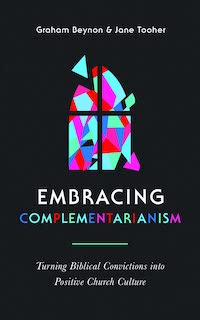 Embracing Complementarianism: Turning Biblical Convictions into Positive Church Culture by Jane Tooher & Graham Beynon. “It can be tempting to shy away from addressing the issue of gender roles in church because it’s often controversial. But this can result in churches either being increasingly influenced by secular culture or simply sticking with the status quo when it comes to what men and women do in church. Building on the belief that complementarianism is both biblical and positive, this book focuses on what these convictions look like in practice. Moving beyond the familiar discussions around ‘gender roles,’ and leaving room for variety in how readers implement these ideas, it will encourage a church culture where men and women truly partner together—embracing their privileges and responsibilities, and maximizing their gifts, in joyful service of God’s kingdom.” (Buy it from Amazon)
Embracing Complementarianism: Turning Biblical Convictions into Positive Church Culture by Jane Tooher & Graham Beynon. “It can be tempting to shy away from addressing the issue of gender roles in church because it’s often controversial. But this can result in churches either being increasingly influenced by secular culture or simply sticking with the status quo when it comes to what men and women do in church. Building on the belief that complementarianism is both biblical and positive, this book focuses on what these convictions look like in practice. Moving beyond the familiar discussions around ‘gender roles,’ and leaving room for variety in how readers implement these ideas, it will encourage a church culture where men and women truly partner together—embracing their privileges and responsibilities, and maximizing their gifts, in joyful service of God’s kingdom.” (Buy it from Amazon)
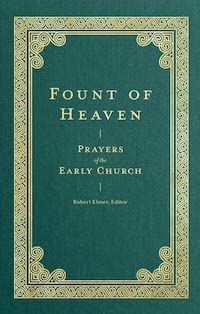 Fount of Heaven: Prayers of the Early Church (Prayers of the Church) by Elmer, Robert (editor). “The hearts of the first Christians beat with praise for Christ. The strength of their devotion is remarkable, considering the times of uncertainty and persecution in which they lived. Despite all of this, the early church flourished, sustained by the God to whom they prayed. Christians today have a lot to learn from the devotional life of the early church. In Fount of Heaven, a collection of carefully selected prayers from the first six centuries of the church, we can pray with our spiritual forefathers. Prayers from luminaries such as Clement of Rome, Irenaeus, and Augustine are arranged by theme to reveal the right prayer for the moment. The prayers have been slightly updated to read more easily, but they retain their joy and mystery. As we turn to the prayers of the first Christians, we can return to the foundations of our own faith.” (Buy it from Amazon or Westminster Books)
Fount of Heaven: Prayers of the Early Church (Prayers of the Church) by Elmer, Robert (editor). “The hearts of the first Christians beat with praise for Christ. The strength of their devotion is remarkable, considering the times of uncertainty and persecution in which they lived. Despite all of this, the early church flourished, sustained by the God to whom they prayed. Christians today have a lot to learn from the devotional life of the early church. In Fount of Heaven, a collection of carefully selected prayers from the first six centuries of the church, we can pray with our spiritual forefathers. Prayers from luminaries such as Clement of Rome, Irenaeus, and Augustine are arranged by theme to reveal the right prayer for the moment. The prayers have been slightly updated to read more easily, but they retain their joy and mystery. As we turn to the prayers of the first Christians, we can return to the foundations of our own faith.” (Buy it from Amazon or Westminster Books)
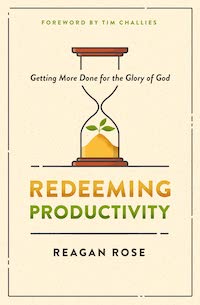 Redeeming Productivity: Getting More Done for the Glory of God by Reagan Rose. “What image forms in your mind when you think of productivity? An assembly line? Spreadsheets? Business suits or workplace uniforms? In the ancient world, productivity didn’t conjure images like these. Instead, it referred to crop yield and fruit bearing. This agrarian imagery helps us understand productivity through a biblical lens. Jesus taught, By this my Father is glorified, that you bear much fruit (John 15:8). Who doesn’t want to have a truly productive life—to bear much fruit? But how does this happen in the places we hold dear—the home, workplace, and in our communities? We often feel overworked and overrun, defeated and discouraged. The world says be productive so that you can get all you can out of this life. The Bible says be productive so you can gain more of the next life. In Redeeming Productivity, author Reagan Rose explores how God’s glory is the purpose for which He planted us. And he shows how productivity must be firmly rooted in the gospel. Only through our connection to Christ—the True Vine—are we empowered to produce good fruit. This book shows how we can maintain the vitality of that connection through simple, life-giving disciplines. Readers will discover manageable applications like giving God the first fruits of our days. Additionally, Reagan discusses how our perspective on suffering is transformed as we see trials as God’s pruning for greater productivity.” (Buy it from Amazon)
Redeeming Productivity: Getting More Done for the Glory of God by Reagan Rose. “What image forms in your mind when you think of productivity? An assembly line? Spreadsheets? Business suits or workplace uniforms? In the ancient world, productivity didn’t conjure images like these. Instead, it referred to crop yield and fruit bearing. This agrarian imagery helps us understand productivity through a biblical lens. Jesus taught, By this my Father is glorified, that you bear much fruit (John 15:8). Who doesn’t want to have a truly productive life—to bear much fruit? But how does this happen in the places we hold dear—the home, workplace, and in our communities? We often feel overworked and overrun, defeated and discouraged. The world says be productive so that you can get all you can out of this life. The Bible says be productive so you can gain more of the next life. In Redeeming Productivity, author Reagan Rose explores how God’s glory is the purpose for which He planted us. And he shows how productivity must be firmly rooted in the gospel. Only through our connection to Christ—the True Vine—are we empowered to produce good fruit. This book shows how we can maintain the vitality of that connection through simple, life-giving disciplines. Readers will discover manageable applications like giving God the first fruits of our days. Additionally, Reagan discusses how our perspective on suffering is transformed as we see trials as God’s pruning for greater productivity.” (Buy it from Amazon)
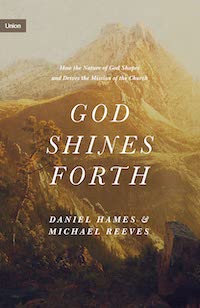 God Shines Forth: How the Nature of God Shapes and Drives the Mission of the Church by Daniel Hames and Michael Reeves. “Evangelism and missions are parts of the Christian life often accompanied by fears, insecurities, and cultural pressures. In this addition to the Union series, Daniel Hames and Michael Reeves argue that an individual’s relationship with God influences their evangelism and missions more than anything else. To illustrate how knowledge of God influences evangelism and missions, Hames and Reeves address biblical themes such as the glory of God, Christ’s sacrifice, the fallenness of man, and the church’s future hope. There is hope for those who find these topics intimidating—when believers focus on the glory of the lamb of God, the gospel will shine through them.” (Buy it from Amazon or Westminster Books)
God Shines Forth: How the Nature of God Shapes and Drives the Mission of the Church by Daniel Hames and Michael Reeves. “Evangelism and missions are parts of the Christian life often accompanied by fears, insecurities, and cultural pressures. In this addition to the Union series, Daniel Hames and Michael Reeves argue that an individual’s relationship with God influences their evangelism and missions more than anything else. To illustrate how knowledge of God influences evangelism and missions, Hames and Reeves address biblical themes such as the glory of God, Christ’s sacrifice, the fallenness of man, and the church’s future hope. There is hope for those who find these topics intimidating—when believers focus on the glory of the lamb of God, the gospel will shine through them.” (Buy it from Amazon or Westminster Books)
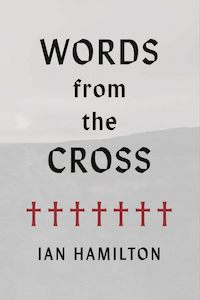 Words from the Cross by Ian Hamilton. “Paul’s words in Galatians 6:14, ‘Far be it for me to boast except in the cross of our Lord Jesus Christ,’ highlight how central and personally significant the cross of Christ is to Christians. Jesus himself saw the cross as his divinely appointed destiny. As he began to experience the unimaginable agony that lay before him, he said, ‘Now is my soul troubled. And what shall I say? “Father, save me from this hour”? But for this purpose I have come to this hour’ (John 12:27). In Words from the Cross Ian Hamilton places Jesus’ seven expiring words of grace and hope in their wider biblical context and explores their theological, pastoral, and evangelistic significance. The short chapters encourage us to reflect and meditate on the love of God which is ‘the fountainhead of the gospel’ (John Owen) and bring us to devote all we are to the Saviour who gave his all for us.” (Buy it from Banner of Truth)
Words from the Cross by Ian Hamilton. “Paul’s words in Galatians 6:14, ‘Far be it for me to boast except in the cross of our Lord Jesus Christ,’ highlight how central and personally significant the cross of Christ is to Christians. Jesus himself saw the cross as his divinely appointed destiny. As he began to experience the unimaginable agony that lay before him, he said, ‘Now is my soul troubled. And what shall I say? “Father, save me from this hour”? But for this purpose I have come to this hour’ (John 12:27). In Words from the Cross Ian Hamilton places Jesus’ seven expiring words of grace and hope in their wider biblical context and explores their theological, pastoral, and evangelistic significance. The short chapters encourage us to reflect and meditate on the love of God which is ‘the fountainhead of the gospel’ (John Owen) and bring us to devote all we are to the Saviour who gave his all for us.” (Buy it from Banner of Truth)
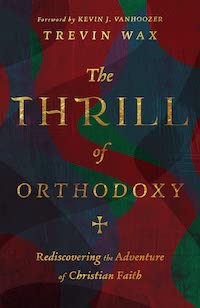 The Thrill of Orthodoxy: Rediscovering the Adventure of Christian Faith by Trevin Wax. “Every generation faces the temptation to wander from orthodoxy–to seek out the jolt that comes with false teaching, and to drift with cultural currents. And so every generation must be awakened again to the thrill of orthodoxy, and experience the astonishment that comes from stumbling afresh upon the electrifying paradoxes at the heart of the Christian faith. In The Thrill of Orthodoxy, Trevin Wax turns the tables on those who believe Christian teaching is narrow and outdated. Returning to the church’s creeds, he explains what orthodoxy is and why we can have proper confidence in it, and lays out common ways we can stray from it. By showing how heresies are always actually narrower than orthodoxy–taking one aspect of the truth and wielding it as a weapon against others–Wax beckons us away from the broad road that ultimately proves bland and boring, and toward the straight and narrow path, where true adventure can be found.” (Buy it from Amazon or Westminster Books)
The Thrill of Orthodoxy: Rediscovering the Adventure of Christian Faith by Trevin Wax. “Every generation faces the temptation to wander from orthodoxy–to seek out the jolt that comes with false teaching, and to drift with cultural currents. And so every generation must be awakened again to the thrill of orthodoxy, and experience the astonishment that comes from stumbling afresh upon the electrifying paradoxes at the heart of the Christian faith. In The Thrill of Orthodoxy, Trevin Wax turns the tables on those who believe Christian teaching is narrow and outdated. Returning to the church’s creeds, he explains what orthodoxy is and why we can have proper confidence in it, and lays out common ways we can stray from it. By showing how heresies are always actually narrower than orthodoxy–taking one aspect of the truth and wielding it as a weapon against others–Wax beckons us away from the broad road that ultimately proves bland and boring, and toward the straight and narrow path, where true adventure can be found.” (Buy it from Amazon or Westminster Books)
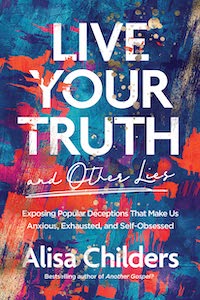 Live Your Truth and Other Lies: Exposing Popular Deceptions That Make Us Anxious, Exhausted, and Self-Obsessed by Alisa Childers. “Are you tired of feeling like you have to check social media to find out what you’re supposed to think? Are you weary of the latest self-help books that promise to set you free but only imprison you with laundry lists of studies to consider, positive affirmations to recite, and Facebook groups to join? We’ve all seen the memes that populate the internet: live your truth, follow your heart, you only have one life to live. They sound nice and positive. But what if these slogans are actually lies that unhinge us from reality and leave us anxious and exhausted? Another Gospel? author Alisa Childers invites you to examine modern lies that are disguised as truths in today’s culture. Everyday messages of peace, fulfillment, and empowerment swirl around social media. On the surface, they seem like sentiments of freedom and hope, but in reality they are deeply deceptive.” (Buy it from Amazon)
Live Your Truth and Other Lies: Exposing Popular Deceptions That Make Us Anxious, Exhausted, and Self-Obsessed by Alisa Childers. “Are you tired of feeling like you have to check social media to find out what you’re supposed to think? Are you weary of the latest self-help books that promise to set you free but only imprison you with laundry lists of studies to consider, positive affirmations to recite, and Facebook groups to join? We’ve all seen the memes that populate the internet: live your truth, follow your heart, you only have one life to live. They sound nice and positive. But what if these slogans are actually lies that unhinge us from reality and leave us anxious and exhausted? Another Gospel? author Alisa Childers invites you to examine modern lies that are disguised as truths in today’s culture. Everyday messages of peace, fulfillment, and empowerment swirl around social media. On the surface, they seem like sentiments of freedom and hope, but in reality they are deeply deceptive.” (Buy it from Amazon)
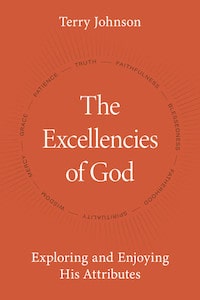 The Excellencies of God: Exploring and Enjoying His Attributes by Terry Johnson. “God’s attributes is the most practical of subjects, inspiring and shaping the entire Christian life. Contemplating who God is and what He has promised to do can bring great comfort to the most despairing soul. Moreover, it brings immense delight to all those who recognize their chief end as the glory and enjoyment of God. In The Excellencies of God, Terry L. Johnson explores several aspects of the divine character and shows how they play a crucial role in our Christian experience. May God’s mercy and grace, His patience and wisdom, His truth and faithfulness, His spirituality and blessedness prove to be a blessing to all who peruse these pages.” (Buy it from Amazon or Westminster Books)
The Excellencies of God: Exploring and Enjoying His Attributes by Terry Johnson. “God’s attributes is the most practical of subjects, inspiring and shaping the entire Christian life. Contemplating who God is and what He has promised to do can bring great comfort to the most despairing soul. Moreover, it brings immense delight to all those who recognize their chief end as the glory and enjoyment of God. In The Excellencies of God, Terry L. Johnson explores several aspects of the divine character and shows how they play a crucial role in our Christian experience. May God’s mercy and grace, His patience and wisdom, His truth and faithfulness, His spirituality and blessedness prove to be a blessing to all who peruse these pages.” (Buy it from Amazon or Westminster Books)
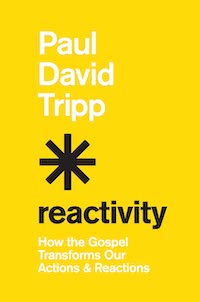 Reactivity: How the Gospel Transforms Our Actions and Reactions by Paul David Tripp. “Digital media and technology are altering the way people act—and react—toward each other. Criticism, outrage, and controversy dominate social engagement and unfortunately many Christians have joined in the chaos. Award-winning author Paul David Tripp instructs believers to view digital media and technology through the lens of the gospel and points them toward a biblical framework for communication. Explaining how God wants the church to engage with culture and each other, Tripp encourages Christians to think wisely about their interactions and be a beacon of light in an age of toxicity.” (Buy it from Amazon or Westminster Books)
Reactivity: How the Gospel Transforms Our Actions and Reactions by Paul David Tripp. “Digital media and technology are altering the way people act—and react—toward each other. Criticism, outrage, and controversy dominate social engagement and unfortunately many Christians have joined in the chaos. Award-winning author Paul David Tripp instructs believers to view digital media and technology through the lens of the gospel and points them toward a biblical framework for communication. Explaining how God wants the church to engage with culture and each other, Tripp encourages Christians to think wisely about their interactions and be a beacon of light in an age of toxicity.” (Buy it from Amazon or Westminster Books)
 This time of year is usually a very good one for book releases as publishers attempt to make sure their top titles are available for the holiday shopping season. Here are some of my picks for New and Notable books from September (including a handful from August since I didn’t provide a roundup last month). In each case I’ve provided the publisher’s description of the book. Church History by Simonetta Carr. “Church History is a fascinating guide that shows young readers (and even not-so-young readers) how God has preserved His church from AD 30 to the beginning of the twenty-first century. Travel through time and all over the world as you meet the people, learn about the ideas, and understand the challenges that have shaped the history of the church. Maps, time lines, and colorful pictures on every page show you the important people, places, and events of church history. Learn about how Christianity spread to Armenia, the first official Christian nation; how a paper nailed to a church door in Germany marked the beginning of the Protestant Reformation; how the church has grown in places like Asia, Latin America, and Africa. Discover how the church has answered important questions like Is Jesus really God? Can we be perfect in this life? May Christians allow slavery? and What is the gospel? Most importantly, you will see that after two thousand years, Jesus’s church is still growing and proclaiming the good news of salvation for sinners all over the world.” (Buy it at Amazon or Westminster…]]>
This time of year is usually a very good one for book releases as publishers attempt to make sure their top titles are available for the holiday shopping season. Here are some of my picks for New and Notable books from September (including a handful from August since I didn’t provide a roundup last month). In each case I’ve provided the publisher’s description of the book. Church History by Simonetta Carr. “Church History is a fascinating guide that shows young readers (and even not-so-young readers) how God has preserved His church from AD 30 to the beginning of the twenty-first century. Travel through time and all over the world as you meet the people, learn about the ideas, and understand the challenges that have shaped the history of the church. Maps, time lines, and colorful pictures on every page show you the important people, places, and events of church history. Learn about how Christianity spread to Armenia, the first official Christian nation; how a paper nailed to a church door in Germany marked the beginning of the Protestant Reformation; how the church has grown in places like Asia, Latin America, and Africa. Discover how the church has answered important questions like Is Jesus really God? Can we be perfect in this life? May Christians allow slavery? and What is the gospel? Most importantly, you will see that after two thousand years, Jesus’s church is still growing and proclaiming the good news of salvation for sinners all over the world.” (Buy it at Amazon or Westminster…]]>
This time of year is usually a very good one for book releases as publishers attempt to make sure their top titles are available for the holiday shopping season. Here are some of my picks for New and Notable books from September (including a handful from August since I didn’t provide a roundup last month). In each case I’ve provided the publisher’s description of the book.
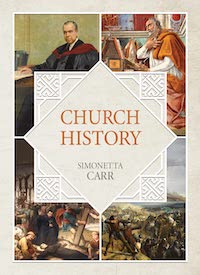 Church History by Simonetta Carr. “Church History is a fascinating guide that shows young readers (and even not-so-young readers) how God has preserved His church from AD 30 to the beginning of the twenty-first century. Travel through time and all over the world as you meet the people, learn about the ideas, and understand the challenges that have shaped the history of the church. Maps, time lines, and colorful pictures on every page show you the important people, places, and events of church history. Learn about how Christianity spread to Armenia, the first official Christian nation; how a paper nailed to a church door in Germany marked the beginning of the Protestant Reformation; how the church has grown in places like Asia, Latin America, and Africa. Discover how the church has answered important questions like Is Jesus really God? Can we be perfect in this life? May Christians allow slavery? and What is the gospel? Most importantly, you will see that after two thousand years, Jesus’s church is still growing and proclaiming the good news of salvation for sinners all over the world.” (Buy it at Amazon or Westminster Books)
Church History by Simonetta Carr. “Church History is a fascinating guide that shows young readers (and even not-so-young readers) how God has preserved His church from AD 30 to the beginning of the twenty-first century. Travel through time and all over the world as you meet the people, learn about the ideas, and understand the challenges that have shaped the history of the church. Maps, time lines, and colorful pictures on every page show you the important people, places, and events of church history. Learn about how Christianity spread to Armenia, the first official Christian nation; how a paper nailed to a church door in Germany marked the beginning of the Protestant Reformation; how the church has grown in places like Asia, Latin America, and Africa. Discover how the church has answered important questions like Is Jesus really God? Can we be perfect in this life? May Christians allow slavery? and What is the gospel? Most importantly, you will see that after two thousand years, Jesus’s church is still growing and proclaiming the good news of salvation for sinners all over the world.” (Buy it at Amazon or Westminster Books)
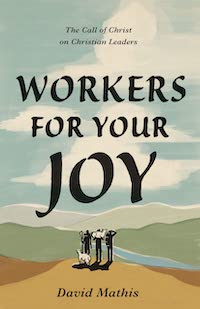 Workers for Your Joy: The Call of Christ on Christian Leaders by David Mathis. “We live in an age increasingly cynical about leadership—some of it for good reason, much of it simply the mood of our times. Still, the risen Christ continues the counter-cultural work he’s done for two millennia: he appoints leaders in his church—not as a burden, but as a gift to his people. What is the nature, calling, and work of local church leadership? Pastor and seminary professor David Mathis considers the elder qualifications in 1 Timothy 3 and Titus 1 not only as prerequisites but as daily necessities to carry out joyfully. This accessible guide aims to serve current and aspiring pastors and elders, as well as church members who want to know the expectations for their leaders and how to pray for them.” (Buy it at Amazon or Westminster Books)
Workers for Your Joy: The Call of Christ on Christian Leaders by David Mathis. “We live in an age increasingly cynical about leadership—some of it for good reason, much of it simply the mood of our times. Still, the risen Christ continues the counter-cultural work he’s done for two millennia: he appoints leaders in his church—not as a burden, but as a gift to his people. What is the nature, calling, and work of local church leadership? Pastor and seminary professor David Mathis considers the elder qualifications in 1 Timothy 3 and Titus 1 not only as prerequisites but as daily necessities to carry out joyfully. This accessible guide aims to serve current and aspiring pastors and elders, as well as church members who want to know the expectations for their leaders and how to pray for them.” (Buy it at Amazon or Westminster Books)
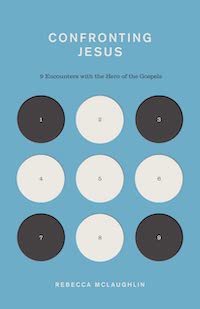 Confronting Jesus: 9 Encounters with the Hero of the Gospels by Rebecca McLaughlin. “Jesus is the most famous human being in all of history. But while many people have a basic sketch of Jesus in their minds, comparatively few have taken time to read the four biographies of his life in the New Testament Gospels of Matthew, Mark, Luke, and John. In Confronting Jesus, Rebecca McLaughlin shares important biblical context to help all readers see why the Gospels should be taken seriously as historical documents. This follow-up to her first book, Confronting Christianity, helps readers understand the message of the Gospels and explore who Jesus really is. Individuals and groups can work through the book together with the Confronting Jesus Study Guide and the Confronting Jesus Video Study.” (Buy it at Amazon or Westminster Books)
Confronting Jesus: 9 Encounters with the Hero of the Gospels by Rebecca McLaughlin. “Jesus is the most famous human being in all of history. But while many people have a basic sketch of Jesus in their minds, comparatively few have taken time to read the four biographies of his life in the New Testament Gospels of Matthew, Mark, Luke, and John. In Confronting Jesus, Rebecca McLaughlin shares important biblical context to help all readers see why the Gospels should be taken seriously as historical documents. This follow-up to her first book, Confronting Christianity, helps readers understand the message of the Gospels and explore who Jesus really is. Individuals and groups can work through the book together with the Confronting Jesus Study Guide and the Confronting Jesus Video Study.” (Buy it at Amazon or Westminster Books)
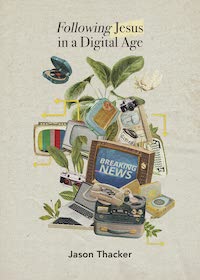 Following Jesus in a Digital Age by Jason Thacker. “We were told technology would make our lives easier and more convenient, but technology just seems to have made it more complicated and confusing. As Christians, what does our faith have to do with these pressing issues of life in a digital age? In Following Jesus in a Digital Age, you will not only be challenged on how technology is shaping your walk with Christ, but you will also be equipped with biblical wisdom to navigate the most difficult aspects of our digital culture—including the rise of misinformation, conspiracy theories, social media, digital privacy, and polarization. God calls his people to step into the challenges of the digital age from a place of hope and discernment, grounded in His Word. How will you follow Him in the digital age?” (Buy it at Amazon or Westminster Books)
Following Jesus in a Digital Age by Jason Thacker. “We were told technology would make our lives easier and more convenient, but technology just seems to have made it more complicated and confusing. As Christians, what does our faith have to do with these pressing issues of life in a digital age? In Following Jesus in a Digital Age, you will not only be challenged on how technology is shaping your walk with Christ, but you will also be equipped with biblical wisdom to navigate the most difficult aspects of our digital culture—including the rise of misinformation, conspiracy theories, social media, digital privacy, and polarization. God calls his people to step into the challenges of the digital age from a place of hope and discernment, grounded in His Word. How will you follow Him in the digital age?” (Buy it at Amazon or Westminster Books)
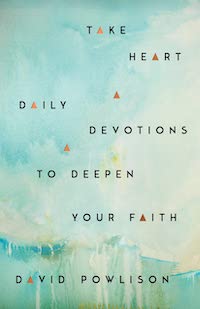 Take Heart: Daily Devotions to Deepen Your Faith by David Powlison. “It’s easy to lose heart in a world where many things can and do go wrong. Life is difficult and there are struggles within and without, but we can take heart–the Lord is with us. He hears our cries for mercy. He knows our every need. He guides us, helps us, and strengthens us with his mighty right arm. Journey through a year with David Powlison, learning to take heart by meditating on his favorite Scripture passages, hymns, and biblical themes, exploring the ways God meets us with daily grace right where we live. Drawn from David Powlison’s many decades of writing, teaching, and speaking, Take Heart is a yearlong devotional journey into the process of biblical change, where truth becomes clearer and our ears hear and our eyes see what God tells us about himself.” (Buy it at Amazon or Westminster Books)
Take Heart: Daily Devotions to Deepen Your Faith by David Powlison. “It’s easy to lose heart in a world where many things can and do go wrong. Life is difficult and there are struggles within and without, but we can take heart–the Lord is with us. He hears our cries for mercy. He knows our every need. He guides us, helps us, and strengthens us with his mighty right arm. Journey through a year with David Powlison, learning to take heart by meditating on his favorite Scripture passages, hymns, and biblical themes, exploring the ways God meets us with daily grace right where we live. Drawn from David Powlison’s many decades of writing, teaching, and speaking, Take Heart is a yearlong devotional journey into the process of biblical change, where truth becomes clearer and our ears hear and our eyes see what God tells us about himself.” (Buy it at Amazon or Westminster Books)
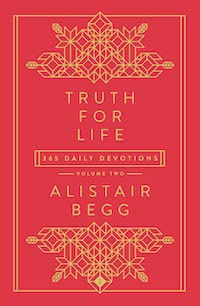 Truth for Life: 365 Daily Devotions (Volume 2) by Alistair Begg. This is the second (and, to my knowledge, final) volume of Alistair Begg’s excellent daily devotions. “Start with the gospel each and every day with this second volume of 365 Christ-centered daily devotions from renowned Bible teacher Alistair Begg. Each daily devotion includes: reflections from renowned Bible teacher Alistair Begg; prompts for real-life application; relevant Scripture passages; a yearly Bible-reading plan. The durable hardback cover with dust jacket and ribbon marker make this a wonderful gift.” (Buy it at Amazon or Westminster Books)
Truth for Life: 365 Daily Devotions (Volume 2) by Alistair Begg. This is the second (and, to my knowledge, final) volume of Alistair Begg’s excellent daily devotions. “Start with the gospel each and every day with this second volume of 365 Christ-centered daily devotions from renowned Bible teacher Alistair Begg. Each daily devotion includes: reflections from renowned Bible teacher Alistair Begg; prompts for real-life application; relevant Scripture passages; a yearly Bible-reading plan. The durable hardback cover with dust jacket and ribbon marker make this a wonderful gift.” (Buy it at Amazon or Westminster Books)
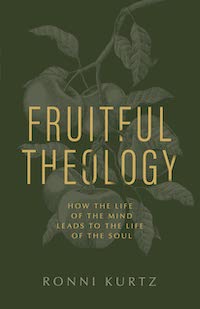 Fruitful Theology: How the Life of the Mind Leads to the Life of the Soul by Ronni Kurtz. “Why do the theologians rage? Even a cursory scrolling of social media may lead you to the conclusion that you have to be angry to do theology. Sadly, our day is characterized by theological fighting–complete with harsh words, exaggeration, biting sarcasm, and the spirit of tearing down our brothers and sisters in Christ. But it does not have to be this way. In fact, it should not be this way. In Fruitful Theology, Ronni Kurtz swims upstream to counter this prevailing problem. Instead of theology leading to anger, division, and discord, this book shows that the life of the mind can actually lead to the fruit of the Spirit.” (Buy it at Amazon or Westminster Books)
Fruitful Theology: How the Life of the Mind Leads to the Life of the Soul by Ronni Kurtz. “Why do the theologians rage? Even a cursory scrolling of social media may lead you to the conclusion that you have to be angry to do theology. Sadly, our day is characterized by theological fighting–complete with harsh words, exaggeration, biting sarcasm, and the spirit of tearing down our brothers and sisters in Christ. But it does not have to be this way. In fact, it should not be this way. In Fruitful Theology, Ronni Kurtz swims upstream to counter this prevailing problem. Instead of theology leading to anger, division, and discord, this book shows that the life of the mind can actually lead to the fruit of the Spirit.” (Buy it at Amazon or Westminster Books)
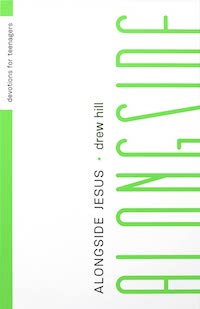 Alongside Jesus: Devotions for Teenagers by Drew Hill. “Have you ever considered that Jesus could actually be walking alongside you? Like right now, in this very moment–even though you can’t see him. If you knew that for sure, how would it change your day? Your life? Because you can’t see or hear Jesus with your physical eyes and ears, walking with him takes a different kind of seeing and hearing. And as you learn to walk with him, your faith will grow, and your life will never be the same. Through a month of meditations, Drew Hill invites you to look for Jesus with the eyes of your heart and learn to hear his voice. As you encounter Jesus, you will begin to see yourself through his eyes. The Alongside Devotional uses a daily devotional format, and each chapter takes a look at a different truth about Jesus and invites you to establish an Alongside Practice that will help solidify this truth in your heart. Each week includes a weekend conversation with your Alongsider–a parent, mentor, or friend who can help you process what you’re reading. These encounters with Jesus will help you see that Jesus is closer than anyone else could ever be.” (Buy it at Amazon or Westminster Books)
Alongside Jesus: Devotions for Teenagers by Drew Hill. “Have you ever considered that Jesus could actually be walking alongside you? Like right now, in this very moment–even though you can’t see him. If you knew that for sure, how would it change your day? Your life? Because you can’t see or hear Jesus with your physical eyes and ears, walking with him takes a different kind of seeing and hearing. And as you learn to walk with him, your faith will grow, and your life will never be the same. Through a month of meditations, Drew Hill invites you to look for Jesus with the eyes of your heart and learn to hear his voice. As you encounter Jesus, you will begin to see yourself through his eyes. The Alongside Devotional uses a daily devotional format, and each chapter takes a look at a different truth about Jesus and invites you to establish an Alongside Practice that will help solidify this truth in your heart. Each week includes a weekend conversation with your Alongsider–a parent, mentor, or friend who can help you process what you’re reading. These encounters with Jesus will help you see that Jesus is closer than anyone else could ever be.” (Buy it at Amazon or Westminster Books)
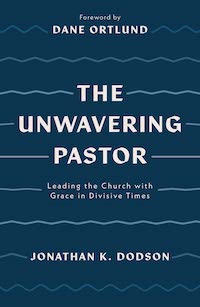 The Unwavering Pastor: Leading the Church with Grace in Divisive Times by Jonathan Dodson. “Leadership is hard. Pastoring through divisive times is even harder. How do we lead well when criticized? How do we keep loving the church when hurt by her? What does it look like to remain committed to the gospel in cultural division? Seasoned pastor Jonathan Dodson comes alongside struggling pastors and ministry leaders to guide them into the comfort of Christ. But he doesn’t stop there. Full of wisdom drawn from 2 Timothy, this book will equip you to lead the church with grace, charity and spiritual power through divisive times. Great for pastors and ministry leaders who need encouragement and insight, or are wrestling with their calling. Makes a thoughtful gift.” (Buy it at Amazon or Westminster Books)
The Unwavering Pastor: Leading the Church with Grace in Divisive Times by Jonathan Dodson. “Leadership is hard. Pastoring through divisive times is even harder. How do we lead well when criticized? How do we keep loving the church when hurt by her? What does it look like to remain committed to the gospel in cultural division? Seasoned pastor Jonathan Dodson comes alongside struggling pastors and ministry leaders to guide them into the comfort of Christ. But he doesn’t stop there. Full of wisdom drawn from 2 Timothy, this book will equip you to lead the church with grace, charity and spiritual power through divisive times. Great for pastors and ministry leaders who need encouragement and insight, or are wrestling with their calling. Makes a thoughtful gift.” (Buy it at Amazon or Westminster Books)
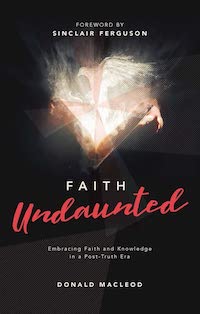 Faith Undaunted: Embracing Faith and Knowledge in a Post-Truth Era by Donald MacLeod. “Christian faith is a matter for the emotions, but also a matter for the intellect. Donald MacLeod delves into not only what he believes, but why he believes, and how that belief affects how he lives his life. Arguing for the importance of reason and logic in personal faith, he equips the reader to resist relativist influences that are permeating the twenty-first-century church. Winsomely written, Professor MacLeod shows once again why he is a beloved teacher and writer.” (Buy it at Amazon or Westminster Books)
Faith Undaunted: Embracing Faith and Knowledge in a Post-Truth Era by Donald MacLeod. “Christian faith is a matter for the emotions, but also a matter for the intellect. Donald MacLeod delves into not only what he believes, but why he believes, and how that belief affects how he lives his life. Arguing for the importance of reason and logic in personal faith, he equips the reader to resist relativist influences that are permeating the twenty-first-century church. Winsomely written, Professor MacLeod shows once again why he is a beloved teacher and writer.” (Buy it at Amazon or Westminster Books)
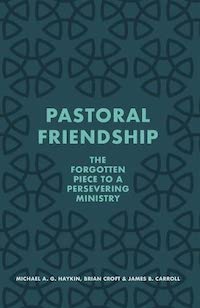 Pastoral Friendship: The Forgotten Piece in a Persevering Ministry by Brian Croft, Michael Haykin, and James Carroll. “Friendship is a need that touches the deepest parts of the human soul. This is especially true in ministry. It is a need that is not simply rooted in enjoyment and companionship, but in the necessity to care well of one’s soul and survive a long-term ministry. This book seeks to persuade every modern pastor of the essential need of friendship. And not just any friendship, but a close, personal, intimate, and sacrificial pastor-to-pastor friendship that regularly turns each other’s gaze to Jesus. Friends and pastors, Michael Haykin, Brian Croft and James Carroll examine portraits of friendship in scripture and church history, before exhorting readers to modern pastoral friendships.” (Buy it at Amazon or Westminster Books)
Pastoral Friendship: The Forgotten Piece in a Persevering Ministry by Brian Croft, Michael Haykin, and James Carroll. “Friendship is a need that touches the deepest parts of the human soul. This is especially true in ministry. It is a need that is not simply rooted in enjoyment and companionship, but in the necessity to care well of one’s soul and survive a long-term ministry. This book seeks to persuade every modern pastor of the essential need of friendship. And not just any friendship, but a close, personal, intimate, and sacrificial pastor-to-pastor friendship that regularly turns each other’s gaze to Jesus. Friends and pastors, Michael Haykin, Brian Croft and James Carroll examine portraits of friendship in scripture and church history, before exhorting readers to modern pastoral friendships.” (Buy it at Amazon or Westminster Books)
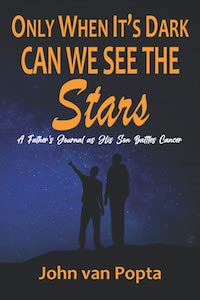 Only When It’s Dark Can We See the Stars: A Father’s Journal as His Son Battles Cancer by John van Popta. John is a dear friend to my family and, in this book, he traces his son’s long illness. “Four Long Years: That’s the time from 12-year-old Julian’s diagnosis of leukemia until the van Popta family reaches the other side. All the while, dad kept a log chronicling in detail the arduous ordeal. Is there hope in the pitch-dark Valley of Baca? With his journal, you can travel with these pilgrims on their journey. Since John is sharing his entries with extended family, friends and church members, you hear him reporting and reflecting as a pastor. He had encountered similar situations before, but such experience counts for little compared to facing cancer of a loved one firsthand. So you also sense how a father’s heart aches as his son suffers. And how he wrestles with wounded faith.” (Buy it at Amazon)
Only When It’s Dark Can We See the Stars: A Father’s Journal as His Son Battles Cancer by John van Popta. John is a dear friend to my family and, in this book, he traces his son’s long illness. “Four Long Years: That’s the time from 12-year-old Julian’s diagnosis of leukemia until the van Popta family reaches the other side. All the while, dad kept a log chronicling in detail the arduous ordeal. Is there hope in the pitch-dark Valley of Baca? With his journal, you can travel with these pilgrims on their journey. Since John is sharing his entries with extended family, friends and church members, you hear him reporting and reflecting as a pastor. He had encountered similar situations before, but such experience counts for little compared to facing cancer of a loved one firsthand. So you also sense how a father’s heart aches as his son suffers. And how he wrestles with wounded faith.” (Buy it at Amazon)